#i may be approaching this from a very black and white trauma point of view idk
Text
@theheartofthe118 ive been thinking a lot about chimney's relationship w his dad since im doing my pre-season 7 rewatch and u know? I am actually lying on the floor screaming crying pouding my fists because the writers keep pushing the "you should love and forgive ur family because there ur family" and like. Ok i can see them pushing that narrative with buck. I can see that they want to send the message that forgiving family is hard but possible.
But then mid season 3 when albert runs away from seoul and chimney confronts his dad about it he LITERALLY says he only has 1 son. No acknowledgement of Chim whatsoever. That's as good as a disownment. Clearly he wanted and wants nothing to do with Chim.
Maddie (? I think) was the one who convinced him because of Jee, but it makes me a bit sick that Maddie pushed so hard to "fix" their relationship even though it was so clear that neither of them wanted that.
Im trying to rlly put into clear words why this irks me? Because theres good and bad elements obviously. Forgiving family can be good, etc etc. But i think it's really attached to the fact that I was in Buck's exact place with parents who were good people but not good parents.
But i think maybe for me it's what do specifically Chim and Buck get out of this? Basically harassment. And the ONLY reason Chim's dad decided to stay and try was because of Jee. Not because of Chim, or interest in him, or the life that he built but because he gave him a grandchild.
It's like he has this picture of his family in his head with his ex wife, his new wife, albert, and Jee Yun, and Chimney is just like a black scribble on every picture. Why the hell should chimney forgive years and years, a lifetime full of neglect and STRAIGHT UP DISOWNMENT because Maddie thinks family is "important"
#i also only grew up with one set of grandparents#never knew my mom's grandparents#i tagged u in this maddie because it was too long for an ask#and i want to hear ur thoughts on possibly where u agree or disagree? if ur up to it#i may be approaching this from a very black and white trauma point of view idk#i just watched this last night and my heart hurt so bad for chim#im also not bashing maddie in this#i disagree w her choices BUT i can see where she was coming from#i am allowed to love a character and not agree with everything they do 🧍♂️ (for the haters)#ALSO THIS IS A CHIM LOVE POST. Anti Chim's dad post
8 notes
·
View notes
Note
How do you deal with all the hate directed towards Elvis? He wasn’t a saint but some people are so intense for their hatred for him online that it kinda takes the run out of being a fan :/
hi anon! okay, so the first thing i'm going to do is link you to my love tam's @headfullofpresley reply to this question because she recently answered it very well and more succinctly than what i'm about to write.
i am not on the clock app, which is where i gather a lot of this is coming from? but i know the breakdown of that hate comes in three basic forms - 1. COMPLETELY false and easily disprovable accusations of racism that have somehow spread over the internet for years. (there are countless sources to dispel this, this touches on a mere few.) this has somehow entwined itself with the idea that he "stole" music, which is categorically untrue, and while absolutely there is a factor there regarding the fact that he could succeed differently due to being a handsome white man in a still segregated and tumultuous time, his music and his melding of gospel and r&b was never malicious, it was inspired by absolute love. he also actively supported charities, including black and jewish organizations. his generosity and kindness wasn't limited or biased at all. 2. people victimizing priscilla as if she isn't allowed to speak for herself and tell her own story, one in which she has never claimed that and i don't personally believe anyone else has the right to decide that for someone. (which @bcofl0ve has addressed well here and here). 3. really upsetting and damaging ableism that has persisted in many ways since his death, where people make certain insinuations and judgments about his health and choices with disdain rather than any understanding. this is a problem in that it tends to demonize addiction and weight and other issues rather than approaching that sympathetically.
moreover, i do believe it's a real problem with current social media that we expect sainthood from anyone. demanding unimpeachable behavior and strict nearly puritanical morality from anyone is never going to be attainable. the legendary music, the various iconography and images aside, at the core of it all, he was a person. people have faults and flaws, they make mistakes, everyone is affected by whatever trauma and grief and struggles they may face, and the pressures of that intense, and quite unprecedented when elvis' star rose, level of fame are unimaginable. was he perfect? absolutely not. but being perfect isn't the same as being good. and when you delve into his life and his beliefs, his feelings about other people and reaching out to them, his connection to his music (be it rock and roll, gospel, or anything in between), the way he searched often for meaning, how he had that desire to extend kindnesses to others and to make others happy...there's so much, and the accounts from those who knew and loved him paint a picture of someone who certainly was fallible, but was undoubtedly good. and i think that's an important distinction to make - perfection simply isn't real. human beings are never one thing - we're fragile and resilient and angry and loving and impulsive and kind, and that's never one facet at a time, it's all at once. if you can only look at someone from a judgmental, "this is problematic!," point of view, you're frankly NEVER going to be able to interact compassionately or genuinely. if you look at someone and define them by their mistakes and condemn that without nuance (and you know what i mean by this, obviously we are not speaking of unforgivable actions here), you're never going to be able to embrace the full person, but it also limits understanding and compassion for anyone. i just feel it's vital to look at the entire tapestry of who someone is, and the full measure of their light and heart.
and then i'm just going to reiterate what tam said - haters (of anything) are miserable and tend to be misinformed and thrive on that mean-spiritedness, and that's so antithetical to how i interact with things i love that i don't have time for it and don't think it deserves energy. if something makes you happy, please don't let outside noise steal that! we know and can easily explore what was inherent to his heart and soul. we can hear the beauty and innovation and joy in his music. if that's providing you a sense of comfort and happiness and fun, that's what matters most. if someone doesn't get it, that's their problem. you are always allowed to love things. 💗💗💗
33 notes
·
View notes
Text
If You Come Softly Review
If You Come Softly by Jacqueline Woodson
CW: Death, Child Death, Police Shooting, Gun Violence, Racism, Discussion of Cheating, Discussion of Divorce, Trauma from Child Abandonment, Discussion of Child Abandonment, Tension Between Parents and Children, Discussion of Homophobia, Anxiety, Grief
4.5/5
This is the sort of book that schools should be including in their English curriculums. I would assign it to Middle or High School students. Somehow this book that should be considered a classic has gone under the radar. If You Come Softly by Jacqueline Woodson was published in 1998, but it is still very relevant today. It discusses race, religion, divorce, interracial relationships, difficult family relationships, and more. The book is poetic, approachable, and serious. I'm unsure how I've managed to go over 20 years without previously discovering it.
Based in Manhattan and Brooklyn, New York, this novella is about Ellie and 'Miah, two teens that are inexplicably drawn to each other. After a meet-cute in the halls of their prep-school, neither one can stop thinking of the other. At first they worry if they should be together because he's black and she's Jewish, but as months go by, they change each other's worlds forever.
Woodson is a black queer woman, a poetess, a mother, and a writer with many works under her belt. She is not Jewish, however. While I loved the choice for Ellie to be Jewish, her representation felt surface-level. She has a Star of David necklace, her hair is the stereotypical dark curls of white Jewish people, and holidays like Yom Kippur are mentioned, but I didn't get a good grasp on Ellie's relationship to her Judaism. Woodson did not negatively portray the religion nor did she include anything harmful, but I do wish she had done more with it.
The book is told in chapters that alternate between Ellie's and 'Miah's points of view. This is one of the things that makes the book into the should-be-classic that it is. Both kids have gone through a lot in their lives and are very rich (literally and figuratively) characters. 'Miah is the son of two successful artists, he's traveled the world, he's also witnessed his parents getting divorced, and he suffered from the death of his grandmother. Ellie comes from a large family and lives near Central Park, but she's been abandoned by her mother more than once and she rarely sees the rest of her family. Together 'Miah and Ellie face racism and what it can do to the love they share.
Anyone can likely guess the ending within the first few pages of the book, but I'm not going to spoil it, just in case. As I said before, this book is still very relevant today. There's light and dark to it. The reader will likely find themself pulled into the love story of 'Miah and Ellie and then wishing desperately for more time with the two of them. Despite my usual aversion to meet-cutes for not being realistic, this story feels very real and raw throughout. It doesn't shy away from trauma, the realities of racism and white privilege, or complicated family dynamics.
If you have never read or heard of this book, please put it on your list. It's short, powerful, and beautifully written. If you audiobook it, you may get a Forward by Woodson too. Have your tissues ready and give this a go. The only thing you'll regret is how little we've moved forward in society.
#bookblogger#book blog#jewish books#black characters#queer author#jacqueline woodson#if you come softly#new york#1990s#teen romance#tragedy#grief stories#jewish characters#audiobooks#novellas#meet cute#police shooting
0 notes
Note
hello hello, i see your requests are open now and can i request izana, wakasa, chifuyu and kazutora with an akutagawa!s/o? hope you have a great day/noon/night! ✨🤗
hi anon! sure! I will try my best with izana and wakasa since there's not tons to work with personality wise so forgive me if theirs are a little shorter heh. im gonna include a little blurb from the bsd fandom wiki for anyone not familiar with his character! I like these kinds of headcanon requests so if anyone wants to see more please feel free to request!
"Akutagawa has a black and white "survival of the fittest" view of the world, claiming that weak people should die and give way to the stronger ones. He is not afraid of pain and defeat His ruthless, vicious nature makes him one of the Port Mafia's most dangerous members, feared by both ally and foe. As violent as he is, Akutagawa maintains a generally composed and detached approach. Towards subordinates and superiors alike, he acts aloof, distancing himself from social interactions however possible. Nonetheless, his composure is fragile. Akutagawa is quick to lash out, ridiculing him for risking the bounty by acting recklessly. This quick temper often gets in his way, fuelling his actions to the core of his very being."
SUMMARY: izana, wakasa, chifuyu, && kazutora with an akutagawa!so
CW: hints of toxicity and violence, mentions of sex but not really all that nsfw-ish so otherwise not much else!
IZANA
- this is an interesting one because from what we know about izana, he is very similar in personality to akutagawa in terms of ruthlessness that stems from childhood trauma and isolation.
- in the case of a s/o with this personality, I think it would be a troubling relationship. lots of bitter fights fuelled by nothing but an inability to express vulnerability, while leaving both of you torn up inside and begging for someone to nurture the trauma and allow space for emotions.
- that being said, with toxicity and trauma also comes intense passion and desire. this relationship brings a lot of fire both in the bedroom and outside of the bedroom, with simple arguments often spawning into intense desperate (and lengthy might I add) sex. like, intense. it's almost like sex is the only safe outlet of these pent up emotions, providing a sort of comfort and also distraction for both parties.
- however as I said in general, this is definitely a toxic relationship. one where neither can help the other when it comes to growth and improvement on a personal level. it's unhealthy and enabling, but for a short lived fling it is hot as fuck im not even gonna lie. lots of hate sex too.
WAKASA
- so wakasa is another interesting one alongside izana given the lack of information and content we have about his character so please excuse the slight kc fanon version I have in my head of wakasa lol
- wakasa has a "don't fuck with me because I do not fucking care" type of vibe to him. I definitely think he's the type to completely disengage from the type of behaviours an akutagawa-type s/o might display. this leads to sort of a sense of competitiveness in trying to get some kind of reaction from him, and it has the potential (much like izana) to become toxic in nature
- any attempts to get under his skin are failed attempts, and the way he looks at you with that half bored expression is something that only triggers more of a somewhat emotional response from you.
- with that being said, my fanon version of wakasa is someone who while cold and aloof, is also quite a rational person. he's been typed by the fandom as INTJ which is quite a quick thinker, and I think he probably (despite not showing it very well) has a soft spot for you. but your passion and intensity (as well as your easily triggered dynamic) keeps him from completely being able to express this care in any way other than not engaging with your antics
- as much as there are some similarities with the type of toxicity in this relationship with both wakasa and izana, the intense passion isn't quite the same as it is with izana. instead, feelings of passion are more to the point and driven by pure instinct and desire rather than toxic passion. wakasa seeming like a very literal person, is actually quite mysterious deep down and has a lot (I mean a lot) of hidden desires and kinks that begin to emerge with time. it's rarely a conversation, and more often just something that happens that surprises you. you just have to go with the flow here, and let him take the reigns for once. it might actually be a good opportunity to allow for vulnerability to take the spotlight for once, which is something wakasa is surprisingly in tune with and quite to the point about.
CHIFUYU
- this is something much healthier than the last two. chifuyu, being an enfp is someone that's able to handle this level of intensity in a person while still being able to understand what's really going on.
- call him the trauma counsellor king. he values each and every response to a trigger that you might have. he notices patterns, he makes mental notes of things, and he does this all without making it seem like he's analyzing.
- to be honest he actually loves the spunk you bring on a day to day level. even though most of the time it's driven by bitterness or hate (not always towards him just in general) he is still able to see beyond that and appreciate you for what you are.
- with that being said, chifuyu will not stand for any toxic behaviour towards him. no sir he will not. threats and pushes for fights wont be tolerated, and he will either disengage or try to expose your vulnerabilities in an attempt at forced submission. this can be hard to get used to, especially with having a personality characterized by the inability to accept being vulnerable. but with time chifuyu is one to create a safe space for you to allow yourself to feel emotions beyond anger and resentment, and he encourages this.
- because of this very feelings based approach, intimacy with chifuyu is just that: intimate. he's extremely loving and doting, hoping that his sweetness can rub off on you a little bit. however he's also very accepting of your need for power over him (especially during sex) and will absolutely submit to your needs in order to please you.
- he really likes to put you in a place of pleasure though, so however that may come to you chifuyu is the one to deliver it.
KAZUTORA
- oh boy. this one is a doozy. listen. if we're talking about timeskip kazutora (as is the case with all characters i write about but I feel it especially important to remind ppl of here given his history), we're talking about someone who is quite literally walking on eggshells in terms of his trauma and emotional vulnerability.
- he's pretty good at being emotionally aware of his needs and struggles as well as the needs and struggles of those around him, but that doesn't mean that he's entirely healed or capable of managing toxicity or his triggers. he still slips up from time to time especially when things get hard, and sometimes finds himself falling into his old patterns. after all, he's only human. but this is where things could get messy in a relationship.
- for the most part, like I said, he's pretty good. so let's focus on that part first since I want to give him credit where it's due. he is very desperate for love and dedicated to providing something to his partner. in this case, he will seek to tap into his emotional vulnerability to provide some sort of comfort for you. he wants to see you happy, and calm, because he sees so much of his old self in you that it gets to him sometimes. but at the same time, he struggles with your relentlessness and can become emotionally drained when things get tough. he'll beat himself up for not being good enough to help you, and this is when he'll isolate and fall into old patterns.
- however, akutagawa's personality type isn't all bad. with a s/o like akutagawa, comes an immense amount of protection and loyalty for their loved ones no matter how tough things might be. in this case it might be hard to communicate this, but there will be times when it's needed in order for kazutora to restrain from old habits and ways of dealing with hardships. but he wants to share his healing with you, he wants you to be happy, and more than anything he understands the struggle of wanting to be happy and healthy but being afraid of losing the one thing that makes you you: your attitude and relentlessness. nobody understands this better than kazutora, which is why things between you can get frustrating and very personal for him.
- much like chifuyu, sex is driven towards pleasing you and only you. chifuyu leans more into switch territory however, while kazutora is 100% submissive. in this case it works out well, however he has a lot of boundaries and limitations when it comes to the way in which you function. he doesn't like degradation. instead, he thrives from praise and any sign of love and care. this might be tough for you to execute 100% of the time, but when it comes down to it the way his eyes twinkle for you is enough to make the ice around your heart melt just a little more each time.
#please I really like these#they're fun and pretty stress free to do lol#especially when kazu is involved#izana x reader#wakasa x reader#izana smut#wakasa smut#izana headcanons#wakasa headcanons#tokyo revengers headcanons#tokyorev headcanons#tokyo rev headcanons#tokyo revengers hcs#tokyorev hcs#tokyo revengers#tokyo rev smut#tokyo rev x reader#tokyo revengers smut#tokyorev smut#tokyorev x reader#tokyo revengers x reader
158 notes
·
View notes
Note
genuinely so confused with people who hate show!darklng. show!darkling is as much of a part of oppressed minority as book!darkling is but with even more 'validation' for his purpose, and i see people still hate show!him saying "oh but he is very bad in book" but then i see them rooting for book m*l LIKE HOWWW [i do kinda understand with those who dislike book!darkling but im still as baffled when when they root for book m*l]
ah, the good old darkling vs mal debate, lol.
in all honesty, i think whether someone prefers mal or the darkling when they watch/read SaB really comes down to how different fans like to engage with media.
i really enjoy politics, moral ambiguity, and fiction as a tool to examine real world oppression. as a result (and incredibly predictably to every single person who knows me) my favorite character is the darkling, because his character is a great lense to examine those different aspects of the series from. but, let's be honest here - both the books and the show only engage in politics, gray morality, and discrimination and oppression against minorities in like... the most surface-level way possible. if you're not already prone to getting over-invested in those fictional aspects, there's very little incentive to do so - because both the books and the show only set the darkling up as a focal point to examine those concepts in book 1, when alina thinks he could possibly be a good person. as soon as the darkling is revealed to be an eViL mAnIpUlAtOr, quite literally all of the nuance is stripped from his character, and we no longer engage with any valid points he may or may not have.
which means, if you're not super interested in socio-political worldbuilding, or you don't really want to examine war from a philosophical or moral standpoint, the books and show won't make you, and so it's nice and easy to just view the darkling as the amoral antagonist who needs to be taken down. i honestly don't blame fans for not liking him in the books, because the books don't... really want you to. and the show does pretty much the same thing. the show stops sympathizing with the darkling the second baghra lets the truth drop, and so every single thing he was previously shown to care about is now framed as the manipulation of an evil, calculating villain. so if a fan looks at the darkling, sees all the evil shit he does, and doesn't want to look past all of that, in order to critically examine his character, and the biased way he's viewed... i mean. yeah. then they wouldn't be a fan of his. they're more than justified in that, in my opinion. "this character is interesting, you just have to look past all the nonsensical extremist, stupid bullshit he does that harms everyone around him" isn't going to be a universal opinion, and i don't blame them for not wanting to go out of their way to sympathize with an uncompromising, murderous bastard who doesn't really respect anyone else's opinions other than his own (which, i think, is true even of show!darkling, although he feels worse about the fact that he's screwing people over. like he might cry about it, but he's still going to go forward with his plan, regardless of who objects). there's a reason darklina fans spend so much time writing about what they think would have been a more satisfying or interesting character arc for the darkling to go through - because canon absolutely doesn't do him any favors. like at all.
and on the other side, there's mal. i actually like both show and book mal, even though i don't think book mal was always handled incredibly well. i think he's a fairly sympathetic character with phenomenally bad coping mechanisms, and that the story spends essentially no time actually exploring his negative character traits in a meaningful way, which means, again, that we're given a character who the audience is tasked with doing most of the legwork for, if they want to like him. just like darkling fans very rarely excuse every single thing he's ever done, i don't actually see mal fans defend all the shit he pulls - beyond when both sides are baiting each other, in which case everyone seems to say the most black and white shit i've ever heard. but that's just kind of how online discourse works, so i won't judge people based off that, lol.
i think most fans of book mal seem to take his character, examine his negative traits and where they stem from, pick how they, personally, would like to see those issues addressed, and then put in the work to give him and alina the breathing room to do go through that character growth together.
so, by and large, i think fans of book mal and show mal just have different concepts that they find interesting or satisfying to explore in the media that they like. i obviously can't speak for others, but generally with mal and alina, i do think it's an interesting coming of age story, and has a smaller-scale, trauma-focused approach to the over-arching, wide-scale moral dilemmas that i focus on when i think about the darkling and alina. they're two flawed characters, thrust into a horrible situation, and they're desperately trying to get through it together, while fighting for the happy, peaceful lives that no one else has ever cared about them achieving.
so, yeah. in the end, i think it's really about what a fan wants from the media they consume. there's not really a wrong answer, in my opinion. it's only when people start judging each other over their fictional preferences that things start getting rocky, which is something that both darkling/alina shippers and mal/alina shippers could probably be better about, as needlessly antagonistic posts are prominent in both ship tags.
#djafljkdalk i'm sorry if this isn't the answer you wanted anon. but it was an interesting chance to explore both ships!#even though trying to word my thoughts on them was... very difficult lol#because i have very strong opinions - both good and bad - on both#like at the end of the day there IS a reason i ship one of these ships more than the other#but it's an entirely personal preference that has to do with me liking certain tropes more than others#i think they're both equally bad in canon tbqh. i just have more fun exploring darklina stuff than i do mal/alina#but in general i think the romance focus of this series kind of ruined an otherwise interesting story </3#say it with me folks. we're not anti the ships. we're anti the writing that never fully explored anything satisfactorily#and also we're anti the fans that make hating other ships like half of their personality#shadow and bone#darklina#anti leigh bardugo#mostly for my tags i guess lakdjflak
74 notes
·
View notes
Note
Hello! I say this in the kindest way possible, but can you please provide evidence that theowelspeaks is a terf? I'm a black zutara shipper and for years have really felt shoved by the fandom and it hasn't been my safe space. But YOUR blog and you made me feel better. I'm not in your discord but you're being accused of racism. I don't follow the owlspeaks and wanna support you but if you're being accused of racism why are you calling someone a terf?
Can you please show where they are a terf? I'm only asking this because I really REALLY love you and I support you. And if they are a terf, you need to provide evidence. It is heavily suspicious when a person of color calls out a white woman on racism and you don't address the accusations but just call them a terf. I want to support you I really do because you made me feel comfortable in the fandom, but I need to see concrete evidence that they're a terf.
Never mind, I saw the whole situation and honestly I'm disgusted I ever follow or looked up to you. You're literally no different from other racist white shippers. I think there went my love for zutara.
I'm going to take this at face value--not that, on any real level, I actually believe you were a follower of mine or did anything close to due diligence, because if you were or had then you would know that I never actually called that blogger a terf--and answer as respectfully as I can. Mostly because I want anyone who has genuine issues with anything I've said or done to know that despite whatever's going around about me right now, I am willing to listen to criticism if it comes from a place of good faith.
(You can think whatever you want about my insistence on 'good faith', but the fact is that I have weathered being slammed with accusations of pedophilia and other horrible things over differences in headcanon of shit like character ages or writing a fic set years post-canon because I felt like it, right down to the insistence that I'm a horrible racist because of my url, so no. I'm not going to listen to someone slinging slurs and buzzwords in my inbox just because they claim to be a poc. And before that sets anyone off, the slurs I'm talking about are aimed at my queerness. I do not consider being called racist or a white bitch or whatever slurs, because they aren't.)
First of all, once again, I never called that blogger a terf. You can easily read my post about them for yourself and see that--ctrl+F for the term 'terf', and you will not find it. Why? Because I called them out on peddling radfem rhetoric, (which they are) not for being a terf. All terfs are radfems--it's in the name--but not all radfems are terfs, although all radfem rhetoric is exceptionally harmful to queer people in general, and queer poc more than most, as is the nature of intersectionality.
Anti-kink rhetoric, and the insistence that some kink is inherently harmful and that no one could legitimately have these kinks or fetishes without being mentally ill or traumatized, is radfem rhetoric. That's where it comes from, that's where it leads to, and I'll be honest here, 'radfem' is not an identity label. It's an ideology. You do not get to parrot core tenets of that ideology and then claim to not be a radfem. That simply isn't how this works.
Furthermore, I have no idea who the person behind theowlspeaks blog is. I will take them at their word that they are not white, but that doesn't exactly narrow things down--and considering the fact that they chose to put me on blast for their small but dedicated ring of followers rather than actually coming to me personally first about any of this (their blog is very obviously a burner, and it wouldn't have been that difficult to approach me since I've only ever turned anon off once, for one night to give myself some breathing room, and otherwise my asks and DMs have always been open), I have no reason to actually care about what they're saying. But I point out the lack of knowledge of their identity because a) they didn't even reveal themselves as not white until.... yesterday? or something, when they were directly asked about it, and b) trying to frame this as 'white woman accused of racism calls person of color a terf' is... disingenuous at best given the fact that I have been calling them a radfem (which they are) since well before they posted that screenshot and my name wound up on their blog, so you got the order of events just a little backwards.
I blocked them initially because of the radfem rhetoric they were peddling about kink and fetishes, and I have the right to establish that boundary. This blog is for me, it is my space, and I do not have to expose myself to views I find gross or harmful just because they dress it up in faux-woke terminology and try to pretend they actually care.
If they cared about real people more than the fictional characters they are so adamantly 'protecting', then they wouldn't have brushed off the actual racism (from one of their followers--they're more than happy to blast me without any evidence, but that's hardly out of the ordinary for people like that) that was brought to their attention by refocusing the discussion on the fake people who literally can't be hurt by any of this because they don't exist. They wouldn't be ignoring the two woc who chose to contact them and tell them why they made the choices they did regarding both the discord and the smut week event, while being perfectly happy to platform anons who may or may not be who or what they say they are.
I, for one, am not going to apologize for caring more about real people than fictional characters. I'm not going to apologize for thinking it's absolutely ludicrous to pretend that fiction is somehow harmful just by existing, especially when it's appropriately tagged so that anyone who finds the content harmful can avoid it. I'm not going to back down from these opinions just because a handful of people have apparently decided I'm a horrible person because of it. And I'm certainly not going to apologize for thinking it's despicable that someone who was not involved in the conversation chose to leak out of context screenshots rather than privately contacting any of the people involved or even going to any of the mods, before going right to an anonymous blog. You may not care about me or my mental health, but I had panic attacks because of that leak--not because I said anything untoward in that screenshot, not because I've ever said anything in that discord that I wouldn't happily stand behind on my blog, but because I no longer felt safe. And I am not going to bare my trauma to a complete stranger to justify that lmfao.
So, like, think what you want to. I'm pretty sure that blogger is getting high off of the drama they are creating, none of which would actually have happened or been any real issue if more people were able to think, gee, maybe this work that is tagged with things I don't want to read about is not for me! Maybe I shouldn't read this piece, since it would probably upset me, and there's plenty others around for me to consume! I do not trust that blogger's intentions. I do not trust that they actually give a shit about any real people, or they wouldn't have posted an out of context screenshot of... literally nothing tbh, when they had no right to and are now protecting the identity of the person who leaked them instead of giving a shit about any of the real people in that space who no longer feel safe because we aren't sure who we can't trust.
But you've already made up your mind, and I can't change that. I genuinely hope you have a nice life, and find fandom spaces more suited to your tastes.
#Anonymous#asked#anon hate party#fandom racism#salt for ts#theowlspeaks discourse#idk what else to tag this#i'm not putting it in the zk tag cause there's been enough bs lately
25 notes
·
View notes
Text
Sleepless Nights, Part Two (2).
Hello my lovelies, how are we today?
💕🤗💕
As promised, here is part two (2) of Sleepless Nights. If you have not read the first part yet, I shall link it here.
WARNING: BELOW THE CUT, THIS POST WILL CONTAIN TRIGGERS, MENTIONS OF DEPRESSION/PTSD/PANIC ATTACKS/GORE, CHILD TRAUMA, TRAUMATIC EVENTS, ETC.
I MAY NOT BE GOOD AT WRITING THESE BUT EVEN THEN, IT IS BETTER TO WARN YOU JUST IN CASE.
Now then. Let's continue, shall we?
DONNA'S P.O.V (IN THE DREAM)
Unlike their parents, her sister did not hold a look of anger or malice. Instead, she stood there as radiant as ever.
It almost looked as if Bernadette had a soft glow around her as she gave of a radiant smile to Donna.
Almost as if a gentle breeze had blown, the entrance to the Beneviento Estate blew open.
Almost as if she were a statue, Bernadette did not react as all as she glides backward and through the doors. Her dress blowing gently in the unseen breeze.
Donna followed close behind as she called her sister's name, jumping down the steps and toward the path in front of her.
The faster the girl ran, the faster her sister seemed to have gotten as well.
As soon as she got to the outside elevator, Bernadette was gone. With no choice but to continue, Donna proceeds downward.
Halfway down the elevator shaft, a sudden scream was heard, scaring the girl as she tucked herself into the furthest corner and covering her head and ears.
A soft jolt indicated that it stopped, but Donna did not want to leave. She may have seen what was to come next before, but she was never prepared for what lies ahead.
She can't wake herself up. She desperately wanted to wake up. But she can't!
Another scream. Donna knew she has no choice in this nightmare and stood.
She saw the wooden doors that lead to the gardener's huts, then a suspension bridge and straight to Potter's Field and Garden.
The closer to the door Donna got, the clearer the sound of tearing flesh alongside the moans and groans got.
Pausing at the door, Donna took a different approach rather than go straight through the door. She wished she just ran past them.
The gravestone was no longer there. Instead, a massive clump of tumor lumps and tendrils with limbs stood in it's place.
The limbs and tendrils twitch violently with every gag the creature took. If it weren't for the torn pattern on the dress, Donna would not have know who that was.
A flock of crows appear and fused together to create a form of a woman. She wore dark robes, with black feathers and a golden bird head shaped mask.
"M-m-Mother Miranda....I-I-I did as you a-asked." It spoke.
"No.... Bernadette." Donna almost chokes out.
But she wasn't quiet enough.
Miranda shot her head up in Donna's direction, instantly spotting the young girl peaking through the letter box.
With a single finger, Mother Miranda pointed toward the girl as a silent order for the monster to pursue her.
Donna had no choice this time than to run back toward the elevator and upwards. The wooden door slamming open and the elevator began to ascend.
She bolts straight out and upward.
In a terrifying twist of fate or worse imagined scenario, her bloated and drowned father made his way out the basement and began stumbling towards her.
Her mother was fidgety in her movements, a stumble to the left here, a jolt forward immediately after it.
Donna made her way toward her right, up past many trees and up the path. Nearly and actually losing her footing over the tree roots and stones.
It felt like forever before Donna found herself at the top of the waterfall.
They say that if you get killed in your dream, then you would also die in the waking world too.
She turned to see all three (3) of her family member's grotesque form coming closer.
Taking a few steps back, Donna used the extra space to bolt off the edge of the cliff and fall toward the water below.
But halfway down, a huge murder of crows began to swarm around her. Swirling around her that she saw nothing but pitch black feathers.
A tight grip on her wrist startled her. Donna turned to look and saw Miranda, who's form was protruding from amongst the crows.
Extending her other arm, Donna saw the Cadou in Miranda's grip, placing it over her eye.
That's when she woke up, panting and sweating. It felt all to real.
She got up to go to the bathroom to change, hoping that the cool water will settle her racing thoughts.
As she soaked her face in water, a distinct growl was heard. She reluctantly looks at the mirror and saw ... Nothing but herself.
Her Cadou was completely flat now, nothing but it's shape remained. Along it's edges was where her older scar was barely visible. But her eye was now fused shut and no longer visible, but Donna didn't care now that the curse was gone.
Believing it to be the drain, she looked down to turn off the running water.
Before looking up again to Bernadette's Cadou mutilated form charging up into view!
LADY DIMITRISCU'S P.O.V
Lady Dimitrescu was now standing outside of her chambers, focusing on sharpening her hearing to get a better sense of where the whimper came from.
A few tense seconds go by, before she heard another one coming from her right. Or below her? She follows the noise.
Lady Dimitriscu strides downstairs, more worried than anything, but kept a calm demeanor upon her face.
She listens again when she had reached the row of chambers below hers. Another whimper was heard, echoing slightly, in the large bathroom located at the very end of the hallway.
And a very faint smell of blood.
With fear rising, The Lady of the Castle rushes toward the bathroom door and forces her way in, ready to attack whoever dared invade her castle and dare to try harm her daughters.
Instead she was met with a pitiful sight.
There, laying curled up in the corner of the room with her arms over her head and knees tucked in, was Donna.
The mother within Lady Dimitriscu took over as she rushes to the young woman, who refused to even leave the safety of the fetal position.
Alcina tried to coax her out of it, but Donna wouldn't budge. Instead she kept repeating, "My fault, it was my fault. They're right."
The mother held back tears as she gently placed a hand on Donna's shoulder. The latter having nearly scrambled back further into the wall.
She quickly realised it was Lady Dimitriscu.
The crouching 9ft 6 tall woman nearly fell back onto her back with the force the smaller woman jumped at her with.
She quickly embraced her back in assurance that everything was ok. She was there and she won't leave her down here alone.
The smell of blood was stronger now, causing the vampire lady to quickly examine the room. This was when she notices the broken mirror with thin blood trailing downward and along the cracks.
Motherly instincts took over as she gently pushed Donna back to get a better look at her.
It was heartbreaking, the poor woman breathing was hitching while trying to catch her breath.
Her white gown had splotches of red liquid on it, but mainly on the front and right sleeve.
Without another word, Lady Dimitriscu gently scoops the Doll Maker up, grabbing some cloths and another clean gown as she leaves the bathroom to take her back to her chambers.
Back in the chambers, the women were now sitting on the huge bed. Donna's injured hand was hovering over a cloth and basin of water as her adoptive mother gently removes the remaining shards of glass out of her hand.
Poor girl didn't even flinch. Just sat there, curled up with her head on her knees with her uninjured arm wrapped around them.
The wound now treated and bandaged, Lady Dimitriscu gently asked what happened.
It was here that tears were shed by the Lady, as Donna recounts her nightmares, a few hiccups and pausing in between to choke back tears
The part that finally had Lady Dimitriscu in tears now was when Donna admitted that there were many times she followed in her parents footsteps in their demise.
Many a times did she find herself of the waterfalls edge, looking into the the mist that hid the jagged rocks below.
Even after the events with Mother Miranda, she found herself there with what she thought was nothing to lose.
When she finished, Alcina took a moment to let it sink in. The fact that it had actually been going in for a MONTH was horrible and brought up a lot of guilt for not noticing sooner.
She quickly pulls the Doll Maker into a protective yet loving embrace that a mother can give. Apologising profusely for not noticing and the promise of always being there.
It was then Lady Dimitriscu clicked that a month ago, Donna had talked about her family and their demise. The poor girl had yet to actually accept that it happened and talking about it brought in the horrible guilt.
She felt the small hands grip onto her arm, it was... desperate? No, in fear of letting go.
It felt like forever before Donna looked up at her mother again, tears staining down her even more paler cheeks.
Once again, motherly instincts had The Lady gently wipe the away with her thumbs, as Donna leaned her head into the bigger hand. Which meant that thankfully, she was calmer now.
Alcina knew this meant that Donna will now be now submitting to her instincts to become mute and elusive again for a while. But it was ok, she will always stay nearby to assure her daughter that she is there when she is needed.
She finally let go of all her bottled up emotions, frustrations and fears that now meant that the path to recovery can finally begin.
Alcina noticed Donna's heavy eye closing and leaning into her hand more. She places the medical equipment and clothes onto the cabinet beside the bed, before positioning herself to lean against the pillows and pulling Donna into an embrace before turning off the oil lamp.
And so for the first time in a month, the Weaver finally had a peaceful slumber, wrapped up in the protective and loving embrace of the Dragon's wings.
____________________
As promised my lovelies, Part Two (2) of Sleepless Nights.
The reason behind this was to bring up awareness that just because someone who experienced traumatic events, mental illnesses or had thoughts of/attempted suicide, etc, may seem happy, that may very well may not be the case permanently.
Those sort of things will always lay dormant and all it takes is a simple trigger to bring about those thoughts all over again.
As was the case with Donna here.
But it may also effect those closest to you because the could end up feeling so guilty in not being able to help and not noticing. Even if it's just by listening.
As I had said before, I may not be the best writer, but I did want to bring some awareness about the dangers and effects of mental health.
Remember guys, you are not alone. Yes, the world ain't all dark clouds and rain, but it also ain't all sunshine and rainbows either. It's those little rays of sunshine that makes all the difference to one's day really.
There will always be one person who will be there to listen, as will I.
💕🤗💕 💪😎💕
There will be one more part to this, but it won't be called "Sleepless Nights". I'll get that out as soon as I can in the coming days.
If you wish to use the H.Cs for art, stories and such, always feel free to! All I ask in return is credit for the H.Cs and to be tagged to see it when it is done! 💕🤗💕
Love you guys and I hope you have a pleasant morning/afternoon/evening/night. 💪😎💕
#resident evil 8#resident evil village#donna beneviento#resident evil#video games#alcina dimitrescu#re8 headcanons#headcanon#awareness#mental heath awareness#family dynamic
37 notes
·
View notes
Text
“The 02 characters didn’t get any character development”
Yes, they did.
“But -- “
Yes, they did.
Having had the gift of having rewatched 02 recently, I have to say that it still really, really confuses me how the hell people get this impression. It’s not even “I’m trying to see the best out of this” but that I genuinely do not get it, because as far as I’m able to see it’s pretty much literally right there!! This isn’t even tinfoil hat tier!
But in case you have any doubts, sit down because Shiha’s gonna sit here and write a meta about the 02 kids, and how they are perfectly reasonable characters that developed properly fine over the course of the series.
(All below translations of 02 dialogue are by PositronCannon.)
So the first thing to understand about 02 is that it is fundamentally made with a very different writing approach from Adventure in the first place, and therefore it is not meant to be compared in a one-to-one fashion.
This is a point I’ve said many times over and over, and I think it’s to the point where it shouldn’t even really need official clarification, but I’m just going to go ahead and bring up the words from Director Kakudou himself:
For instance, we had the prior series stick out in terms of its points about “what it means to be oneself”, and for 02 we made it so that you would pay attention to “the relationship between yourself and other people”.
Right, so: 02, by design, does not use Adventure’s character development methodology of “self-awareness”. It is built from the ground up by having its characters and character development predicated on relationships instead of singular characters. This might seem a bit odd on its face, but no man is an island, and, in fact, changing the way you interact with other people and with the world in general does speak a lot about one’s personal growth in its own way. And this also means that if you try to analyze 02 by holding it to Adventure-based standards of “character focus episodes” or the like, you’re already on a losing battle.
This means that character growth in 02 is not presented in a way where it’s up-front and center, but rather something you have to glean over the natural course of the series. We’re working off relationships, so you have to actually pay attention to the natural interactions between the characters or what they say even during “off-hours” -- the focus-episode format used by Adventure doesn’t apply here anymore. And it’s something apparent enough from how “evolution” is a metaphor for “personal growth” in this franchise -- in Adventure it was via the Crests, which meant self-awareness, but 02′s key evolutionary trump card is Jogress, which relies on the strength of relationships.
One thing I have to say in terms of my experience as a 02 fan is that I’ve found I actually appreciated it significantly more as an adult than I did as a kid, and that, in general, a lot of the things to appreciate about 02 are things that you really viscerally feel and understand when you’ve gotten that degree of life experience under your belt. Unfortunately, this is kind of a double-edged sword, too, because it ends up becoming the kind of series that often risks going over the heads of the very audience of children it was supposed to be targeting. It’s got a lot of very nuanced depictions of mental health and the childhood experience that are maddeningly subtle, to the point of possibly going over one’s head or even coming off as illogical without sufficient life experience, or simply just not being as visceral (the entire theme of “parents stroking their own ego with their kids’ achievements” hits the hardest when you’re college age).
So what this means is that 02 doesn’t exactly hand its themes or character development to you on a plate. But it is there, once you actually start looking for it.
Let’s start off by talking about our main core cast of characters. Adventure and 02 prided themselves on the fact that they tried very hard to not be adherent to anime tropes, but rather to portray well-rounded, nuanced characters that felt more like actual kids you might meet at school. So how does the 02 cast fare in not being pigeonholed anime tropes?
Daisuke: Even though official freely admits he has “the most anime-like personality”, it’s hard to say he actually falls that much into the generic shounen archetype. For one, he’s actually shockingly humble and polite in certain situations (he’s consistently polite with his elders, and is very quick to admit his own limitations). Actually, he comes off as a surprisingly friendly and deferential person -- it’s just that he happens to have somewhat of an abrasive exterior, and even then it’s implied heavily in the first half that this stems from a lack of validation and purpose. (He actually “deflates” really easily, so you can’t even say he’s all that arrogant past the surface.) Certainly he’s simple-minded, and kind of an idiot, but his abrasive exterior is actually pretty deceptive.
Miyako: Miyako floats an interesting duality of simultaneously being aggressively feminine and being aggressively un-feminine -- not necessarily in the sense she tries not to be feminine (on the contrary, she absolutely embraces it), but more that she’s also an aggressive, “inelegant” mess in ways atypical for a lead heroine in a shounen show, who are usually either cute or “badass action girls” and not...a mess. Despite that, she is also consistently portrayed as capable of heavy emotional depth and being very genuinely kind and concerned about others, which are not in any way diminished by the fact she happens to be an aggressive mess with a severe case of foot-in-mouth syndrome. It’s an interesting mix of character traits that you don’t see often.
Iori: “Designated young characters” usually fall into the “cute” archetype a la Adventure!Takeru or Tomoki, so it’s interesting that the youngest one is actually the most mature one, and impeccably polite at that (having been raised by a family that emphasizes formal manners and propriety). Even more interestingly, nobody actually treats him like he’s that much younger, and he’s given the weight of respect in a sense that has nothing to do with his age (think about how there are indeed quite a few kids who simply just get along better with older kids). Yet the series doesn’t shy away from his youth, and his overly black-and-white view of morality is portrayed as immaturity in its own way, along with the occasional “slips” in his facade or manners indicating that it’s still something he has to consciously focus on.
Ken: Ken’s development goes without saying (it’s one of the most consistently praised aspects of 02), but it’s also interesting to note the unusual way the series plays his redemption arc. Instead of making him a typical “jerkass anti-hero who learns to get a bit better”, the series completely blindsides you by revealing that Ken is, in fact, a naturally soft-hearted and kind boy, and then plays up the mystery of the severe kinds of trauma that would lead him down that path. And ultimately, even though the cause is revealed to have supernatural influence, the series also makes it clear that it doesn’t matter -- that, whether it was his conscious “fault” or not, he still is responsible for what he did. And on top of that, it also scorns the usual “redemption by sacrifice” mentality by pointing out that it’s a cop-out -- it doesn’t actually solve the problems that were caused, and, in fact, a much better way to make up for things is to fix them going forward.
Takeru: Takeru had the “designated young character” role in Adventure, and it turns out that once one of those gets a few years older, they’re naturally not going to be nearly as pure and innocent! The “sweet child” from Adventure has now grown into having slightly pettier emotions, even to the point of grudge, and things he won’t let go of. Oh, and also, trauma from three years prior is still going to have impact on an eleven-year-old kid. Who would have thought.
Hikari: Adventure’s most infamously inscrutable character also seems to have gained some individualized, not-quite-innocent traits of her own (observe how she deals with Daisuke’s advances), and, moreover, it turns out that her deferential humility and refusal to open up about her problems is...not a good thing! when it starts to actually bite her in the rear in front of her friends. Yeah, it turns out that being the “quiet cute girl” actually has its own mental health drawbacks. Oops.
We’re doing pretty well, actually! At the very least, they certainly feel like they already have the Adventure/02 brand of character nuance, where their personalities are inherently varied and nuanced enough that you may not quite find characters like them elsewhere. On top of that, we definitely get to see what makes these characters “tick” -- we get a lot of depth into their thought processes and what their likes and dislikes or strengths and weaknesses are, and that’s something 02 still completely beats out a lot of other kids’ shows or even certain other Digimon entries with.
But here we’re talking about character development. So what do we know about them at the very beginning of the series?
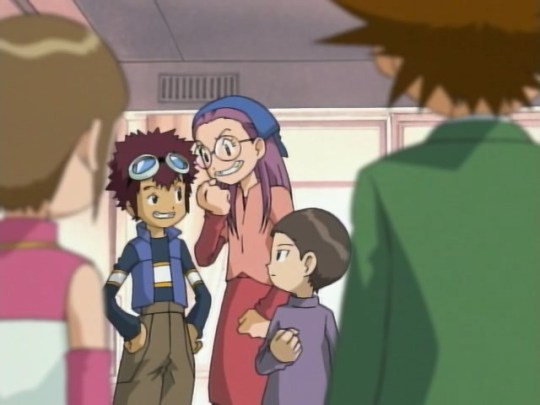
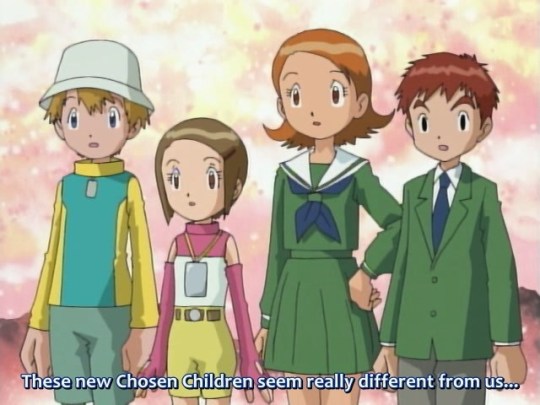
Having watched 02 in Japanese a few times and being very used to the core cast’s latter-half characterizations, rewatching the early episodes always strikes me really hard in the face with genuine shock at how shallow the kids -- especially Daisuke and Miyako -- start the series off as. It’s understandable in terms of the context of the series -- unlike the Adventure kids, who were thrown into a “survival, need to get home” situation off the bat and thus already understood the need to be wary, these kids started off having comparatively easy access to home at any time, and didn’t have a constant sense of danger and survival looming over their heads. It naturally took a lot of time for the gravity of the situation they were in to start really hitting them, and so even the relatively straight-laced Iori didn’t exactly take it all that seriously at the beginning.
Yet while it took them a significantly more delayed time to understand what they were dealing with and take it as seriously as they needed to...they started cultivating something else in the meantime.
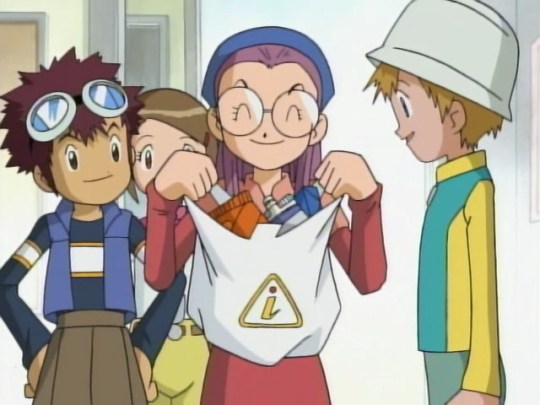
02′s first half is especially full of “random banter conversations” that seemingly involve nothing in particular, but, in fact, that’s actually part of the point. One thing I have always been quick to point out in regards to 02 is that it is rather unique among Digimon series in how it goes out of its way to portray its core cast as having become friends even in pure daily-life social friend terms, even if it had absolutely nothing to do with Digimon incidents -- these are kids who genuinely enjoy each other’s company even in the most mundane of situations. This was something that wasn’t the case for the original Adventure kids -- having been a group of kids thrown together by necessity, even though they most certainly kept in touch and trusted each other as fellow Chosen Children deeply, they started floating back into their own different social clusters after the events of 1999. Relationships are multifaceted, after all; you can still have a deep relationship and bond without necessarily being friends on a social level.
But already, off the bat, Miyako brings food for her new best friends, and it’s implied that she’s the main ringleader behind holding the picnic -- a picnic that started off having no intended relation to the Digital World territory war -- in episode 6. And, to be quite honest, can you really blame these kids? Even the Adventure kids wistfully entertained the idea of a long-term fun adventure through the Digital World in Adventure episode 54, wanting to enjoy its beauty and fun in a situation where they weren’t constantly running for their lives. Now that this luxury is actually available, why not take advantage of it -- and bond further with the others in the process? And for the rest of the year, these kids actively end up spending mundane conversations together and bonding to the point that, by the time we get to the end of 02, these kids have just genuinely bonded so much that they really come off as a cohesive, inseparable unit that would actively choose to spend time with each other if given the opportunity. In fact, even going through all of the TV Digimon series that exist as of this writing, I would say Appmon is the only one that really competes with 02 in portraying its core cast in this manner.
Again, remember: this is a series where characterization is dependent on how the kids treat others and interact with them, so you do actually have to pay close attention to these interactions and see how they change over the course of the series.
So once the episodes start coming in play, we actually learn a lot more about what happens when the characters start breaking away from their shallowness. For instance, episode 8, one of the first key episodes to understanding Daisuke’s character:
Daisuke: He'll be a great opponent. We didn't face off in the last tournament.
Takeru: If you had made it to the finals, you would have, right?
Daisuke: Don't remind me...
Hikari: Can you win?
Daisuke: It's not about winning or losing. Right now, all of the boys who play soccer in this country want to be like him. Just thinking about playing against him makes me excited!
For all Daisuke initially seems to be arrogant, he’s actually not that incapable of humility. Far from it, actually; he does have a genuine love for soccer and the spirit of the game, and, when completely and obviously unmatched, fully admits he has no chance and is set on enjoying the most he can out of it anyway. I feel like Daisuke’s surface-abrasive attitude really does throw off the fact that he’s a lot more genuinely humble than he’s given credit for. In the end, he’s satisfied enough with the accomplishment of pulling off one sliding tackle against Ken, and is able to enjoy that -- a foreshadowing of how the latter half relies so much on the fact that he’s capable of enjoying simple pleasures and being straightforward about them.

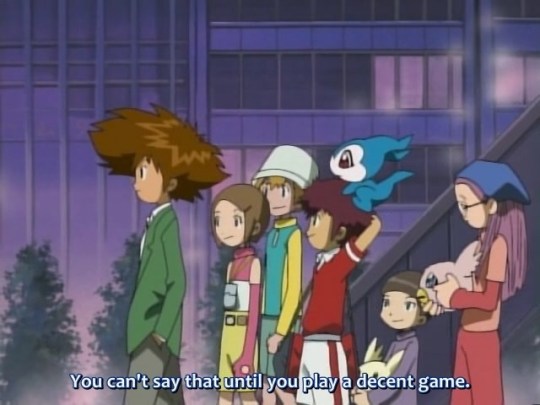
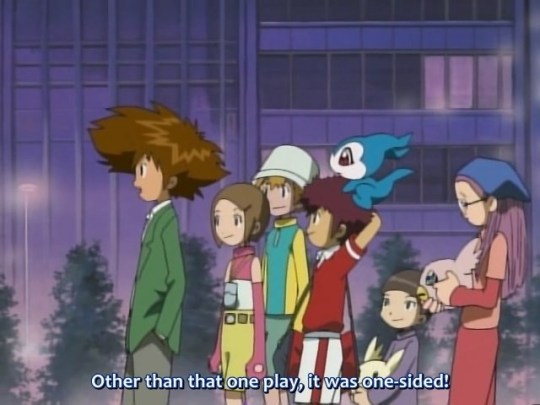
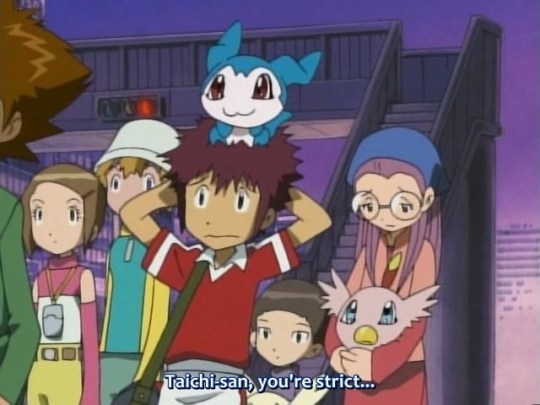
I find that this scene is really underappreciated, too (mainly because it gets lost in all of the other major things in this episode) -- while Daisuke jokes about his accomplishment, it only takes a single comment from his respected senior Taichi to shut him down.
There’s a huge reason I constantly emphasize that Daisuke respects his elders -- this part tends to get lost in translation a lot (especially the American English dub, which just smashed this aspect out of him wholesale, among other things) due to it being a bit reliant on Asian senior deference and cultural propriety, but Daisuke is respectful not only out of societal obligation but also because he genuinely respects his elders! The way he looks up to Taichi and chases after his approval is genuine, and even his interactions with the other Adventure kids have a major hint of him having genuine respect and deference to them. Daisuke is just a deferential person in general -- note that while his crush on Hikari tends to manifest when he’s at his most shallow, he’s actually the one putting Hikari on a pedestal (considering it his own responsibility to impress her), so he’s not actually as assertive as he tries to come off as. The first half of 02 arguably has him deflating more often than he actually stands his ground...and this is a trait of him that starts to actually change quite a bit over the course of the series.
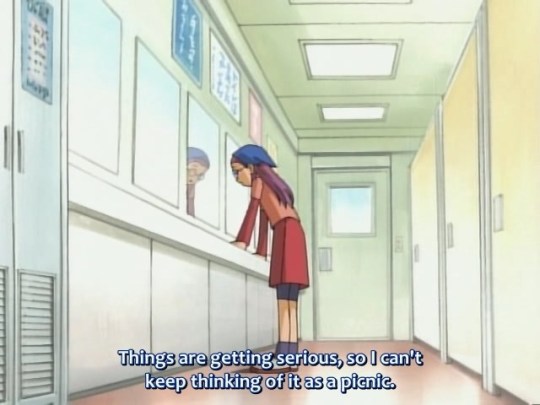
Miyako comes to terms with the fact that maybe she’d been taking this whole Digital World adventure thing too lightly in episode 10, indicating that she actually does have a good sense of priorities when they become increasingly clear! This is actually very important, because it fleshes her out as someone who’s emotionally sensitive -- too emotionally sensitive, to the point that “emotional sensitivity” is just as much of a driving point behind her later breakdown in episode 18, this time from taking her duties too seriously. Miyako is a very id-driven person, and so a lot of the early series is her struggling to find a proper balance on how to adjust her emotions in an increasingly escalating situation. Her heart is in the right place, she’s just not someone with an inherent sense of preparedness to deal with this kind of problem.
We get into the secondary Digimental arc, and there’s a noticeable consistent thread that all of them involve admission of personal faults. This is something that tends to throw people off at times -- wait, having bad traits about yourself is what awards you? -- but the point is that this isn’t like Adventure’s Crests, where things came from proof of exercising the virtue, but rather admitting that there are ways you need to improve, and showing a will to improve in that manner. In the end, people are not perfect human beings, and sometimes even understanding that you’re deficient is half the battle -- after all, the second half is all about a certain character named Ichijouji Ken coming to terms with some very, very serious personal problems.
In episode 11, Daisuke completely admits that he doesn’t feel he understands the concept of friendship the way Taichi and Yamato et al. see it, also latently admitting that he doesn’t see himself as worthy of the Digimental of Friendship. Beyond betraying a lot deeper issues within Daisuke that he seems to have actually had a background lacking in friends and sources of validation, he actually acts very self-effacing when admitting his issues to Taichi and Yamato, ultimately culminating in him calling himself pathetic. Or, in other words, he does want to be a better friend and to understand the concept better, and is harsh on himself for not doing better (which, of course, ultimately leads to how he eventually does gain better relations with the rest of the group and reaches out to Ken).
In episode 14, Miyako admits that she’s shallow and judgmental and tends to jump to conclusions based on first impressions. Recall that she’s comparing herself to Mimi in said relevant scene -- Mimi, whom she admires, and actually spends part of the episode trying to understand and empathize with the mentality of. This is not a statement of Miyako being proud of herself. Rather, this is Miyako being very straightforward about the fact that she needs to try harder to see through the essence of things and to see through to the emotional core of. Again, something she actually does start developing over the course of the series.
In episode 16, Iori gets his first major lesson on the limitations of being too stuck on principles in his attempt to be honest. Recall that Iori’s later character arc is very dependent on him realizing that his own view of the world is too black-and-white. It’s great if you could never tell a lie to anyone, ever, but in the end, that’s going to reach limitations of practicality -- after all, as Jou points out, what Iori did ended up not actually hurting Jou in comparison to the incredible amount of hurt it would have caused everyone by being too stubborn, and thus Iori would have failed to keep his responsibility to help the others because of one narrow-minded principle.
Hikari even gets in a bit during the infamous episode 13, where we learn that her “passive” attitude is biting her in the rear. In Adventure, Hikari’s passiveness and reticence had mostly been used as satellite development for Taichi (his insecurities as an older brother and his obligations to her), so this is actually the first time we get to see a proper perspective from Hikari’s side, and it turns out that his overprotectiveness has actually caused her to get dependent. But even though Taichi is the one the episode actually focuses on, the larger focus is more specifically on the fact that Hikari is too passive -- that she sees being taken by the Dark Ocean as an inevitable thing that’s just going to happen unless someone else steps in on her behalf. Takeru, of course, is having none of it.
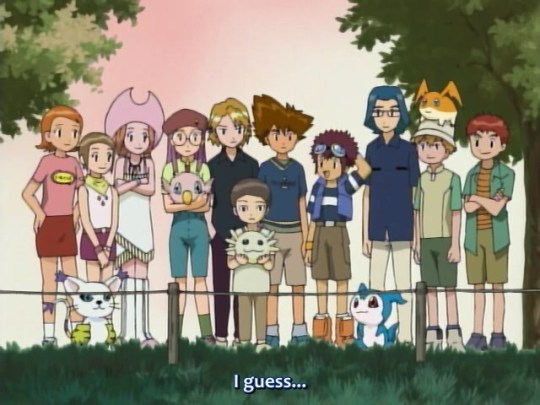
Once that’s out of the way, we go back to taking a look at the subtleties of everyone’s interactions. While everyone generally tends to focus on the second half of episode 17, it’s also pretty interesting to see how the 02 kids react to hearing about their seniors’ adventure in the first half -- remember that this is the first time the 02 kids are actually given any real depth about the degree of 1999′s events that’s not just random points of hearsay, and the way the new kids react to it indicates that they’re thoroughly floored. It’s later established that they didn’t even get the full story (it may not even be possible, given that the Adventure kids’ experiences may well have gone even further beyond what we got to see in 54 episodes), and yet the new kids are overwhelmed. 02 itself does not shy away from the fact that the younger kids really have no qualms about deferring to their seniors if need be, and treating them with utmost respect.
Another minor note, which I pointed out in my Daisuke meta earlier, is that the beginning of this episode is pretty much the last time Daisuke ever shows outright hostility towards Takeru for his relationship with Hikari -- it’s something you have to glean by squinting, but the implication is that the insecure and clingy Daisuke actually got to learn this episode that the two of them had a pre-established shared experience that he himself may not understand, and that it wasn’t just Takeru randomly swooping in and snatching away the closest thing he had to a friend for no good reason.
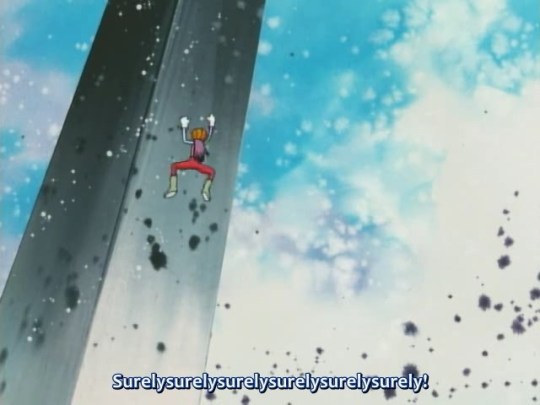
Once the Kaiser infiltration arc begins, episode 18 ends up being one of Miyako’s funniest episodes, but it’s a bit distressing that a lot of people in the fanbase often never let Miyako live this incident down, when in actuality this was explicitly not a good mental health day for her. (This is basically the equivalent of pinning Mimi as a conceited, self-centered jerk based on the fact she was one for a fashion in Adventure episode 25.) The beginning and ending of this episode establish that this is basically a result of Miyako...trying her hardest. She’s scared as hell, but she also learned in episode 10 that this is something she needs to take seriously, and the stress puts her into a mental breakdown. This is why she ends up having a heart-to-heart with Hawkmon at the end; her heart is in the right place, but she needs to find a way to channel her emotional sensitivity in a way that doesn’t make her into a complete mess.
And note that her own voice actress, Natsuki Rio, even pointed out that Hawkmon’s actions had enough of an influence on Miyako’s character that she had to play her differently thereafter.
At first I always played her with Maximum Excitement, and I kept thinking “someone, please, stop her,” but the more straight-laced Hawkmon did his best to pull her in and hold her by the reins (laughs). Thanks to him, Miyako became a lot more of a put-together person…thank goodness Hawkmon is her partner!
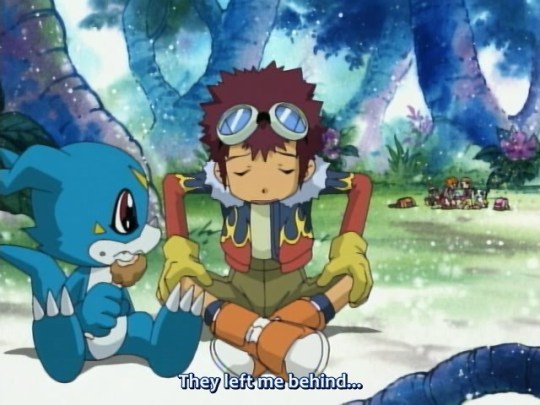
Episode 19 has two interesting things of note that I want to point out -- first of all, starting from the very beginning of the episode, everyone ditches Daisuke because they’re independently going in to infiltrate the Kaiser’s base. Note the complete lack of a plan here whatsoever -- everyone’s just going in on their own -- and the fact that everyone expects Daisuke to come up with what he wants to do on his own. For all it’s worth, even though Daisuke may have a designated protagonist aura to him, within the story itself...nobody actually sees him as a leader at this point in the series (and, to be fair, he’s never really tried to claim the position, either).
It’s similar to how Taichi was never recognized as a particular leader of the Adventure group until Adventure episode 28, but in regards to the full team dynamic, it’s actually inverse -- the Adventure kids were capable of making tactical plans together as early as episode 20, but fell apart emotionally in short order as soon as Taichi was gone, whereas here, the kids are fond enough of each other to hang out socially and support each other emotionally, but they take a while to get any real cohesiveness as a fighting group.
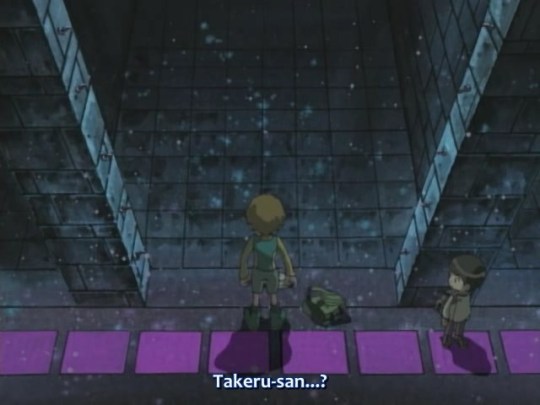
The other is that Iori personally witnesses Takeru’s sudden whiplash into his grudge against the darkness and the Kaiser, and it scares the hell out of him.
Takeru eventually laying a punch on the Kaiser is a pretty awesome moment (and, really, Ken kind of deserved it, so it’s hard to not cheer for him), but it’s also important to note that within the context of the series, this is not a good mental place for Takeru to be in. Iori, the person who should by all means sympathize with hatred of evil things at this point of the series, is still extremely unnerved by Takeru’s actions here, because he’d always seen Takeru as a mature person who’d always kept his composure, only to show a drastically different side of him that he hadn’t even shown a hint of before. That kind of “two-facedness” and emotional repression -- and this way of venting trauma in general -- cannot be good for Takeru at this point in time, and it’s also an important moment for Iori when he later admits during the two’s Jogress arc that he’s having a bit of a hard time understanding him.
And so episode 20 comes, and Chimeramon pretty much takes out the entire party, leading to this conversation.
Takeru: Let's escape.
Daisuke: Escape?
Takeru: We can't fight anymore. Our mission has failed. We'll retreat and wait for another chance.
Hikari: You're right. We have no other choice.
Iori: Understood.
Daisuke: No.
Miyako: Daisuke?
Daisuke: We can't just say "another chance" like that. If we leave now, they'll keep attacking anything in sight. We don't know if we'll be able to get into the fortress again. So this is our only chance!
Hikari: That's crazy...
Iori: Exactly!
Miyako: They're all back to their Baby forms...
Chibimon: Daisuke...
Daisuke: But...didn't you all see it? Destroying those towns...and all we could do was watch quietly. I don't want to see that ever again. I won't let them do whatever they want! So I'm going, even alone. I won't give up now. After getting this far, all I can do is go forward!
Why is this moment important? This is the first time Daisuke has actually stood a firm ground against anyone else in the party -- and not only that, with the entire party standing against him.
Recall that I mentioned earlier that, in spite of Daisuke’s abrasive attitude suggesting otherwise, he actually has a tendency to “deflate” pretty quickly when people tease or criticize him. He spends the first half of the series having a lot more bark than he actually has bite. Earlier in the series, if the entire party were to go against him, he’d be more likely to begrudgingly go along (while complaining) -- in fact, he actually did just that at the beginning of episode 7! But now that push has come to shove, Daisuke’s own sense of morals and bleeding heart have won out. (While his decision here is definitely a bit reckless, he does have a point; if they’d retreated, they might genuinely lose any future chances.) Even with the entire party telling him to pull back, he refuses to accept what they want him to do, and pushes forward.
This is where Daisuke first starts to really make strides towards what becomes his eventual major role in the group as “the one who pulls people forward”. It’s a moment after which the rest of the group themselves also start to treat him with more respect now that he’s proven he’s not just a doormat, and that when it comes to there being a real problem with real priorities, he does have the resolve and initiative to keep going.
Also, a very important point is that he immediately says he’ll go alone if he has to. He doesn’t begrudge the others for wanting to fall back, and has no condescension towards them; he just can’t stand the fact that he himself is being asked to sit it out.
So, you know. Episode 21 happens. Ichijouji Ken goes through some real trauma as Wormmon dies in his arms. And all Daisuke has to say is...
Daisuke: You should go home. There are people who are worried and waiting for you! Go home!
Remember when I pointed out that 02 takes a very unique perspective on Ken’s redemption arc, pointing out the futility of being too trapped in the idea of symbolic penance and focusing more on actively taking steps in the future to make up for and fix things? Here’s our first major sign of this, and Daisuke’s eventual approach to Ken -- Daisuke does not choose to scorn or lambast Ken for what he’s done, even though there are a lot of things Ken deserves to be harped on for, but rather instructs him to take the first active step towards fixing his mistakes, in this case fixing things with his family.
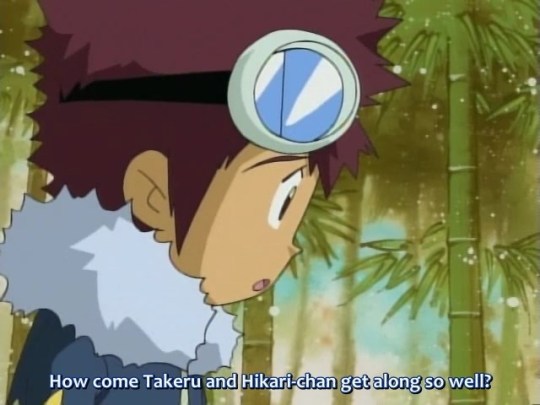
Episode 22 is Daisuke’s own “fanbase will never let him live this down” moment, but there’s still some interesting things to note here. Firstly, Daisuke’s “relapse” happening exactly when it seems like his duty to the Digital World is done and there’s nothing to do besides community service doesn’t seem coincidental, especially when this exact episode actually dedicates a full scene to Takeru, Hikari, and their partners going “...now what?” Secondly, as I touched on earlier, note that Daisuke’s never really seemed to have any resentment against Hikari for not responding to his affections -- in fact, he still considers it his own (and V-mon’s, by extension) duty to be the one to impress her. It’s a surprisingly refreshing take on the “shounen hero with a crush on a girl” trope, because in the end...Daisuke isn’t actually all that possessive of her, he just really wants validation from her, and respects her a lot.
More importantly, though -- note the way Daisuke handles this topic. He’s not actually mad at or resentful of Takeru anymore. In fact, he’s mulling on the topic and wondering what he could do to be on that level. Yup, even when Daisuke’s being shallow and jealous, he’s still learned to handle this issue ever so slightly more maturely than he would have at the beginning of the series.
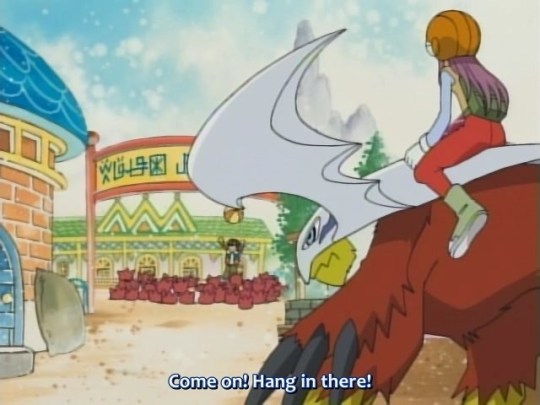
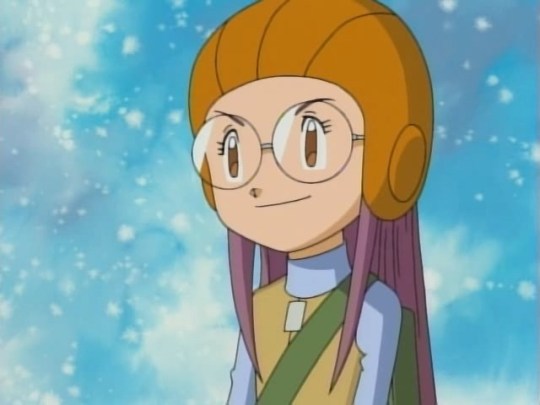
This is also important because only one episode later, once Daisuke becomes disappointed again at Takeru and Hikari walking off on their own, Miyako intervenes -- not only so that Takeru and Hikari can have their space, but also so that Daisuke can have some genuine fun and something to do. This is a very blink-and-you’ll-miss-it moment in episode 24, but it makes it very clear that Miyako was looking out for Daisuke’s welfare, too, and I think it’s very important in light of the events of the prior episode. Miyako, who had always been fumbling on what to do with her emotions, is starting to properly channel them into managing the dynamic between the team and checking in on how everyone’s doing, and that starts to guide her actions and relationships for the rest of the series.
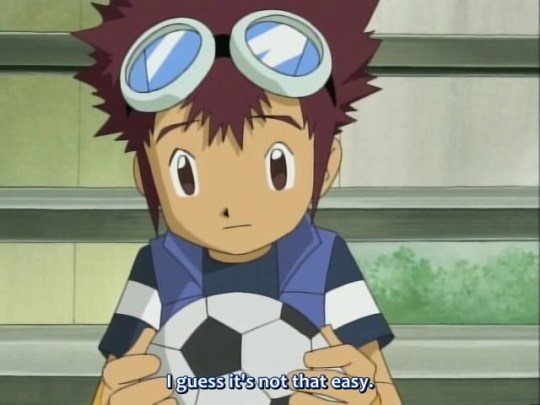
The next episode (25) is where we kick off not only the Jogress arc, but also the arc where we start going into everyone’s attitude towards Ichijouji Ken. This is important not only because Ken happens to be the effective central figure of 02′s story, but also because -- well, remember, 02 is fundamentally founded on the concept of relationships, so it’s only natural that the other kids’ relationship with the “team newcomer” will be a key aspect of the second half, and in relation to their own characters.
Remember how I said that Daisuke’s first-half character involved him being extremely deferential and often deflating whenever he was criticized or someone stood against him? At the time of episode 25, once again, pretty much the entire team is standing against him -- he’s the only one who’s this level of open-minded about getting Ken into the group, and everyone else is showing differing levels of opposition. But while Daisuke doesn’t begrudge the others for thinking this way, he also doesn’t back down, either, and reaches out to Ken on his own because he still really believes in what he’s doing. Now that he’s settled into what it means to be a Chosen Child, he’s started to gain a proper idea of what he wants to do, and what he feels needs to be done.
So, let’s recap everyone’s stances on Ichijouji Ken at the time of this episode!
Daisuke: Forward-thinking and optimistic; willing to believe that Ken should be given the chance to make up for his mistakes and that they should put everything behind him, even to the extent of believing that there’s probably a good reason for the more suspicious aspects about him (prior to the events of episode 25, it was unclear whether Ken was being a bit too callous about killing Digimon). Also the most actively aggressive in reaching out to Ken and trying to get him to join them.
Miyako: Forward-thinking; she openly states at the beginning of the episode that she thinks Ken’s learned his lesson, she’s just worried about whether he’s going to keep doing questionable things in the future (killing Digimon). Once it’s on the table that he’s not just doing this callously, she immediately is on board with him (to the point of even being the first in the group to use given name basis with him), but her stance on what to do with him is more on the edge of “give him space and wait for him to come on his own terms” (she ends the episode saying she’ll be waiting for him to come).
Takeru: States in the episode that he does believe that Ken’s changed, but doesn’t really know what he’s thinking (i.e. too inscrutable to really be sure about). The later episode 35 implies that Takeru was inclined to be a bit more sympathetic than you’d think otherwise, because he understands the trauma of losing a Digimon partner.
Hikari: Wants to wait a little longer and see how things play out. (Remember that Hikari has a known, consistent thread of taking a very passive approach towards things.)
Iori: Absolutely against it on sheer principle.
It should be noted that none of these stances are wrong. Iori sometimes gets a lot of flak for being the one with the most infamously cold stance towards Ken, but when you really think about it, Daisuke and Miyako are very lucky that their hunch about Ken was right and that he actually did happen to be a very kind boy who had a little too much trauma and some supernatural influence. The fact that Ken is a very emotionally withdrawn person for the rest of the series meant that the two of them ended up breaking through to him the most, but there’s nothing wrong with Takeru, Hikari, and Iori’s skepticism; Ken did some pretty shockingly horrible things in front of their eyes for the first half, and it’s entirely within their rights to determine how forgiving they want to be with him.
In any case, we get to episode 26 (the first Jogress), and most of that episode goes without saying, but I do want to emphasize Daisuke’s lines right before it happens.
Daisuke: If you die now, you won't be able to accomplish anything...I don't want that!
Ken: I don't want that...There are still many things I must do.
Daisuke urges Ken not to go for the “suicidal penance” route not only because it sucks, but also because, as symbolic as it may be, it’s also counterproductive to the whole point of doing penance to begin with. If Ken really wants to make up for his mistakes, he’s only going to be able to do that if he’s actually alive to do it! There’s only so much you can do by drowning in self-pity by going “because I did this, because I did that” instead of actually taking responsibility for your actions.
02 itself is deliberately ambiguous on how much Ken’s transformation into the Kaiser was Ken’s own conscious will and how much of it was Dark Seed-induced supernatural influence, but one thing it’s consistent about is that it doesn’t really matter. Regardless of what the cause was, Ken did what he did, and it’s his responsibility to make up for it, and the only way to actually do that is to keep moving forward. The fact that Daisuke is so able to viscerally and directly address what Ken needs the most right now is what fuels their first Jogress, and why Daisuke becomes Ken’s closest friend through the rest of the series.
People have pointed out that 02 has a lot of moments of physical hits, but, notably, other than Takeru punching the Kaiser in episode 19 (which he really deserved, honestly), all of these hits are done with the express intent of bringing the other person out of a very, very deep mental abyss (Yamato punching Taichi in episode 10, Daisuke slapping Ken in 26, Miyako slapping Ken in 30, and Miyako and Hikari’s mutual slaps in 31), because they were in a state where words would no longer reach them otherwise. These are all circumstances of the kind where the person on the receiving end understands that they really needed a drastic wake-up call because of how deeply they’d fallen (and these aren’t some average mental abyss problems these kids are getting put through, either). It’s actually hard to imagine any of the 02 group getting in the kind of genuinely angry and vicious fistfights Taichi and Yamato would in Adventure, because of how close they are (the closest being Daisuke and Takeru grappling in episode 11, but it never got near that level) -- in fact, these kinds of things are done with the implication that they’re doing it because they trust the other person to not hold it against them (and in fact, the fact Yamato does this with Taichi in this way is intended to be read as a sign of how much better they’ve come to understand each other).
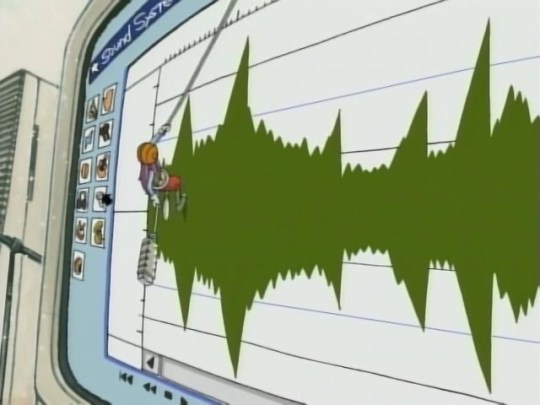
So, moving on with the series! The Giga House incident in episodes 28-29 is the first time the group works together in an organized effort, which is notable not only because it’s their first time coordinating with Ken, but also because it’s their first time properly coordinating at all. Remember when I mentioned that, back in episode 19, as much as the kids were pretty fond of each other and were great friends, they still hadn’t figured out how to actually fight as a team? Here we are, with them actually having started to figure that process out.
We then get to episode 30, where there’s actually quite a lot of interesting things to unpack.
Miyako: What's wrong with you?
Daisuke: E-Eh? Mi-Miyako-san?
Miyako: It feels weird when you add the "-san".
Daisuke: Shut up! Man, you're all the same!
Miyako and Daisuke’s relationship is often misconstrued considering that they’re the two most chaotic in the group (their temperaments are very similar at times, which causes them a lot of friction), but I also think this blink-and-you’ll-miss it moment is pretty much their actual relationship in a nutshell. They fight a lot, and they’re ostensibly vitriolic, but they’re actually two of the most like-minded in the group -- they banter because they’re comfortable with each other. Recall that I mentioned that Daisuke is normally respectful with his elders, yet he’s the only person in the group who won’t use the -san honorific on Miyako (even though she’s the oldest)...but the one time he gets flustered and uses it on her, she tells him that it’s weird and he needs to cut that out. Or, in other words, “it’s not like you to be weirdly respectful of me like that, we shouldn’t have that kind of distance between us, stop it.”
(It’s also pretty notable that Miyako has never seriously used -kun or any other honorific on Daisuke, even right after meeting him -- the only other person she dropped honorifics on was Iori, whom she’d known prior to the start of the series, but she seems to have deemed Daisuke enough of a fellow disaster child that he merited dropping it.)
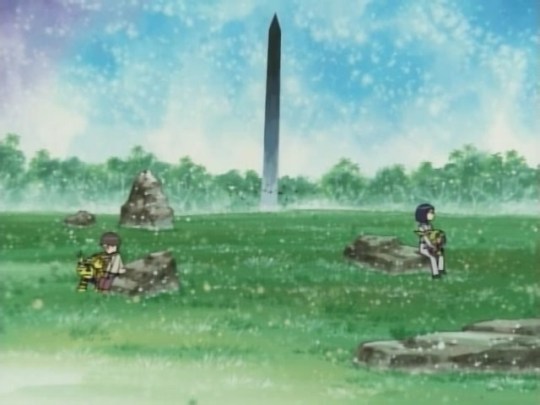
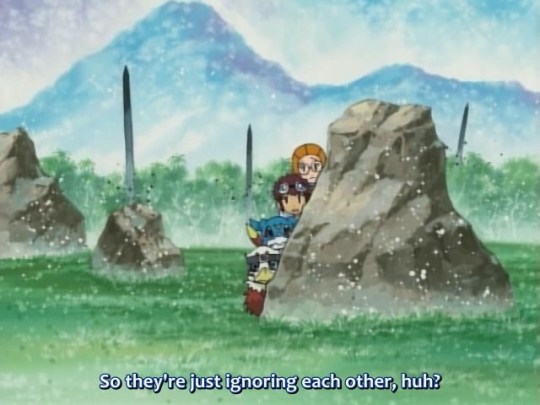
This is especially because, right after that, she recruits Daisuke into her plan to get Ken and Iori to get along -- in the end, when things really get serious, the two are incredibly like-minded (look at how in-sync they are when they scheme together).
30 is actually a surprisingly Miyako-centric episode, despite not ostensibly being one. For one, it says a lot that right now, her biggest priority is to get Ken and Iori to get along -- something that has absolutely nothing to do with herself. In episode 14, Miyako freely admitted that she had a tendency to jump to conclusions about people, and that she was shallow about aesthetics, but this is a very different Miyako from the one who harassed Daisuke for Ken’s autograph in episode 8, or immediately became distrusting of Digitamamon in episode 14. Instead, she’s simply just genuinely invested in seeing people she considers friends get along, and in a selfless manner -- one that has nothing to do with herself. She just really, really cares, a lot.
After all of the first-half hubbub of Miyako really having no idea of what to do with her emotions, the second half has her start channeling that energy into what’s always been one of her biggest strengths: checking on, connecting with, and caring about her friends. Daisuke may be an aggressive forward-thinker who can push everyone in the right direction, but unlike his predecessor Taichi, he doesn’t actually have particular charisma or leadership skills that can necessarily hold everyone together. In the absence of that ability, Miyako fills in for him, checking on the moods and feelings on everyone in the team and making sure everyone’s doing well. And that’s why she loses her temper and slaps Ken late in the episode -- because, really, she’s reached her limit on her “give him space” philosophy when he’s abusing it to be standoffish in a crisis situation, and, on top of that, she really, really did have a huge emotional investment in him.
Moving onto more Miyako in episode 31, her Jogress episode with Hikari, we get to see a little bit of the old emotionally compromised Miyako again, but -- much like the second Digimentals arc -- it involves the two of them acknowledging that both of them are not going about things the best way, and that there are things they can learn from the other.
Hikari: Miyako-san, you're a handful sometimes.
Miyako: I knew that's what you thought of me...
Hikari: But...I've always envied that.
Miyako: Huh?
Hikari: Because I can't be honest and say I'm scared or scream like you.
Miyako’s tendency to lose control emotionally results in her being insensitive much of the time, which she calls herself out on multiple times during the episode, and she can’t always be as “kind” as Hikari is -- but, on the flip side, her antics are something that can be a “light” (pun not intended) towards those who are falling in a bad mental state or into the darkness, and Hikari even acknowledges this when one of her trains of thought makes her break out into laughter. Miyako ultimately manages to get through to Hikari this way at the end of the episode, which results in a Jogress and mutual growth for both of them -- Miyako puts more thought into how to approach others (it’s pointed out at the end that she’s still thinking about understanding Ken and Hikari better), and Hikari gains more resolve and determination to fight against things instead of passively accepting her fate (she tells Takeru very directly at the end "I’m fine now. I’ll never go there again.”).
Iori and Takeru's Jogress is a little more complicated to the point where it spans multiple episodes, but a lot of it ends up having to do with the fact that the events of the BlackWarGreymon arc start really putting Iori's black-and-white principles into conflict -- it's wrong to kill something that's been proven to be alive, but it's also wrong to be evil. Putting a huge nail in that is that there's a stake in him forming a relationship with Takeru, but he doesn't really understand Takeru either -- the "two-facedness" he witnessed back in episode 19 scares even him, and he's so intimidated by Takeru that, in episode 35, he goes to approach Yamato about Takeru's past instead of asking the person directly. Takeru, hearing about this, complains that he could have just asked directly, but admits he understands why Iori did so.
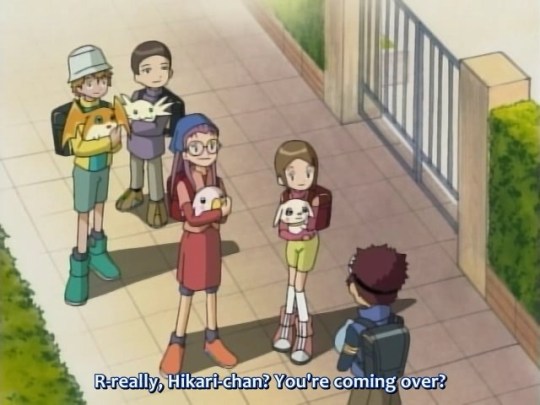
By the way, I should point out that episode 35 is the last time within the TV series that Daisuke is portrayed as having a particular interest in Hikari, and it’s just in terms of being slightly more excited that Hikari is joining his meeting. At this point, there are actual important things happening in the Digital World, and he needs to take care of Ken, too, and so...in the end, once again, Daisuke proves that he’s actually capable of putting aside those kinds of more shallow things when he really needs to.
On top of that, this is when the kids start actively working with Ken in the real world (and, if post-02 materials are any indication, continue to hang out with him even for social outings). The choice to have Ken live in Tamachi instead of Odaiba facilitated his isolation from the group during the Kaiser arc, and during around the third quarter they were all grouping up in the Digital World anyway, but the fourth quarter actually has the kids make an attempt to include Ken in their real-world outings despite the distance. Tamachi is not temporally far from Odaiba (approximately half an hour by train), but it’s a bit of a nuisance to get to, requiring crossing a bridge to/from the Tokyo mainland and paying extra for the Yurikamome. But at this point, he’s an important enough friend to them -- and them important enough friends to him -- that they’ll make it work.
At the end of episode 35, Iori finally decides -- to the point of recklessness, something that would have been previously very uncharacteristic of him -- to try and appeal directly to BlackWarGreymon to get him to stop destroying the Holy Stones so that they won’t have to fight. It’s emblematic of Iori’s heart being genuinely torn, because he’s having such a difficult time rationalizing all of these conflicting feelings. This comes to a head in episode 36, when Iori loses his temper at the rest of the group for “playing around”, but Armadimon snaps him back to reality to remind him that they’re tired and hungry, and this can’t be neglected. Iori himself ultimately becomes the one to proactively suggest that they take time to sit down and eat, indicating that -- little by little -- he’s starting to shift his thinking a bit, after being so incredibly stubborn for much of the series.
This is what leads to Iori and Takeru’s Jogress at the end of the episode, now that Iori is flexible enough in thinking to understand the emotional id behind Takeru’s mentality. And likewise, Takeru’s started to loosen up by 36, too --
Takeru: Sure, darkness is frightening, and we would feel at ease if we could get rid of it completely, but I'm sure that's impossible.
Ken: Impossible?
Takeru: Where there's light, there's always darkness.
Hikari: The brighter the light, the darker the shadow, right?
Takeru: Yes. That's why I think it's important not to lose sight of the light inside you, no matter how dark it is.
The thing about Takeru is that while he deceptively seemed more open and playful than Hikari for most of the series, he was actually bottling up a lot of emotions in a way not entirely different from the way she did. (Note how, despite how tied at the hip the two constantly are, they almost never actually talk about their thoughts on each other; it feels like a relationship where they implicitly trust each other but are practically reliant on that implicit trust to maintain that close of a friendship at all.) And he’s been keeping those emotions bottled up until they exploded in less-than-healthy ways, initially distancing himself from Iori. But being a lot more open about his thoughts on the matter allowed them to connect better, and eventually Takeru came to embrace a somewhat more reasonable stance on the matter after observing Iori.
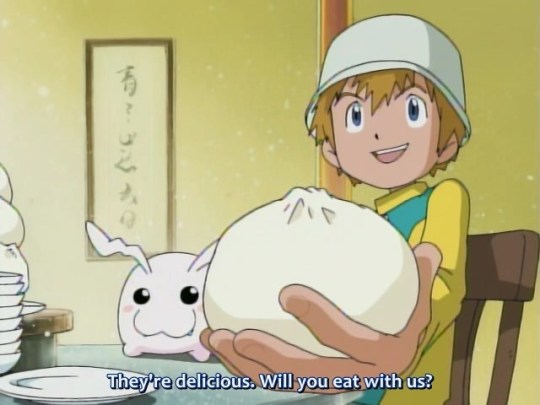
It also doesn’t seem like coincidence that this is the episode that ends with Takeru’s first major act of goodwill towards Ken.
This leads into episode 38, the Christmas episode. Fun things to note!
The episode opens with Daisuke and the other younger kids giving a “Christmas present” to their seniors in the form of letting them reunite with their partners. Remember how I said that the 02 kids always admired their seniors and looked up to them? Even this late in the series, the series does not shy away from the fact you’re supposed to see the 02 kids as their deferential juniors.
The Christmas party is, of course, notably, the first major moment of reconciliation between Iori and Ken, with Iori having gone through major harsh lessons about morality in the last few episodes, and Ken opening up more to the rest of the group. Said party is also yet another notable example of how much of a priority it is for the 02 kids to be “social life friends” and not just friends working as a Digimon incident team -- after all, having genuinely emotionally present friends is what Ken needs most in his life right now, considering that the party is treated as the first time he’s been truly happy in a long while.
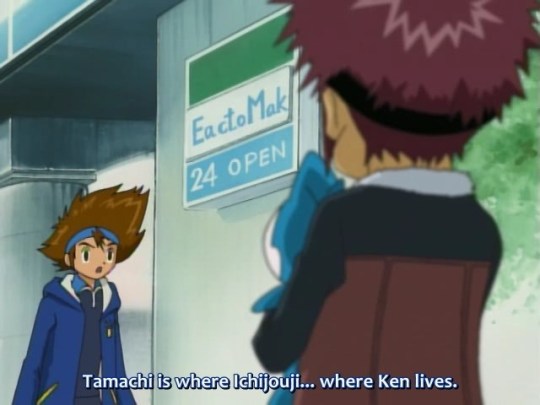
This is followed by episode 39, which is notable as the time when Daisuke finally commits to switching to given-name basis for Ken, and actually opens the episode standing against Taichi -- because he's so worried about Ken that he needs to go join him. This is something that's lost a bit in translation, but although Daisuke stands down against Taichi, he's not rude nor does he overstep his boundaries with his respected senior (he even opens his statement in polite-form Japanese) -- he's just saying, firmly and politely, "I'm sorry, but I can't go, I have to go help my friend." It’s a notable moment because while Daisuke has been becoming increasingly assertive and aware of what he really wants to do, this is the first time we’re actually seeing him refuse to defer to the very senior he’d spent so much of the series idolizing and looking up to.
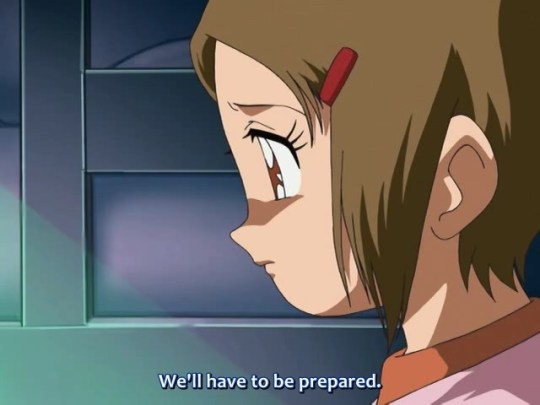
We get to episodes 43-45 (the Demon mini-arc), which is also the culmination of the 02 kids having to face the limits of pacifism. This tends to throw off people who are coming in from Adventure, since the Adventure kids ended up killing Digimon with a lot more ease in the original series, but it’s also important to make note of the fact that the episode itself deliberately portrays a gap in mentality between the Adventure and the 02 kids -- with Hikari torn between the two. It also creates an interesting subversion of expectations when Hikari, the one you’d expect to be more on the pacifist side, is the one who’s already accepted that it may be inevitable, whereas Miyako, the more aggressive and belligerent one, is the one staunchly against it.
The reason for this “paradox” comes out of a single line from Hikari in episode 44:
Hikari: You’re the one who saved him, Miyako-san.
The Adventure kids never liked killing. They were never enthusiastic about it -- it was just that they were almost immediately put in a situation where the entire fate of the multiverse was at stake thanks to some unambiguously evil Digimon who wanted nothing but wanton destruction. Even then, it was pretty clear that they never enjoyed it -- Takeru professed a desire to avoid fighting in Adventure episode 12, and the pacifist Mimi went through a breakdown in Adventure episodes 45-50 trying to avoid casualties. But one of the most important lessons Mimi learned at the time was that pacifism has its limits -- there’s no point if it ends up in more deaths than it saves, because at that point you’re adhering to moralistic principles more than you’re actually saving lives.
The fact that the Adventure kids and the 02 kids have a “different mentality” isn’t just happenstance, but outright embraced. Daisuke, Miyako, and Iori never had to actually deal with a conscious Digimon that was unambiguously evil for most of the series, and Archnemon revealing that her motives were pretty much nothing but wanton destruction in episode 29 was the first major warning signal to Iori that his pacifism might have limits. And during this Demon mini-arc, it’s not like these Digimon are threatening multiverse destruction or anything -- it really does seem like a constant “glimmer of hope” that maybe, just maybe, they can save people non-lethally. Alas, they can’t.
Daisuke, being someone who’s inherently practical-minded, starts entertaining the idea that push may come to shove as early as episode 25, and finally makes his first statement about practical limits in episode 43. But the more emotionally caught-up Miyako and Iori end up taking another episode to swallow it, and they don’t take it well. Most of the attention in 44 is given to Miyako, and it reconfirms that, despite her aggressive exterior, she’s emotionally sensitive and empathetic -- and while killing LadyDevimon is framed as truly the only thing that could have been done in that situation, Miyako is not faulted for being emotionally compromised, nor is Iori likewise when he faces a similar situation with Takeru and is forced to confront the people whose lives were at stake.
Episode 45, when Ken opens the gate to the Dark Ocean, doesn’t really have much to add on top of what’s already there, but this is basically “the point of no return” when everyone confirms their own emotional investment in Ken and understanding that he’s not just reformed, he’s genuinely struggling under the pain of what’s been happening -- and this is before they find out about the truth behind the Dark Seeds, and that Ken’s transformation into the Kaiser may have been supernaturally influenced, too.
It’s also interesting to see the different ways each kid reacts to Ken as they support him:
Hikari, the most outwardly compassionate, goes to support him the second she notices him in physical pain; Takeru notices that it might work, realizes Ken needs the support, and joins.
Iori and Miyako reflect on how Ken’s putting all of his efforts in, and lambast themselves before joining. Interestingly, given the circumstances behind what’s happened up until now, Iori and Miyako criticizing themselves take a different meaning -- Iori, who’d been scornful of Ken until recently, seems to be regretting that he distrusted him when Ken had been trying so hard, while Miyako, who had been open to him since episode 25, seems to be upset that she’s sitting there and not doing enough when he’s in all of this pain.
And Daisuke, of course, the most “forward-thinking” of them all, gives Ken a speech about what he’s done so far and reminds him that he’s already done more than enough for “atonement” -- which is, of course, what directly reaches Ken the most.
And when we get to episode 46, and the kids, now knowing about the Dark Seeds, hold a roundtable (and emotional support group) to discuss what to do about the Dark Seeds, Daisuke’s the one with the most spirit and energy about it, but...
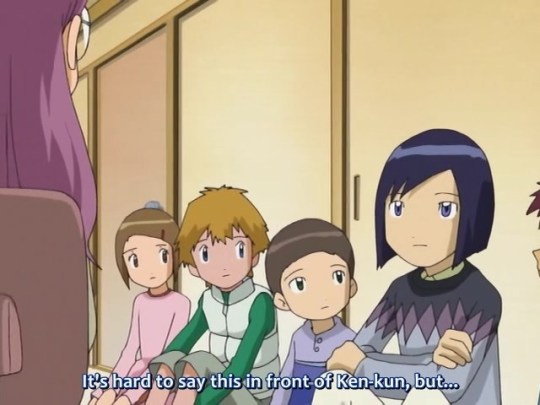
...the one actually leading the roundtable? Miyako.
Miyako: Sorry, that's all I can think of.
Ken: Please don't worry about me.
Miyako: (nods)
It’s subtle, but the scene in question does actually make a deliberate move in indicating that Miyako’s continuing to channel her emotional sensitivity and desire to go out of her way to help Ken -- of course, they all know how traumatic this is for him, but she’s the one who’s actively calling attention to how he must feel about it first and foremost.
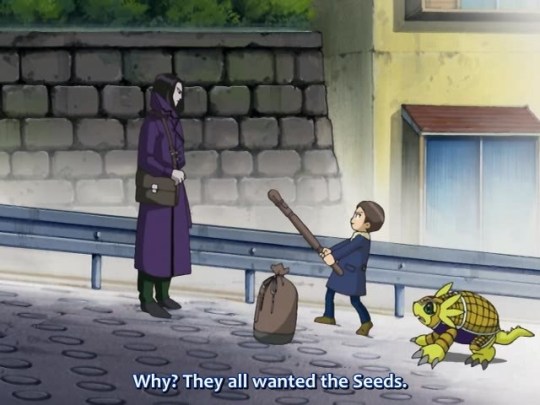
Episodes 47 and after end up becoming yet another major wake-up call for Iori (seriously, I do not understand why people claim he had no character arc when this wasn’t even remotely subtle) when he learns that Oikawa, whom he’d pinned as “evil”, has a deep relationship with the father he’d grown up idolizing so much, and it completely flips his world around -- even though he had started to get a bit more open-minded, he’s still trying to rationalize what should have been, in his mind, two diametrically opposite things. It fuels his confusion and desperate desire to understand more, not just about Oikawa, but about everything he’d thought about morality and why people turn to evil.
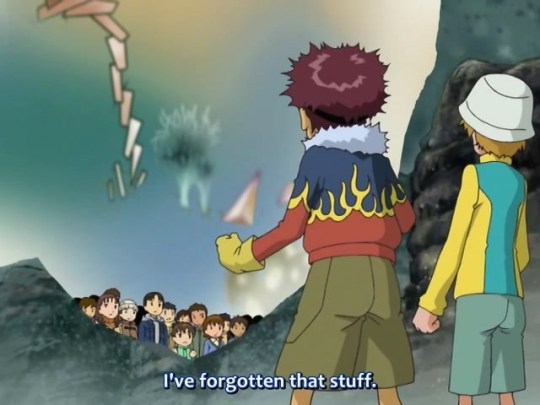
So we get to the final arc of the series, and it involves a confrontation with BelialVamdemon -- but said finale is heavily dependent on talking to the Dark Seed children and inspiring hope back into them. This results in a conversation where everyone talks about their career dreams, and Daisuke admits that he wants to be...a ramen chef, which completely blindsides even his friends.
What’s with this arc?, you might think. And moreover, why is Daisuke ending the series still kind of an idiot? Even Miyako still seems to be a bit of a mess and chaotic. Weren’t they supposed to be growing into dignified heroes, like Taichi and his friends were last series?
Well, here’s the thing -- the fact that the 02 kids end the series comparatively “undignified” is actually very inherent to the core theme of 02 itself. There were more than enough episodes that established that said kids are heroic in their own way -- caring about others, fighting on others’ behalf, and learning important lessons about what’s important to fight about. That doesn’t mean they don’t get the right to continue being disaster children while they’re at it.
Why?
Let’s look at a few official statements behind the creation and intent behind 02 as a series. From producer Seki Hiromi, from the Digimon Animation Chronicle:
That came from an idea I had while reading a newspaper article. I read a story about a nine-year-old boy going to Columbia University, and I thought, “This boy is going to college because he’s considered a genius, and everyone around him will be in their twenties, and he won’t get to have any friends his age. What kind of life would this boy end up having?”
Or some very interesting statements from head writer Yoshimura Genki from the 02 Blu-ray box:
When I was writing Ken Ichijouji, the main idea for him I used as a basis was the conflict between “the self that has to be a well-behaved child when adults are watching” and “being able to be oneself”, and the pain that came from it as a result.
So for instance, in the same way as the Pinnocchio fairytale, or the short story A.I. that was adapted into a movie, or many other works, there are probably universal worries that all children feel as they grow, but also, there were ongoing unimaginable, atrocious incidents happening with children at the time, and perhaps it was those social conditions that gave me a hint on what to do. I think I had some thoughts that I wanted to convey to the children who were living through that time.
I was given the opportunity to put those kinds of feelings, as much as I liked, into episode 23, and I am truly grateful to all of the staff, including the director.
...
Also, this is about Daisuke’s character, but I believe I paid particular attention to making him “a child who could be himself”.
He has no special talents, and although he’s clumsy and scatterbrained, I wanted him to be someone whose strength was in his straightforwardness, and wrote him that way.
Lying underneath the entirety of 02 itself is a theme about “children who are not allowed to be children”. Or, in other words, the pressure placed on children to be “talented” and “dignified” and “well-behaved”, often imposed on them by well-meaning parents who are unfortunately taking the opportunity to stroke their own ego, robbing them of the happiness and mental freedoms they should have as kids.
Ichijouji Osamu and Ken, who were placed under the pressure to be “genius children” and cracked under the pressure to please their parents. Oikawa Yukio, who was cut off from the Digital World in childhood by a well-meaning Hida Chikara, worried about his son getting into “foolish” talk. The Dark Seed children, who also fell victim to similar pressures that Ken did, and lost hope for life unless they could force themselves into that mold.
Takeru: If you want the Digimon to exist, if you believe in that, they will. Just like our feelings...Just like every child having the power to make their dreams come true.
Keiko: That's just childish.
Daisuke: You all have dreams for the future, don't you?
Noriko: Dreams for the future?
Takashi: I've forgotten that stuff.
Daisuke: No way! You must have one!
Takeru: It's nothing to be ashamed of.
Takashi: Then, what's your dream?
Daisuke: Mine? Mine's a ramen shop. I love ramen! I'll become the world's best ramen maker!
Ken: I had no idea...
Noriko: Well...actually, I wanted to be a kindergarten teacher.
Hikari: Me too.
Daisuke: What about you guys?
Takashi: A baseball player!
Keiko: I really want to be a pastry chef.
Hiroshi: When I said I wanted to be a manga artist, everyone laughed, so I gave up...
Takashi: We all had aspirations, and at some point we thought that wasn't allowed...But we were wrong, right?
Daisuke: Let people say whatever they want!
Noriko: You're right, we should be free to dream.
Miyako: Not just dreaming. If you work hard, your dreams will surely come true!
Notice something about all of these careers mentioned? They’re all the kind of “overly childish” “wild dream” “undignified” “too simple” kinds of dreams that an average parent might be uncomfortably quick to shoot down because that’s “not good enough”. These are the kids who willingly accepted the Dark Seeds; they, much like Ken, probably grew up under parents who prioritized school performance and other “societally dignified” things that ended up eating away at their happiness.
02 has a lot of different themes, but the one that lies in its undercurrent from start to finish is “so why does a child have to be this way? As long as they still understand what’s important, do they have to be dignified people? Why can’t they just be free to have dreams and be themselves?” And Daisuke and his friends are there specifically to stand up against this mentality, and to remind Ken and the other victims of it that it doesn’t have to be this way -- that it’s okay to be your true self, and be a child, and not succumb to all of those arbitrary, shallow standards people put on you. Even if that means you’re still a bit of a chaotic disaster at the tender age of eleven.
Digimon, in the Adventure and 02 universe, have always been treated like a part of the self (they were literally conceived as a physical manifestation of the soul), but in 02 they gain an extra meaning of representing “the inner, deepest part of yourself that represents your wildest ‘childish’ dreams”. The symbolism of Ken spending the first half of the series trying to reject Wormmon for being “weak” -- in other words, rejecting his own kind-hearted self for not being the kind of “strong” entity he was pressured and groomed into being -- is not lost, nor that of the Dark Seed children gaining partners when they reconnect with their dreams and wishes, nor Oikawa finally, finally meeting his partner when he comes into contact with the past he’d really lost (and especially not the fact that his attempt to reclaim shallow reminders of said childhood involved trying to make his own Digimon).
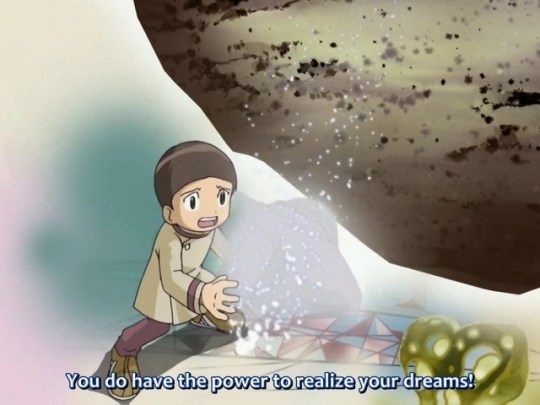
And notably, the series’s finale (prior to the epilogue) ends not on Daisuke but on Iori, escorting Oikawa to the Digital World despite how completely impossible it would have been for early-series Iori to even entertain the idea, finally coming to truly understand what happened with him and being most personally impacted by his death.
But in any case, where are we with the characters? We’re here to talk about how they’ve grown and developed over the course of the series. Let’s recap:
Daisuke: Started off the series as an abrasive kid with more bark than actual bite, constantly deferring to others and easily deflating, relying on shallow sources of validation like wanting attention from Hikari; gradually gained an ability to identify what was important and put his foot down for it, embraced his forward-thinkingness to reach out to a heavily troubled child as a friend, and ended up surrounded by a friend group that loves and respects him.
Miyako: Started off the series as a shallow, flighty girl with poor control over her emotions and difficulty in appreciating the gravity of things; came to channel her emotional range into empathy for others and compassion, bringing other people together and taking care of them.
Iori: Started off the series as a straight-laced but too principled child who stuck to “rules of what’s right” not only in morality but also in way of acting; started to appreciate the emotional nuances and heart behind why people do what they do and how it’s possible to be more flexible in “doing good”.
Ken: Well, his character arc is pretty obvious, but -- again, while his arc of learning to forgive himself is well-known, less often pointed out is that it centers very heavily on not only having penance but also not being too hung up on the past, and the futility of drowning in self-pity and regret instead of choosing to take responsibility and act more productively going forward.
Takeru: Started off the series as a seemingly mature but deceptively inscrutable character whose duality made him hard to approach; eventually opened up with the help of others and showed a capacity for being more flexible with his personal grudges.
Hikari: Started off the series emotionally repressive and passive to the point of self-destruction; eventually embraced connections with her other friends and became more active in taking a stand for herself.
Hey, not bad!
And, again, this is not a series you should be reading in terms of “self-awareness” in the same way Adventure was, but in the sense of their “relationships” and how they interact with others. By being less abrasive and more assertive, Daisuke gained the respect of his other friends. By putting her emotional capacity into caring about others, Miyako became someone who holds the group together. By learning to think a little more flexibly and be less stubborn, Iori arrived at a position where he could more easily sympathize with others in the group. Takeru and Hikari both moved from their previously relatively inscrutable positions to ones who could more effectively interact with and open up to others. And Ken, of course, became someone who managed to integrate himself into a group of true “friends” despite everything he had done against them in the first half.
This, in the end, is how you get what’s one of the tightest friend groups in Digimon history. In the end, the relationships themselves are almost like characters of their own that got development -- I say very often that you could take two of the characters and have an excellent scope of how they’d interact and play off each other by the end of the series. And although they end the series as possibly one of the most shameless, undignified disaster groups out there...they’re certainly still heroic, and in any case, given the lessons they learned throughout their own series, they probably wouldn’t have it any other way.
249 notes
·
View notes
Photo
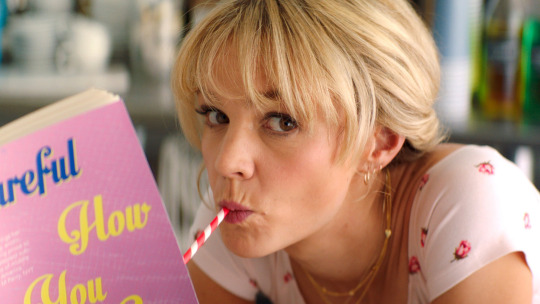
Careful How You Go.
Ella Kemp explores how film lovers can protect themselves from distressing subject matter while celebrating cinema at its most audacious.
Featuring Empire magazine editor Terri White, Test Pattern filmmaker Shatara Michelle Ford, writer and critic Jourdain Searles, publicist Courtney Mayhew, and curator, activist and producer Mia Bays of the Birds’ Eye View collective.
This story contains discussion of rape, sexual assault, abuse, self-harm, trauma and loss of life, as well as spoilers for ‘Promising Young Woman’ and ‘A Star is Born’.
We film lovers are blessed with a medium capable of excavating real-life emotion from something seemingly fictional. Yet, for all that film is—in the oft-quoted words of Roger Ebert—an “empathy machine”, it’s also capable of deeply hurting its audience when not wielded by its makers and promoters with appropriate care. Or, for that matter, when not approached by viewers with informed caution.
Whose job is it to let us know that we might be upset by what we see? With the coronavirus pandemic decimating the communal movie-going experience, the way we accommodate each viewer’s sensibilities is more crucial than ever—especially when so many of us are watching alone, at home, often unsupported.
In order to understand how we can champion a film’s content and take care of its audience, I approached women in several areas of the movie ecosystem. I wanted to know: how does a filmmaker approach the filming of a rape and its aftermath? How does a magazine editor navigate the celebration of a potentially triggering movie in one of the world’s biggest film publications? How does a freelance writer speak to her professional interests while preserving her personal integrity? How does a women’s film collective create a safe environment for an audience to process such a film? And, how does a publicist prepare journalists for careful reporting, when their job is to get eyeballs on screens in order to keep our favorite art form afloat?
The conversations reminded me that the answers are endlessly complex. The concerns over spoilers, the effectiveness of trigger warnings, the myriad ways in which art is crafted from trauma, and the fundamental question of whose stories these are to tell. These questions were valid decades ago, they will be for decades to come, and they feel especially urgent now, since a number of recent tales helmed by female and non-binary filmmakers depict violence and trauma involving women’s bodies in fearless, often challenging ways.
Emerald Fennell’s Promising Young Woman, in particular, has revived a vital conversation about content consideration, as victims and survivors of sexual assault record wildly different reactions to its astounding ending. Shatara Michelle Ford’s quietly tense debut, Test Pattern, brings Black survivors into the conversation. And the visceral, anti-wish-fulfillment horror Violation, coming soon from Dusty Mancinelli and Madeleine Sims-Fewer, takes the rape-revenge genre up another notch.
These films come off the back of other recent survivor stories, such as Michaela Coel’s groundbreaking series I May Destroy You (which centers women’s friendship in a narrative move that, as Sarah Williams has eloquently outlined, happens too rarely in this field). Also: Kata Wéber and Kornél Mundruczó’s Pieces of a Woman, and the ongoing ugh-ness of The Handmaid’s Tale. And though this article is focused on plots centering women’s trauma, I acknowledge the myriad of stories that can be triggering in many ways for all manner of viewers. So whether you’ve watched one of these titles, or others like them, I hope you felt supported in the conversations to follow, and that you feel seen.
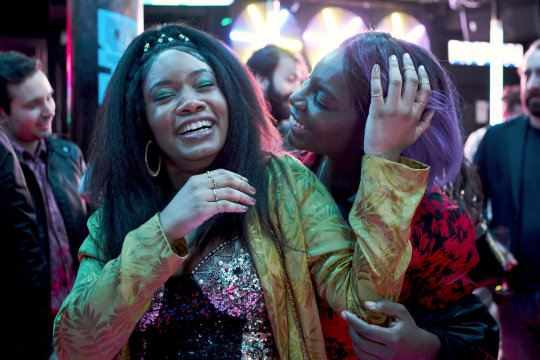
Weruche Opia and Michaela Coel in ‘I May Destroy You’.
* * *
Simply put, Promising Young Woman is a movie about a woman seeking revenge against predatory men. Except nothing about it is simple. Revenge movies have existed for aeons, and we’ve rooted for many promising young (mostly white) women before Carey Mulligan’s Cassie (recently: Jen in Coralie Fargeat’s Revenge, Noelle in Natalia Leite’s M.F.A.). But in Promising Young Woman, the victim is not alive to seek revenge, so it becomes Cassie’s single-minded crusade. Mercifully, we never see the gang-rape that sparks Cassie’s mission. But we do see a daring, fatal subversion of the notion of a happy ending—and this is what has audiences of Emerald Fennell’s jaw-dropping debut divided.
“For me, being a survivor, the point is to survive,” Jourdain Searles tells me. The New York-based critic, screenwriter, comedian—and host of Netflix’s new Black Film School series—says the presence of death in Promising Young Woman is the problem. “One of the first times I spoke openly about [my assault], I made the decision that I didn’t want to go to the police, and I got a lot of judgment for that,” she says. “So watching Promising Young Woman and seeing the police as the endgame is something I’ve always disagreed with. I left thinking, ‘How is this going to help?’”
“I feel like I’ve got two hats on,” says Terri White, the London-based editor-in chief of Empire magazine, and the author of a recently published memoir, Coming Undone. “One of which is me creating a magazine for a specific film-loving audience, and the other bit of me, which has written a book about trauma, specifically about violence perpetrated against the body. They’re not entirely siloed, but they are two distinct perspectives.”
White loved both Promising Young Woman and I May Destroy You, because they “explode the myth of resolution and redemption”. She calls the ending of Promising Young Woman “radical” in the way it speaks to the reality of what happens to so many women. “I was thinking about me and women like me, women who have endured violence and injury or trauma. Three women every week are still killed [in the UK] at the hands of an ex-partner, or somebody they know intimately, or a current partner. Statistically, any woman who goes for some kind of physical confrontation in [the way Cassie does] would end up dying.”
She adds: “I felt like the film was in service to both victims and survivors, and I use the word ‘victims’ deliberately. I call myself a victim because I think if you’ve endured either sexual violence or physical violence or both, a lot of empowering language, as far as I’m concerned, doesn’t reflect the reality of being a victim or a survivor, whichever way you choose to call yourself.” This point has been one many have disagreed on. In a way, that makes sense—no victim or survivor can be expected to speak to anyone else’s experience but their own.

Carey Mulligan and Emerald Fennell on the set of ‘Promising Young Woman’.
Likewise, there is no right or wrong way to feel about this film, or any film. But a question that arises is, well, should everyone have to see a film to figure that out? And should victims and survivors of sexual violence watch this film? “I have definitely been picky about who I’ve recommended it to,” Courtney Mayhew says. “I don’t want to put a friend in harm’s way, even if that means they miss out on something awesome. It’s not worth it.”
Mayhew is a New Zealand-based international film publicist, and because of her country’s success in controlling Covid 19, she is one of the rare people able to experience Promising Young Woman in a sold-out cinema. “It was palpable. Everyone was so engaged and almost leaning forwards. There were a lot of laughs from women, but it was also a really challenging setting. A lot of people looking down, looking away, and there was a girl who was crying uncontrollably at the end.”
“Material can be very triggering,” White agrees. “It depends where people are personally in their journey. When I still had a lot of trauma I hadn’t worked through in my 20s, I found certain things very difficult to watch. Those things are a reality—but people can make their own decisions about the material they feel able to watch.”
It’s about warning, and preparation, more than total deprivation, then? “I believe in giving people information so they can make the best choice for themselves,” White says. “But I find it quite reductive, and infantilizing in some respects, to be told broadly, ‘Women who have experienced x shouldn’t watch this.’ That underestimates the resilience of some people, the thirst for more information and knowledge.” (This point is clearly made in this meticulous, awe-inspiring list by Jenn, who is on a journey to make sense of her trauma through analysis of rape-revenge films.) But clarity is crucial, particularly for those grappling with unresolved issues.
Searles agrees Promising Young Woman can be a difficult, even unpleasant watch, but still one with value. “As a survivor it did not make me feel good, but it gave me a window into the way other people might respond to your assault. A lot of the time [my friends] have reacted in ways I don’t understand, and the movie feels like it’s trying to make sense of an assault from the outside, and the complicated feelings a friend might have.”
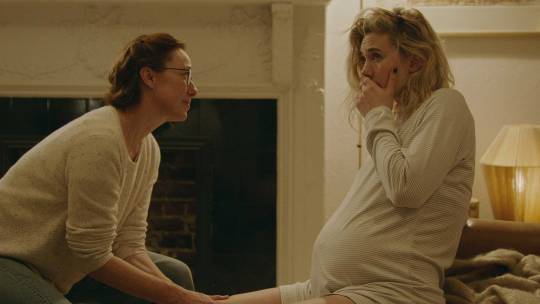
Molly Parker and Vanessa Kirby in ‘Pieces of a Woman’.
* * *
A newborn dies. A character is brutally violated. A population is tortured. To be human is to bear witness to history, but it’s still painful when that history is yours, or something very close to it. “Some things are hard to watch because you relate to them,” Searles explains. “I find mother! hard to watch, and there’s no actual sexual assault. But I just think of sexual assault and trauma and domestic abuse, even though the film isn’t about that. The thing is, you could read an academic paper on patriarchy—you don’t need to watch it on a show [or in a film] if you don’t want to.”
White agrees: “I’ve never been able to watch Nil by Mouth, because I grew up in a house of domestic violence and I find physical violence against women on screen very hard to watch. But that doesn’t mean I think the film shouldn’t be shown—it should still exist, I’ve just made the choice not to watch it.” (Reader, since our conversation, she watched it. At 2:00am.)
“I know people who do not watch Promising Young Woman or The Handmaid’s Tale because they work for an NGO in which they see those things literally in front of their eyes,” Mayhew says. “It could be helpful for someone who isn’t aware [of those issues], but then what is the purpose of art? To educate? To entertain? For escapism? It’s probably all of those.”
Importantly, how much weight should an artist’s shoulders carry, when it comes to considering the audiences that will see their work? There’s a general agreement among my interviewees that, as White says, “filmmakers have to make the art that they believe in”. I don’t think any film lover would disagree, but, suggests Searles, “these films should be made with survivors in mind. That doesn’t mean they always have to be sensitive and sad and declawed. But there is a way to be provocative, while leaning into an emotional truth.”

Madeleine Sims-Fewer in ‘Violation’.
Violation, about which I’ll say little here since it is yet to screen at SXSW (ahead of its March 25 release on Shudder) is not at all declawed, and is certainly made with survivors in mind—in the sense that in life, unlike in movies, catharsis is very seldom possible no matter how far you go to find it. On Letterboxd, many of those who saw Violation at TIFF and Sundance speak of feeling represented by the rape-revenge plot, writing: “One of the most intentionally thought out and respectful of the genre… made by survivors for survivors” and “I feel seen and held”. (Also: “This movie is extremely hard to watch, completely on purpose.”)
“Art can do great service to people,” agrees White, “If, by consequence, there is great service for people who have been in that position, that’s a brilliant consequence. But I don’t believe filmmakers and artists should be told that they are responsible for certain things. There’s a line of responsibility in terms of being irresponsible, especially if your community is young, or traumatised.”
Her words call to mind Bradley Cooper’s reboot of A Star is Born, which many cinephiles knew to be a remake and therefore expected its plot twist, but young filmgoers, drawn by the presence of Lady Gaga, were shocked (and in some cases triggered) by a suicide scene. When it was released, Letterboxd saw many anguished reviews from younger members. In New Zealand, an explicit warning was added to the film’s classification by the country’s chief censor (who also created an entirely new ‘RP18’ classification for the Netflix series 13 Reasons Why, which eventually had a graphic suicide scene edited out two years after first landing on the streaming service).
“There is a duty of care to audiences, and there is also a duty of care to artists and filmmakers,” says Mayhew. “There’s got to be some way of meeting in the middle.” The middle, perhaps, can be identified by the filmmaker’s objective. “It’s about feeling safe in the material,” says Mia Bays of the Birds’ Eye View film collective, which curates and markets films by women in order to effect industry change. “With material like this, it’s beholden on creatives to interrogate their own intentions.”
Filmmaker Shatara Michelle Ford is “forever interrogating” ideas of power. Their debut feature, Test Pattern, deftly examines the power differentials that inform the foundations of consent. “As an artist, human, and person who has experienced all sorts of boundary violation, assault and exploitation in their life, I spend quite a lot of time thinking about power… It is something I grapple with in my personal life, and when I arrive in any workplace, including a film set.”
In her review of Test Pattern for The Hollywood Reporter, Searles writes, “This is not a movie about sexual assault as an abstract concept; it’s a movie about the reality of a sexual assault survivor’s experience.” Crucially, in a history of films that deal largely with white women’s experiences, Test Pattern “is one of the few sexual-assault stories to center a Black woman, with her Blackness being central to her experience and the way she is treated by the people around her.”
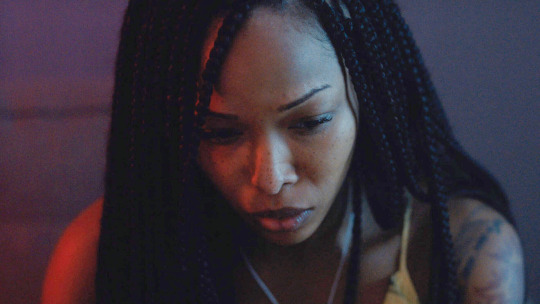
Brittany S. Hall in ‘Test Pattern’.
* * *
Test Pattern follows the unfolding power imbalance between Renesha (Brittany S. Hall) and her devoted white boyfriend Evan (Will Brill), as he drives her from hospital to hospital in search of a rape kit, after her drink was spiked by a white man in a bar who then raped her. Where Promising Young Woman is a millennial-pink revenge fantasy of Insta-worthy proportions, Test Pattern feels all too real, and the cops don’t come off as well as they do in the former.
Ford does something very important for the audience: they begin the film just as the rape is about to occur. We do not see it at this point (we do not really ever see it), but we know that it happened, so there’s no chance that, somewhere deeper into the story, when we’re much more invested, we’ll be side-swiped by a sudden onslaught of sexual violence. In a way, it creates a safe space for our journey with Renesha.
It’s one of many thoughtful decisions made by Ford throughout the production process. “I’m in direct conversation with film and television that chooses to depict violence against women so casually,” Ford tells me. “I intentionally showed as little of Renesha’s rape as humanly possible. I also had an incredibly hard time being physically present for that scene, I should add. What I did shoot was ultimately guided by Renesha’s experience of it. Shoot only what she would remember. Show only what she would have been aware of.
“But I also made it clear that this was a violation of her autonomy, by allowing moments where we have an arm’s length point of view. I let the camera sit with the audience, as I’m also saying, as the filmmaker, this happened, and you saw enough of it to know. This, for me, is a larger commentary on how we treat victims of assault and rape. I do not believe for one goddamn minute that we need to see the actual, literal violence to know what happened. When we flagrantly replicate the violence in film and television, we are supporting the cultural norm of needing ‘all of the evidence’—whatever that means—to ‘believe women’.”
Ford’s intentional work in crafting the romance and unraveling of Test Pattern’s leading couple pays off on screen, but their stamp as an invested and careful director also shows in their work with Drew Fuller, the actor who played Mike, the rapist. “It’s a very difficult role, and I’m grateful to him for taking it so seriously. When discussing and rendering the practice and non-practice of consent intentionally, I found it helpful to give it a clear definition and provide conceptual insight.
“I sent Drew a few articles that I used as tools to create a baseline understanding when it comes to exploring consent and power on screen. At the top of that list was Lili Loofbourow’s piece, The female price of male pleasure and Zhana Vrangalova's Teen Vogue piece, Everything You Need to Know about Consent that You Never Learned in Sex Ed. The latter in my opinion is the linchpin. There’s also Jude Elison Sady Doyle’s piece about the whole Aziz Ansari thing, which is a great primer.”

Sidney Flanigan in ‘Never Rarely Sometimes Always’.
Even when a filmmaker has given Ford’s level of care and attention to their project, what happens when the business end of the industry gets involved in the art? As we well know, marketing is a film’s window dressing. It has one job: to get eyeballs into the cinema. It can’t know if every viewer should feel safe to enter.
It would be useful, with certain material, to know how we should watch, and with whom, and what might we need in the way of support coming out. Whose job is it to provide this? Beyond the crude tool of an MPAA rating (and that’s a whole sorry tale for another day), there are many creative precautions that can be taken across the industry to safeguard a filmgoer’s experience.
Mayhew, who often sees films at the earliest stages (sometimes before a final cut, sometimes immediately after), speaks to journalists in early screenings and ensures they have the tools to safely report on the topics raised. In New Zealand, reporters are encouraged to read through resources to help them guide their work. Mayhew’s teams would also ensure journalists would be given relevant hotline numbers, and would ask media outlets to include them in published stories.
“It’s not saying, ‘You have to do this’,” she explains, “It’s about first of all not knowing what the journalist has been through themselves, and second of all, [if] they are entertainment reporters who haven’t navigated speaking about sexual assault, you only hope it will be helpful going forward. It’s certainly not done to infantilize them, because they’re smart people. It’s a way to show some care and support.”
The idea of having appropriate resources to make people feel safe and encourage them to make their own decisions is a priority for Bays and Birds’ Eye View, as well. The London-based creative producer and cultural activist stresses the importance of sharing such a viewing experience. “It’s the job of cinemas, distributors and festivals to realize that it might not be something the filmmaker does, but as the people in control of the environment it’s our job to give extra resources to those who want it,” says Bays. “To give people a safe space to come down from the experience.”
Pre-pandemic, when Birds’ Eye View screened Kitty Green’s The Assistant, a sharp condemnation of workplace micro-aggressions seen through the eyes of one female assistant, they invited women who had worked for Harvey Weinstein. For a discussion after Eliza Hittman’s coming-of-ager Never Rarely Sometimes Always, abortion experts were able to share their knowledge. “It’s about making sure the audience knows you can say anything here, but that it’s safe,” Bays explains. “It’s kind of like group therapy—you don’t know people, so you’re not beholden to what they think about you. And in the cinema people aren’t looking at you. You’re speaking somewhat anonymously, so a lot of really important stuff can come out.”
The traditional movie-going experience, involving friends, crowds and cathartic, let-loose feelings, is still largely inaccessible at the time of writing. Over the past twelve months we’ve talked plenty about preserving the magic of the big screen experience, but it’s about so much more than the romanticism of an art form; it’s also about the safety that comes from a feeling of community when watching potentially upsetting movies.
“The going in and coming out parts of watching a film in the cinema are massively important, because it’s like coming out of the airlock and coming back to reality,” says Bays. “You can’t do that at home. Difficult material kind of stays with you.” During the pandemic, Birds’ Eye View has continued to provide the same wrap-around curatorial support for at-home viewers as they would at an in-person event. “If we’re picking a difficult film and asking people to watch it at home, we might suggest you watch it with a friend so you can speak about it afterwards,” Bays says.
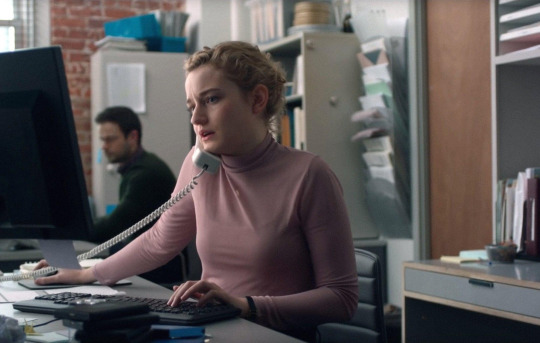
Julia Garner in ‘The Assistant’.
But, then, how can we still find this sense of community without the physical closeness? “It’s no good waiting for [the internet] to become kind,” she says. “Create your own closed spaces. We do workshops and conversations exclusively for people who sign up to our newsletter. In real-life meetings you can go from hating something to hearing an eloquent presentation of another perspective and coming round to it, but you need the time and space to do that. This little amount of time gives you a move towards healing, even if it’s just licking some wounds that were opened on Twitter. But it could be much deeper, like being a survivor and feeling very conflicted about the film, which I do.”
Conflict is something that Searles, the film critic, knows about all too well in her work. “Since I started writing professionally, I almost feel like I’m known for writing about assault and rape at this point. I do write about it a lot, and as a survivor I continue to process it. I’ve been assaulted more than once so I have a lot to process, and so each time I’m writing about it I’m thinking about different aspects and remnants of those feelings. It can be very cathartic, but it’s a double-edged sword because sometimes I feel like I have an obligation to write about it too.”
There is also a constant act of self-preservation that comes with putting so much of yourself on the internet. “I often get messages from people thanking me for talking about these subjects with a deep understanding of what they mean,” Searles says. “I really appreciate that. I get negative messages about a lot of things, but not this one thing.”

Michaela Coel in ‘I May Destroy You’.
* * *
With such thoughtful approaches to heavy content, it feels like we’re a long way further down the road from blunt tools like content and trigger warnings. But do they still have their place? “It’s just never seemed appropriate to put trigger warnings on any of our reviews or features,” White explains. “We have a heavy male readership, still 70 percent male to 30 percent female. I’m conscious we’re talking to a lot of men who will often have experienced violence themselves, but we don’t put any warnings, because we are an adult magazine, and when we talk about violence in, say, an action film, or violence that is very heavily between men, we don’t caveat that at all.”
Bays, too, is sceptical of trigger warnings, explaining that “there’s not much evidence [they] actually work. A lot of psychologists expound on the fact that if people get stuck in their trauma, you can never really recover from PTSD if you don’t at some point face your trauma.” She adds: “I’m a survivor, and I found I May Destroy You deeply, profoundly triggering, but also cathartic. I think it’s more about how you talk about the work, rather than having a ‘NB: survivors of sexual abuse or assault shouldn’t see this’.”
“It’s important to give people a feel of what they’re in for,” argues Searles. “A lot of people who have dealt with suicide ideation would prefer that warning.” While some worry that a content warning is effectively a plot spoiler, Searles disagrees. “I don’t consider a content warning a spoiler. I just couldn’t imagine sitting down for a film, knowing there’s going to be a suicide, and letting it distract me from the film.” Still, she acknowledges the nuance. “I think using ‘self-harm’ might be better than just saying ‘suicide’.”
Mayhew shared insights on who actually decides which films on which platforms are preceded with warnings—turns out, it’s a bit messy. “The onus traditionally has fallen on governmental censorship when it comes to theatrical releases,” she explains. “But streamers can do what they want, they are not bound by those rules so they have to—as the distributors and broadcasters—take the government’s censors on board in terms of how they are going to navigate it.
“The consumer doesn’t know the difference,” she continues, “nor should they—so it means they can be watching The Crown on Netflix and get this trigger warning about bulimia, and go to the cinema the next day and not get it, and feel angry about it. So there’s the question of where is the responsibility of the distributor, and where is the responsibility of the audience member to actually find out for themselves.”
The warnings given to an audience member can also vary widely depending where they find themselves in the world, too. Promising Young Woman, for example, is rated M in Australia, R18 in New Zealand, and R in the United States. Meanwhile, the invaluable Common Sense Media recommends an age of fifteen years and upwards for the “dark, powerful, mature revenge comedy”. Mayhew says a publicist’s job is “to have your finger on the pulse” about these cultural differences. “You have to read the overall room, and when I say room I mean the culture as a whole, and you have to be constantly abreast of things across those different ages too.”
She adds: “This feeds into the importance of representation right at the top of those boardrooms and right down to the film sets. My job is to see all opinions, and I never will, especially because I am a white woman. I consider myself part of the LGBT community and sometimes I’ll bring that to a room that I think has been lacking in that area, when it comes to harmful stereotypes that can be propagated within films about LGBT people. But I can’t bring a Black person’s perspective, I cannot bring an Indigenous perspective. The more representation you have, the better your film is going to be, your campaign is going to be.”
Bays, who is also a filmmaker, agrees: representation is about information, and working with enough knowledge to make sure your film is being as faithful to your chosen communities as possible. “As a filmmaker, I’d feel ill-informed and misplaced if I was stumbling into an area of representation that I knew nothing about without finding some tools and collaborators who could bring deeper insight.”

Carey Mulligan and Bo Burnham in ‘Promising Young Woman’.
This is something Ford aimed for with Test Pattern’s choice of crew members, which had an effect not just on the end product, but on the entire production process. “I made sure that at the department head level, I was hiring people I was in community with and fully saw me as a person, and me them,” they say. “In some ways it made the experience more pleasurable.” That said, the shoot was still not without its incidents: “These were the types of things that in my experience often occur on a film set dominated by straight white men, that we're so accustomed to we sometimes don’t even notice it. I won’t go into it but what I will say is that it was not tolerated.”
Vital to the telling of the story were the lived experiences that Ford and their crew brought to set. “As it applies to the sensitive nature of this story, there were quite a few of us who have had our own experiences along the spectrum of assault, which means that we had to navigate our own internal re-processing of those experiences, which is hard to do when we’re constructing an experience of rape for a character.
“However, I think being able to share our own triggers and discomfort and context, when it came to Renesha’s experience, made the execution of it all the better. Again, it was a pleasure to be in community with such smart, talented and considerate women who each brought their own nuance to this film.”
* * *
Thinking about everything we’ve lived through by this point in 2021, and the heightened sensitivity and lowered mental health of film lovers worldwide, movies are carrying a pretty heavy burden right now: to, as Jane Fonda said at the Golden Globes, help us see through others’ eyes; also, to entertain or, at the very least, not upset us too much.
But to whom does film have a responsibility, really? Promising Young Woman’s writer-director Emerald Fennell, in an excellent interview with Vulture’s Angelica Jade Bastién, said that she was thinking of audiences when she crafted the upsetting conclusion.
What she was thinking was: a ‘happy’ ending for Cassie gets us no further forward as a society. Instead, Cassie’s shocking end “makes you feel a certain way, and it makes you want to talk about it. It makes you want to examine the film and the society that we live in. With a cathartic Hollywood ending, that’s not so much of a conversation, really. It’s a kind of empty catharsis.”
So let’s flip the question: what is our responsibility, as women and allies, towards celebrating audacious films about tricky subjects? The marvellous, avenging blockbusters that once sucked all the air out of film conversation are on pause, for now. Consider the space that this opens up for a different kind of approach to “must-see movies”. Spread the word about Test Pattern. Shout from the rooftops about It’s A Sin. Add Body of Water and Herself and Violation to your watchlists. And, make sure the right people are watching.
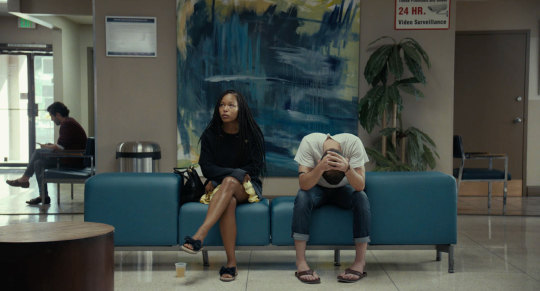
Brittany S. Hall and Will Brill in ‘Test Pattern’.
I asked my interviewees: if they could choose one type of person they think should see Promising Young Woman, who would it be? Ford has not seen Fennell’s film, but “it feels good to have my film contribute to a larger discourse that is ever shifting, ever adding nuance”. They are very clear on who can learn the most from their own movie.
“A white man is featured so prominently in Test Pattern as a statement about how white people and men have a habit of centering themselves in the stories of others, prioritizing their experience and neglecting to recognize those on the margins. If Evan is triggering, he should be. If your feelings about Evan vacillate, it is by design.
“‘Allies’ across the spectrum are in a complicated dance around doing the ‘right thing’ and ‘showing up’ for those they are ostensibly seeking to support,” Ford continues. “Their constant battle is to remember that they need to be centering the needs of those they were never conditioned to center. Tricky stuff. Mistakes will be made. Mistakes must be owned. Sometimes reconciliation is required.”
It is telling that similar thoughts emerged from my other interviewees regarding Promising Young Woman’s ideal audience, despite the fact that none of them was in conversation with the others for this story. For that reason, as we come to the end of this small contribution to a very large, ongoing conversation, I’ve left their words intact.
White: I think it’s a great film for men.
Searles: I feel like the movie is very much pointed at cisgender heterosexual men.
Mayhew: Men.
White: We’re always warned about the alpha male with a massive ego, but we’re not warned about the beta male who reads great books, listens to great records, has great film recommendations. But he probably slyly undermines you in a completely different way. Anybody can be a predator.
Searles: The actors chosen to play these misogynist, rape culture-perpetuating men are actors we think of as nice guys.
White: We are so much more tolerant of a man knocking the woman over the head, dragging her down an alley and raping her, because we understand that. But rape culture is made up of millions of small things that enable the people who do it. We are more likely to be attacked in our own homes by men we love than a stranger in the street.
Mayhew: The onus should not fall on women to call this out.
Searles: It’s not just creeps, like the ones you see usually in these movies. It’s guys like you. What are you going to do to make sure you’re not like this?
Related content
Sex Monsters, Rape Revenge and Trauma: a work-in-progress list
Rape and Revenge: a list of films that fall into, and play with, the genre
Unconsenting Media: a search engine for sexual violence in broadcasting
Follow Ella on Letterboxd
If you need help or to talk to someone about concerns raised for you in this story, please first know that you are not alone. These are just a few of the many organizations and resources available, and their websites include more information.
US: RAINN (hotline 0800 656 HOPE); LGBT National Help Center; Pathways to Safety; Time’s Up.
Canada: Canadian Association of Sexual Assault Centers—contacts by province and territory
UK/Ireland: Mind; The Survivors Trust (hotline 08088 010818); Rape Crisis England and Wales
Europe: Rape Crisis Network Europe
#promising young woman#violation#emerald fennell#carey mulligan#ella kemp#shatara michelle ford#test pattern#women directors#female director#directed by women#non binary director#non binary filmmaker#lgbt#trigger#trigger warning#content warning#censorship#empire magazine#letterboxd#empire online#terri white#courtney mayhew#film publicity#film marketing#birds eye view
47 notes
·
View notes
Text
The way... that Fate/Zero approaches the topic of pain and trauma and suffering is so ....
Apologies if this comes off as pretentious I have to try to write my thoughts down
The reason why the Joker was funny to me for the first half before my blood pressure started raising was because they were hitting the nail on the head far too much by insisting that all of it was because of untreated mental illness. With a shot of the Joker circling “mental illness” on a notepad full of his other ramblings, with a shot of a sign that says “Smile/be happy” or whatever, with the juxtaposition of his job as a clown but his own mental illness issues being just hammered into you (But doctor, I am Pagliacci!). It was too much. It was too on the head, not subtle at all, and such an inaccurate, like... self-centered narrative of mental illness that it was hilarious. The kind of ideology that purveys people to be unable to recover from mental illness at all and they’re just “like that” and you don’t have to do anything to try to make your situation better.
It’s absolutely absurd, and absurdity is funny.
Fate/Zero has the same thing going on. We see firsthand how Kiritsugu has a history of trauma and pain and mental illness going on but he does absolutely NOTHING to try to change it (and Irisviel, unfortunately, supports him not changing it because she doesn’t KNOW anything other than the ideology he’s taught her). Kiritsugu is so deep in his self-centered narrative of needing to kill all the bad guys so all the good guys can survive (a very black and white view of the world) and that the greater good is what matters the most (again very un-nuanced) but in the setting of Fate/Zero we see him actively think about running away and then get convinced not to by a woman who he taught himself to reinforce his bad ideology. That’s the healthiest thought he had had before digging his heels in again. And time and time again we see how he fucks up his relationship with Saber because he has such a hang up over her being King at all that he refuses to try to talk to her or explain anything or even just express himself or his feelings to her and it’s just him self-sabotaging and saying “well it has to be like this” over and over again even though he’s aware there’s a way out. The absurdity of his choice of actions is funny.
Kariya doesn’t have the exact same narrative, but it’s similar - his goal is actually noble, it’s a great goal, but his insistence in doing it in the way his family has going on rather than trying to subvert it at all and also hyperfocusing on saving Aoi and Rin as well instead of just Sakura has narrowed his point of view to a sliver of what he was previously capable of. His affection towards Aoi becomes an obsession where he refuses to think of her point of view or feelings, and the worms are likely to blame for that since he isn’t of a good state of mind for like NINETY PERCENT of the novel. But again it’s just so hammered with him being hit from all angles constantly that it can’t be read as tragedy anymore, like, ... you are full of fucking worms and they’re making you insane. His case becomes so absurd that it’s funny.
Kirei is already absurd in the first place. We don’t really get the bit of information that elaborates on why he’s unable to experience happiness in F/Z, but you can understand later if you look into it that he’s a child soldier, an Executor for the Church at a young age, and so his brain is rewired effectively for him to be unable to process joy/rewards as anything other than Others’ Pain. He has no fucking idea that this is because he’s been an Executor for the church or that he has mental illness at all. He literally simply believes he’s built this way. And as we’ve said before he has a totally inappropriate, misunderstood parasocial relationship to Kiritsugu where he believes Kiritsugu’s pain and emptiness is the same as his own, and Kiritsugu is terrified of Kirei, and yet Kirei seeks him out as though he wants to sit down and have a drink with him to talk but the only way they can meet each other is if they were going to kill each other. and all Kirei Actually wants to do is talk and understand Kiritsugu emotionally. it’s. Beyond insane. It’s absurd. It doesn’t make any sense. And so his obsession becomes funny.
What happens to Saber isn’t really very funny if only because she really is a victim of her own circumstances. It is absurd what is happening to her, though. Being told she’s not a real King despite all of the suffering she’s gone through. Being ignored by her master and used like a tool despite her having a better grasp of the situation strategically. Having a bond with her master’s wife more mutually fulfilling than he does. Being told by Gilgamesh that she’s going to become his wife and then being shot at with weapons when she says ‘no’. This is the case where it’s not her fault that this is happening, but the fact that it’s happening at all makes it so absurd that someone’s response may be to laugh and say “WHY IS THIS HAPPENING??? BRO WTF IS SOMETHING GOING ON WHY DO I DESERVE THIS PUNISHMENT WHAT DID I EVEN DOOOO” so to speak (lol).
And then amongst Fate Zero you literally have a coming of age story where Waver is growing up and learning to have more self-esteem and then crying and being traumatized but being emotionally supported through his trauma and the juxtaposition of his story, which is fruitful, to the sheer repeat-tragedies and chosen self-serving idiocy of almost the rest of the entire cast.... Again... the absurd becomes hilarious. “One foot in the darkness, and the other foot in a hello kitty roller skate”.
So when I say “Fate Zero is a comedy” or it’s a gay art house series or whatever, what I mean is this: the framing of the series as an intense-straight-man-pain-trauma-suffering-fest compared with the course of the characters’ actions being presented as ‘what had to be done’ despite the very real options they could’ve taken to avoid, like, anything that had happened if they had simply tried to improve themselves or the situation at hand at all, creates a sense of absurdity and disbelief strong enough that you can’t help but laugh at it all and laugh at how obnoxiously stupid the cast is for chosing to dig their heels in, and the writer, Urobuchi, for expecting us to take this seriously in the narrow lense he wants us to read and interpret it in. I realize the previous sentence is kind of a run on but I hope my ideas can be understood from it.
12 notes
·
View notes
Text
Servamp Tarot Analysis: Kamiya Tsurugi
I’ve decided to do an analysis of the tarot cards in Servamp. Many of the meanings are taken straight from the books they were found in because I feel they explain the meaning of the trumps better than my own words could. I’m looking not only at the official tarot cards assigned to characters, but also headcanon unofficial cards that may have been quietly assigned by the author.
First up is Kamiya Tsurugi. The official card assigned to him in canon is The Hanged Man. In this analysis I will also share headcanons of how he has been unofficially assigned the cards of: Justice and Death.
The Hanged Man #12
Number: XII
Alternative Name: The Traitor
Numerology Link: III, The Empress
Astrological Sign: Neptune
Element: Water
Hebrew Letter: Mem
Symbol: Water and the Oceans
---------------------
The Hanged Man XII
The Hanged Man Key Meanings:
Transition
Waiting
Sacrifice
Enlightenment
Upright Meaning:
“Events are not moving with speed, but all you can do is wait patiently in the knowledge that the universe has its own plan. The card can also indicate that you may have made sacrifices just now and are eager to see rewards. Unfortunately, you cannot force an outcome that fits with your timetable. There are many other factors about which you can have no knowledge or influence. Therefore, you may also expect delays to travel plans and projects… On a creative level this card appears frequently when a person is feeling frustration with their progress… Another message from the Hanged Man is to try to see things from a new angle.” (Dean).
“In readings the Hanged Man bears the message of independence. Like the Fool, which signified doing what you sensed was best, even if other people thought it foolish, the Hanged Man indicates being who you are, even if others think you have everything backwards. It symbolizes the feeling of being deeply connected to life and can mean a peace that comes after some difficult trial.” (Pollack.).
Feeling trapped
Confined
Self-limiting
Uncertainty
Lack of Direction
Needing Release
Letting Go
Reversed Meaning:
“The Hanged Man reversed can be a sign of rigid thinking and martyrdom. You may need to revise your expectations; what you think you want may not be possible. In this position, the card asks you if you are hanging on to a fantasy that may make you a victim rather than a victor. Take another view and liberate yourself from a contract or other obligation that cannot offer you what you want.” (Dean).
“The trump reversed indicates an inability to get free of social pressure. Rather than listen to our inner selves we do what others expect or demand of us. Our awareness of life always remains second-hand, never a direct experience but only a series of stereotypes, like the person who models his or her behavior on the orders of parents and the actions of movie stars. The card reversed can also mean fighting your inner self in some way. It can mean the person who tries to deny some basic part of himself or simply the person who cannot accept reality and who in some way or other is constantly battling life.” (Pollack.).
Discontentment
Apathy
Disinterest
Stagnation
Impulsiveness
Negative Patterns
Detachment
The Hanged Man understands that his position is a sacrifice he needed to make in order to progress forward. The time he spends dangling from the tree will not be wasted on his journey. The hanging is not death, but life in stillness. It could be a repentance for past wrongdoings or even a calculated step back to rethink the path he will take once he continues on with his journey. If an approach isn’t working then look at things from a different angle to gain a new perspective. This card is one that tells its reader that waiting and suspension are sometimes what you need to do in order to achieve success. Sometimes action is not needed, and one needs to wait patiently for the proper opportunity.
The Message of the Hanged Man:
Use your time wisely.
The Hanged Man & Numerology:
“TAROT SYMBOLISM: Key 12 The Hanged Man. The keyword for the Hanged Man is reversal. The corresponding symbol means oasis, sea, or water. According to the alchemists, water was the basis of all life, the fluid substance that solidified into physical forms… Water was the first mirror in which the reflection always appears upside down. The significance of this card is that things are not as they appear on the surface. You must look beneath the surface for true understanding. The man is suspended by his foot, like a pendulum at rest. His crossed legs form a figure 4, indicative of key 4 Reason. His elbows and head form a triangle with the point down which is an ancient symbol for water. The Hanged Man represents a person who is poised in consciousness and under perfect control… He sees trouble in the world--people unhappy in marriage, in trouble financially and lost because they have no goals--and he knows it is because they all see things upside down. Yet they look at him and think that he is the one who is crazy. The Hanged Man’s philosophy sets him apart from the crowd and, at the same time, brings him peace of mind and perfect contentment.” (Javane and Bunker.) [Emphasis mine.]
---------------------
Looking at these meanings and ideas I find that Tsurugi very strongly if not perfectly embodies the Hanged Man.
I speculate that for a majority of the C3 arc Tsurugi is in the position of the reversed Hanged Man. The lines that really stood out to me while researching this were, “Rather than listen to our inner selves we do what others expect or demand of us.” and “In this position, the card asks you if you are hanging on to a fantasy that may make you a victim rather than a victor.” because they seem to fit Tsurugi so well. Tsurugi clings to Touma and the idea of family he idealized Touma as being. Tsurugi also does what others expect of him, and before his breaking away from Touma just did what others wanted him to do. Even in the TAROT SYMBOLISM section that I highlighted the line about things not appearing as they seem on the surface resonated with me about Tsurugi because despite Tsurugi’s smiles on the surface inwardly he has a lot of trauma.
The symbolism the Hanged Man has with the connections to water, the oceans, and the planet Neptune also tie into together with Tsurugi. Water as an element is related to the Cups suit. Cups/Water has the meaning of “I feel”; the suit focuses on emotions and relationships. The planet Neptune, the Roman name for Poseidon the Greek god of the seas, holds the symbolic meanings of: dreams, intuition, and imagination. Which negatively connects to Tsurugi and his inability to metaphorically grow up, dreams and imagination being viewed as childish, but also to his magic Neverland. In the series we’ve seen Tsurugi be visually connected to water rather directly. Both in his drowning before being saved by The Mother/Freya in Ch. 56 “A Windowless Room”/Ch. 57 “Born” and also in the bonus chapter Ch. 57.5 “The Person Searching for the Key” where Tsurugi is underwater behind his locked door. Tsurugi is also an incredibly emotional person, and has worked on coming to terms with his emotions and what he really feels instead of just doing as other people tell him too.
---------------------
Tsurugi’s/The Hanged Man’s Dilemma:
A great showing of Tsurugi and his dilemma of choosing between the upright and the reversed meaning of The Hanged Man is in Ch. 52 where Tsurugi is caught between Touma and Junichiro in making his decision to follow Touma’s orders or to heed to Junichiro’s words.
In Ch. 52 we have the scene where Junichirou and Touma are asking Tsurugi to come to a decision. Tsurugi is physically in the position of the Hanged Man, but he’s divided down the middle into a black side and a white side. On the black side where Touma asks him, “Are you going to ignore what I say again?” Tsurugi’s hair follows the course of gravity as if he were standing up, his long length of ribbon does as well, and his hood lays flat against his shoulder. Compare this to the white side, Junichiro’s side: the background is white and Tsurugi’s hair, hood, and ribbon follow the path of gravity that they naturally would if Tsurugi were hanging upside down. This choosing of Touma, and of the reversed meaning of the Hanged Man, allows readers to see that Tsurugi is not following the upright meaning of the Hanged Man, and that his trump has yet to be flipped to the upright position.
In the side by side comparison Tsurugi’s collar is black on Junichiro’s side and white on Touma’s, but when Tsurugi chooses Touma the collar is black. The collar represents both control and Tsurugi allowing others to make decisions for him. The removal of the collar in Ch. 74 represents Tsurugi taking control of his personal agency and decision making.
---------------------
Headcanon Tarot Analysis:
Tsurugi is directly portrayed as the Hanged Man in Ch. 50 “The Hanged Man”. The closest version visually of the Hanged Man as it is as a trump card is on the cover page of the chapter. Then we have another section in this chapter later on which portrays Tsurugi as both hero and criminal. Right before this Mahiru has just asked Tsurugi if he has been fighting to protect people all this time. Tsurugi denies this and instead tells Mahiru that to humans he is viewed as a hero, but to vampires he is viewed as a genocider.
What is fascinating is that visually he’s portrayed as physically being in the position of the hanged man, only as both lauded hero and condemned criminal. As the hero of humanity he’s in a upright Hanged Man position. As the criminal he is in a reversed Hanged Man position with a noose. Looking at the two side comparisons I feel that they both represent #11 Justice & #13 Death more so than the Hanged Man, “In the major arcana sequence, the Hanged Man falls after XI, Justice, and before XIII, Death. We had our values on trial in Justice, and now we must hold on until Death, when we can figuratively let go. Death brings transformation, while the Hanged Man prepares to make the sacrifice Death needs so he can move on.” (Dean)
Justice XI
Justice Key Meanings:
Fairness
Balance
Perception
Objectivity
With Tsurugi wearing a cape and a sword I feel it represents a reversed #11 Justice. Tsurugi’s hero is in the upright position for the Hanged Man, but in the reversed position for Justice. Trump XI portrays the personification of upright Justice on a throne with scales and a sword. Important to see is that the Justice trump is not blindfolded, her vision is clear. The scales held in her left hand represent favoring the deserving with the scales of mercy, and the upright sword in her right hand represents seeking retribution for past wrongs with the sword of retribution. The scales also symbolize the thought process put into making a judgement, and weighing both sides of a story. The sword symbolizes the action that results from judgement. The sword, when it is held upright, symbolizes success.
Tsurugi as a reversed Justice fits in many ways. Tsurugi, as an instrument for furthering Touma’s and C3’s plans, is furthering the goals of those that use him via corrupt justice. Vampires are captured we've seen, but are they given legal trials and do they have protected rights? From what we’ve seen of C3 I highly doubt it. Hence why he is in the position of reversed Justice. Tsurugi has often been connected to a sword, and his name can even mean “sword”, look at the sword of hero-Tsurugi. It is covered in blood, but Tsurugi’s arms are held behind his back. The blood on the sword is not boldly in your face, and is even a bit hidden behind Tsurugi and a speech bubble. Tsurugi does not hold the sword in his hand showing that he himself does not actively choose to to make any decisions with the sword, and instead I feel it represents Tsurugi's passivity and his following what others want and will of him. Later on we also see that when Touma manipulates Tsurugi with his spell power Tsurugi becomes blindfolded, and this is perhaps a symbolism of justice being both blind (traditionally) and blinded (corruption hiding the truth).
#11 Justice Reversed
“Reversed, the card indicates dishonesty with yourself and others. It shows an unwillingness to see the meaning of events and shows especially that you are missing some opportunity for a greater understanding of yourself and your life. In outer life it indicates dishonesty and unfair actions or decisions. Sometimes it is others who are unfair to us. The reversed meaning can refer also to unjust legal decisions or to bad treatment from someone. On the other hand we must not allow the suggestion of unfairness to act as an excuse for denying our own responsibility for what happens to us… ‘Nothing can save you but yourself.’” (Pollack.).
“Life goes out of balance as work, relationships, and money issues spiral out of control. A decision may go against you, so there may be dishonesty or a miscarriage of justice. You are treated unfairly, which is compounded by bad advice from a trusted individual. You are not able to speak your truth and feel overruled by those who don’t understand your predicament. It is important to find your voice and stay strong to your values- if you are in the right.” (Dean).
Death XIII
Death Key Meanings:
Decline
Rebirth
Transformations
Change
As the condemned criminal Tsurugi is in the reversed position of the Hanged Man, but he’s also in the upright position for Death. With Tsurugi wearing traditional black and white striped prisoner clothing and have a noose around his neck I feel this gives weight to the idea of connecting him to #13 Death. Tsurugi in this side comparison is on a scaffold. He wears the clothes of a criminal and he seems to be a minute away from hanging. Yet, the noose around his neck is loose. As the Hanged Man trump has told us, the Hanged Man is not going to die. Instead he is merely hanging around waiting. The trump card Death arrives after the Hanged Man as death follows a hanging. Only in the case of the Hanged Man this is a spiritual death and rebirth after a time of contemplation. The black and white colors Tsurugi wears are associated with Death in the thirteen trump. In the trump Death wears black armor and sits astride a white horse while holding a black and white flag in his left hand. The thirteen trump is associated with change, an extreme change in your life to be exact. When I read this page I see Tsurugi’s Reversed Justice representing who he is right now, and that his Upright Death represents that he needs to and will undergo a great change. Especially since the manga is written in Japanese and we read the pages from right to left.
#13 Death Upright
“In diviniatory readings Death signifies a time of change. Often, it indicates a fear of change. In its most positive aspect it shows a clearing away of old habits and rigidness to allow a new life to emerge. In its most negative aspect it indicates a crippling fear of physical death.” (Pollack.).
“Death brings ending and beginnings-sometimes all at once. This is a time of fast and deep transformation and an opportunity to let go of whatever you no longer need. Unlike card XX, Judgement, which signals a process of self-examination, Death’s impact is sudden and may be shocking. You have little control over external events when Death looms, but in time you will be able to see this sharp change in circumstances as a blessing. A break with the past-from relationships and friendships to work that is no longer satisfying-is the only way forward. In this sense, Death can be a release and a relief. Death, after all, is the ultimate reality check, and he leaves you with the bare bones, the truth.” (Dean).
---------------------
These are the views I have on Tsurugi and his tarot cards. I also thought about him perhaps having reference to the Ace of Swords, him being C3′s Ace and his name relating to a sword, but just decided to focus on the major arcana for now. Maybe I’ll do another post about that at a later date. I had fun writing this. I hope to make more posts like this in the future, but if I do they will likely be very, very sporadic.
References:
Dean, Liz. The Ultimate Guide to Tarot: A Beginner's Guide to the Cards, Spreads, and Revealing the Mystery of the Tarot. Fair Winds Press, 2015.
Javane, Faith, and Dusty Bunker. Numerology and the Divine Triangle. Whitford Press, 1997.
Pollack, Rachel. Seventy Eight Degrees of Wisdom A Book of Tarot Part 1: The Major Arcana. Aquarian Press, 1980.
33 notes
·
View notes
Text
Kindred Words are Key
Week 3: Black Women of the Past
By Keyyatta Bonds
To better organize my thoughts, I am going to layout my discussion points first (just so there’s a through-line):
1) Afrofuturism vs. Speculative Fiction
2) Reflection on BodyMinds, specifically how language choices and definitions guide a narrative
3) Hot Take about Kindred
After reading about Afrofuturism, (Black) speculative literature seems to be underneath its umbrella. The category itself doesn’t have many rules, as Schalk describes speculative literature as “allow[ing] us to imagine otherwise.” However, even though it seems boundless, in comparison to the realms described within Afrofuturism, it seems smaller and more compact to me. If you ask me for a particular point to make that distinction, I sadly could not tell you; but Afrofuturism seems to be a more complete encompassing of stories centered in Blackness. It may be the terms themselves as Afrofuturism’s name lends itself to its identity as a genre and (Black) speculative is very generic.
----
Schalk does a great job in the Introduction of BodyMinds in clearly defining her terms. Schalk, inadvertently, illuminated for me the faults of current literary evaluations and reviews. Not to get very English-majory, but a lot of descriptions used in storytelling and describing the stories thereafter are very static or fluff-filled. I would expect literary-minded folks to be more deliberate in how they relay, and especially, critique stories; but I have noticed that stories exploring ‘deep’ topics in fiction are often watered down to 2D descriptions OR overexplained and picked apart to the point that real messages get lost in the wordiness of it all. Moreover, if evaluations of a text go beyond the typical -isms, the relationships are explained very shallowly. To give a short example, Kindred could be described as a story about race and gender and racism – all of which are correct observations but provide no depth or intimacy within the story or its characters, which in my eyes, is doing it a grand disservice.
In this evaluation of the text, even though those topics can be seen as themes, it gives no clue to what characters are participating in these systems and the effects of these systems on the characters. Literary evaluations are meant to go that extra mile and provide a greater analysis of the text – but many people are attempting to discuss these topics without having (access to) the language to adequately support their ideas. [This line of thinking – in my mind – also greatly aligns with Schalk’s mention abut Barbara Christian’s approach to theory in that it does not have to be done in a certain way to “produce knowledge” and new idea do not need to be created but just looked at through a Black feminist lens.] I could get into my academia rant but I’ll save that for another day.
So, moving into Schalk’s definitions, I loved how she used and described bodymind. In lieu of Kindred, the word ‘bodymind’ perfectly gives way to what we already discuss as we analyze Black people and their relationship to slavery without the wordiness of it all. Schalk fills in that language gap and gives us the vocabulary to more adequately navigate the conversation without losing its sincerity. The word bodymind – alone – provides an intimacy and depth in relation to whatever character may be referenced. It more successfully explains how the two are connected and constantly interacting, even when we may think that an action – let’s take whippings for example – may only affect the body. It provides nuance to conversations and concepts we have likely discussed before, especially when talking about literature centered around the Black experience.
Traditionally, talking about slavery is already a large task, so to add psychological effects then generational trauma and so many other layers leads to an ever weaving web of conversations. The experiences are all connected but there’s a better way to describe the interconnectedness, which can lead into Schlack view on intersectionality. Her takes on these fairly new, but truly old, ideas is very refreshing – as I am finding a new and more effective way to discuss such heavy topics.
----
I am running out of words – but I had to touch on this. I absolutely despise, hate, cannot stand the white man saving Black woman narrative. I fully realize Kindred is much deeper than that and the focus is on Dana’s journey as a free Black woman now experiencing life as a slave – I get it and there’s a lot to unpack there. I am not trying to reduce the story to this one narrative at all. However comma, I could not focus on Dana because this white man is just taking over the story.
This is interesting to read because my friends and I have been recently trying to analyze why outspoken, “revolutionary,” smart Black women always end up in relationships with white men. Here’s my mini-theory: White men are the first, in that Black woman’s life, to acknowledge their words and talents over their looks; and for a Black woman, who is discouraged by her community like Dana, it is an overwhelmingly validating experience. The white man compliments their intellect from the very beginning, along with their initial attraction of course, but the white man is willing to listen to the Black woman’s story because they have no experience with it and appreciate a new perspective. (And we can see this in Kindred when Dana is trying to explain to Kevin the plantation dynamics and Kevin is not getting it until he arrives there with her.) The Black woman is over the moon that someone is listening to her thoughts and ideas and BOOM – they’re in a damn relationship just because they were appreciated. I need someone to do a case study because the correlation has got to be there.
Again, I have better takes on Kindred but that is something I wanted some outside perspective on.
10 notes
·
View notes
Text
Women in SPN—Seasons 2 and 3
Previously on Joy Obsesses over a Show That Creatively Expired in 2010
Tessa
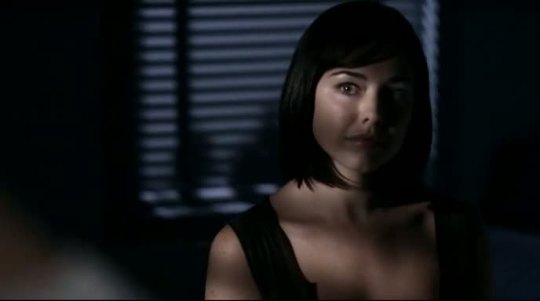
Introduced back when the Winchesters dodging the coffin actually qualified as an episode, she follows in Meg’s tracks by continuing to make monsters seem more approachable and less a malevolent force of nature. Starts off with a completely flat affect but gets annoyed with the Winchester bullshit real quick—a sure-fire sign of an SPN character with a brain. A powerful being capable of returning one’s memories by a smooch which is… convenient. As is the fact that bad guys keep using her for their ebul plans. Serves the typical secondary-character function of a springboard for a main guy’s development. Plants hints of the “natural order”, “destiny”, and “inevitability” which will become major themes down the road and be explored by characters with deeper writing.
Status: Alive as of s5
Importance: Minor, remembered primarily because she keeps popping up.
On her own: A nice addition to the lore.
Jo Harvelle
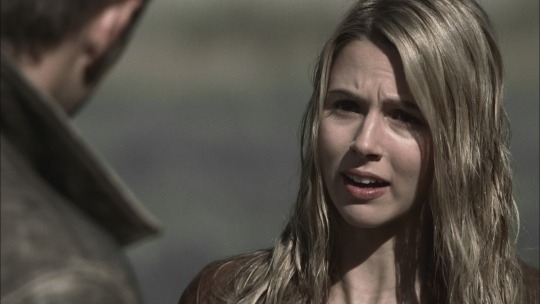
Originally Dean’s love interest until she got written out for the crime of having tits around the fandom’s husband. Driven by a wish to honor her dead father and become a hunter, she’s held back by the unfortunate fact of not being all that good at it. Cheerful, temperamental, and a pretty skilled hustler, she’s mortally wounded when charging in to protect Dean. Ends up sacrificing herself so that others can escape and attempt to end the Apocalypse.
Status: Dead as of s5, dragged back and disappeared again in s7
Importance: Major
On her own: A soldier going out in a blaze of glory. I bawl every time.
Ellen Harvelle
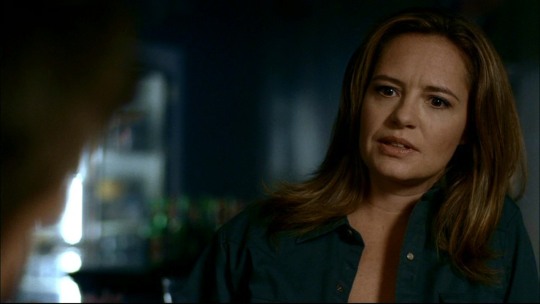
Unlike her daughter, very good at what she does. No-nonsense authority figure, she’s one of the few in the show to pull off a combination of a hand-wringing mama bear and a pro-active badass with a life outside her family. Not perceived as a threat because fans don’t know the meaning of MILF yet, and so is allowed to stick around for the season 2 finale. Dies to make Jo’s plan to obliterate Meg’s hellhounds work, though it’s strongly implied she mostly refuses to survive her kid.
Status: Dead
Importance: Major
On her own: SPN’s Molly Weasley, sullied by the implications of her death
Lenore
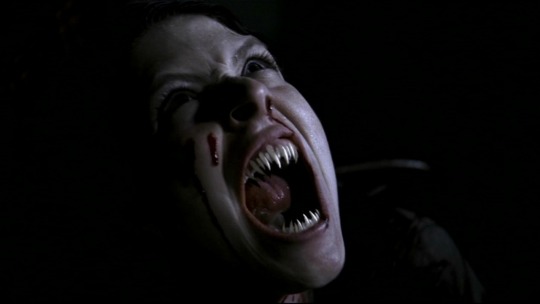
A head-strong leader of a nest of vegetarian vampires, she’s deliberately contrasted with Gordon’s Terminator schtick and to a lesser degree with Dean’s black-and-white monsters vs. humans kill-everything grief-cope in order to further cement SPN’s ongoing crusade of challenging who in fact is the monster around here. Has a crowning moment of awesome when she refuses to feed while covered in Sam’s blood. The entire point of her is her determination not to give up her humanity even when no longer human. Would be shame if the show decided to later abandon this essential part of her character and twist it for cheap drama…
Status: Alive as of s5, annihilated in every way in s6
Importance: Minor in the overall narrative, major in the episode and the boys’ development
On her own: An effective mirror to Dean’s stroll down the slippery slope
Diana Ballard
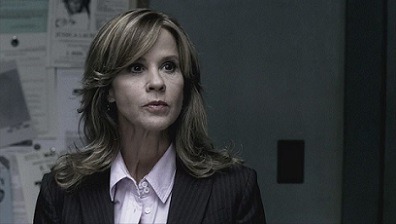
TheGoodCop manipulated by her professional and romantic partner, she has a surprisingly functional tension with Sam. Luckily for Linda Blair it goes unnoticed because the fandom doesn’t view older women as competition. Noteworthy mostly because she actively participates in uncovering the episode’s mystery which automatically elevates her above the standard clueless civilian, man or woman, who needs the duo to save them. Despite fewer appearances arguably more memorable than Henriksen, precisely because of her active involvement.
Status: Alive as of s5
Importance: Minor overall, a major player in the episode
On her own: Interesting take on the usual boilerplate cop
Ava Wilson
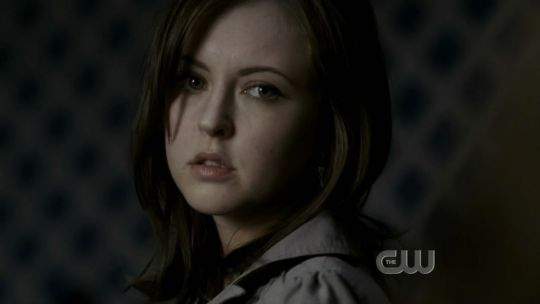
To present a very, very generous interpretation, she foreshadows Sam’s eventual turn to the dark side. Spirited, a little bit airheaded, and freaked about her Azazel-given powers, she gives enough of a damn to prevent her visions of people dying from coming true, though she clings to her intention to lead a normal civilian life. Does a complete switcheroo off-screen to become a villain because… power is awesome? Ends up the most advanced special child in season 2’s battle royale, the very concept of which is just… eh? Still gets dispatched no problem because… why not?
Status: Dead
Importance: Minor
On her own: A prime example of why the special children subplot is just…wot?
Molly McNamara
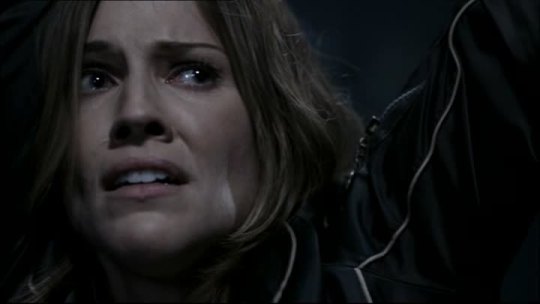
Memorable primarily because of the experimental (for SPN) narration which frames her as the duo’s partner when in fact she’s one of the things being hunted. For plot reasons spends her episode switching between being terrified, worried for her missing husband, and heartbroken. Can be somewhat tortuously argued to fit the theme of (not) overcoming grief and letting go, one of the few detectable threads in the directionless slog that’s season 2.
Status: Dead
Importance: Minor overall, major because she’s arguably the main character of her episode
On her own: Torture porny. Very torture porny.
Madison
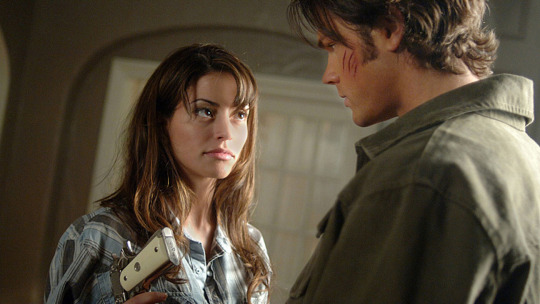
Intelligent, educated, and with an endearing love of soaps, she’s responsible for one of the three watchable sex scenes in the entire show. Has a nice theme of personal growth and healing from trauma going on, although it’s cut short and undermined when she’s revealed as a werewolf and euthanized by none other than Sam himself. Her death is filmed as a narrative-changing tragedy before it goes on to become a joke in season 4.
Status: Dead
Importance: Major
On her own: No matter how you look at it, she’s a diseased dog that needs to be put down for her own good while the menz wallow in their manly manpain. A rare example of a storyline I don’t think can be tweaked to be even marginally less awful.

I believe maestro may have wanted to portray sadness here.
Tamara
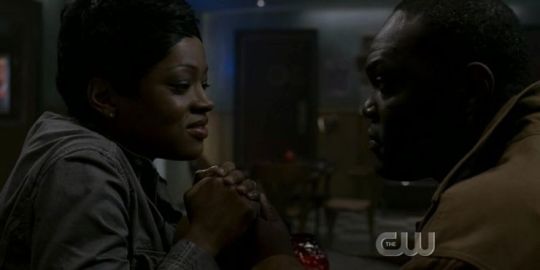
Told to be an excellent hunter, she’s shown as needing to be saved in order not to end up like her husband who’s literally forced to gargle bleach. Introduces the notion of growing hostility against the Winchesters in the hunting community. Full of wrath to fit the episode’s one-off seven deadly sins schtick, she’s emphasized as emotional and not in control of herself to such a degree that it overshadows how she’s in fact fairly competent in the second half of the episode.
Status: Alive as of s5
Importance: Minor
On her own: Wouldn’t stand out this much if she weren’t one of the few POCs in the blinding whiteness that’s SPN’s Americana.
Ruby
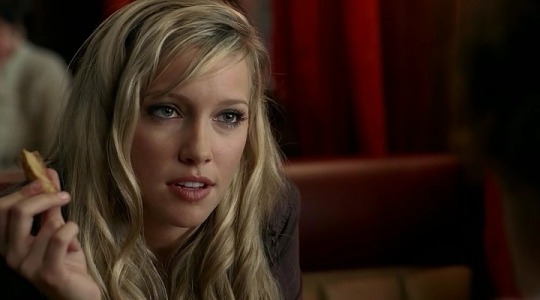
Doesn’t have the most organic introduction (A cool intriguing sexy French fries loving not like other gurls sassy badass, with a superdooper special knife? How 2000s cringe can you get?) but quickly becomes one of the show’s most distinctive villains allies. She’s an ally. Totally. Don’t worry about it. A sarcastic smartass jerk who breathes lies and manipulation, she’s resourceful, thinks on her feet, and throws herself into the thick of action without hesitation—a trait that gets especially interesting in retrospect as it suggests a fanatic devotion to her real goal. Sadly, her motivation doesn’t get fleshed out beyond “she really likes Satan, I guess” (which, hey) as the writers prioritize the surprise of the revelation over her further character development. Has the second watchable sex scene in the entire show; the fandom weeps itself to sleep. Gets killed by her own weapon when the writers decide that a character who’s smarter than both protagonists combined could well do with a bit of the good ol’ lobotomizing.
Status: Dead
Importance: Supermegadoublemajor
On her own: The stupid nature of her demise and occasional wooden acting do their best but never overshadow the awesome that’s Ruby.
Lisa Braeden
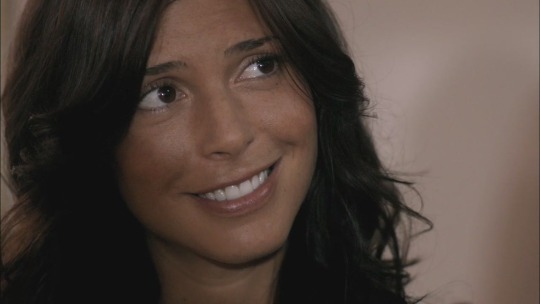
Dean’s past fling who becomes a living symbol of his desire for the white-picket fence. Is implied to possess mad financial skills as she owns property on a yoga teacher’s salary while a single mom below the age of 30. A blank slate the likes of Cassie, she’s salvaged by better acting. Frequent frowning suggests the presence of an inner life though it doesn’t tend to manifest itself on screen or affect the plot. Her single established trait—blow-out assertiveness the moment things get too far—is exercised mostly in service to her son. Exists solely to give Dean something to pine for.
Status: Alive as of s5
Importance: Major
On her own: A tertiary character who so-so sustains her own episode.
Bela Talbot
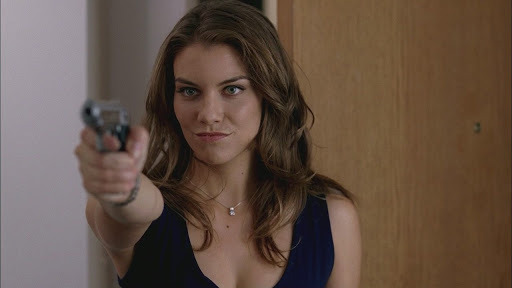
The best expansion of the show’s lore after the host of heaven, she’s unequivocally a bad person who nevertheless evokes huge amounts of sympathy. A cynical self-serving dealer in supernatural objects who mirrors Dean’s cracking tough guy persona, due to her abuse and the resulting trauma she refuses to open up and rely on anyone out of principle, or be indebted to them. Her pride makes her clinically unable to ask for help until it’s too late, and even forego mentioning personal history when it’d actively benefit her by softening the horrible impression others have of her. Switching between being an antagonist and the duo’s reluctant ally, she manages to outwit them roughly 90% of time. The fact that she has sexual tension with Dean while Sam lusts after her to the point of literal drooling sends fans apoplectic.
Status: Dead
Importance: Major
On her own: A complex character brought down by her own flaws.
Casey
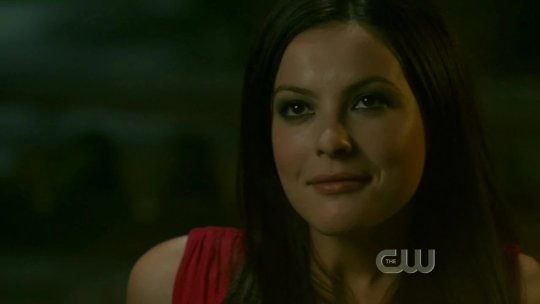
A demon, she’s torn between wanting to enact the Apocalypse and just chilling with her soulmate. Definitely a fanfic reader because her idea of dealing with danger is to shut herself with her enemy in a room and have a lengthy theological debate. Very outspoken about humanity’s propensity for evil. Outcomplexes Lilith and to a lesser extent Ruby as she’s allowed to openly address her life philosophy. While the dialogue format of her scenes is designed to give Dean space to talk about his feelings regarding his impending demise, it’s more or less an equal push-pull exchange. She’s smart, captivating, capable, and in love, i.e. things SPN just isn’t interested in keeping around.
Status: Dead
Importance: Minor in the overall narrative, major in the episode and Dean’s development
On her own: Could have been so good if allowed to stick around
Gertrude Case

A rich elderly creep whose gropy ways are played for laughs because she’s a woman I guess. Either can’t read social cues or doesn’t give a fuck about people’s obvious discomfort. But don’t worry, it’s hilarious. She’s a woman, you see. What harm have those ever done.
Status: I’m going to assume dead by now, otherwise alive as of s5
Importance: A major figure in Sam’s life since she sexually assaulted him. Otherwise minor.
On her own: Sexual harassment is fun, kids
Lucy

Take Molly McNamara, strip her of any pretence at thematic relevance, minimize her importance while playing up her suffering, and then remove her like a broken Christmas decoration while making sassy remarks—voilà, you’ve ended up with the exact simplistic image that pops into one’s head when the words Supernatural and women are mentioned in a sentence.
Status: Dead
Importance: Non-existent
On her own: Just… why
Astaroth
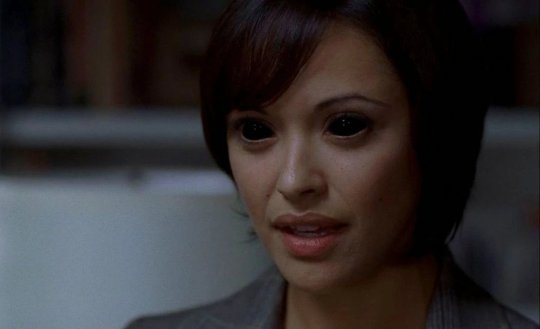
Approaches awesomehood as her demonic business operation is built around preying on bored suburban hausfraus and taking their souls in exchange for magical powers, which they then use to secure benign materialistic keeping-up-with-the-joneses crap and devour one another like a bunch of assholes whose death you can’t help but eagerly anticipate. Srsly, eff those ladies. Stands out as the only (implied) lesbian in the Kripke arc.
Status: Dead
Importance: Minor, not even the real monster of the week when compared to the coven
On her own: There’s probably another discussion about Doylist sexism hidden around somewhere that I’m not really interested in having. Go Astaroth.
Nancy Fitzgerald
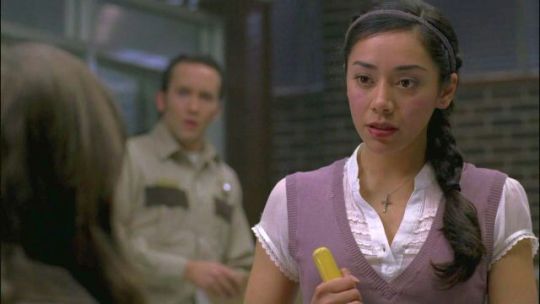
Sugar and spice and every other cliché about kindness combined in a pretty sweet package. Plot demands her to be a virgin for some reason, even though this aspect of her character doesn’t amount to anything in the story and only serves to contrast Nancy’s… purity with Ruby who we’re being constantly told is a “slut” and a “whore” and I have no idea how that’s supposed to work. Then again, Nancy’s virginity is framed as a valid personal choice in a rather empowering moment so that’s good. Has standards because even after deciding to let go of her chastity vow, she won’t settle for just any loser who happens to stand around converting oxygen into CO2. Her “cause manpain out of nowhere”-type death is one of the few of this category in the show which actually work because the cruel pointless nature of it is precisely the point (and at least she’s not the only one who doesn’t survive, please ignore how the episode literally says her demise is the most tragic because she never got laid, barfs).
Status: Dead
Importance: Minor
On their own: A textbook definition of a cinnamon
Lilith
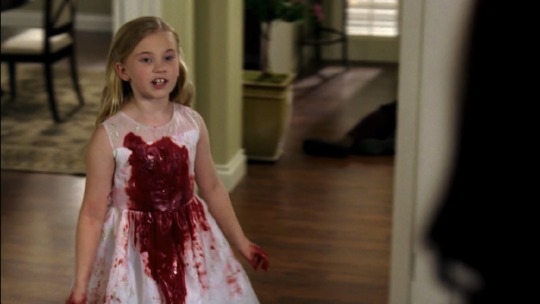
An overarching menace that doesn’t spend too much time on screen, she’s a prop rather than her own person. This gets highlighted the moment the show stops casting her as a clichéd creepy child who likes to larp as that Twilight Zone kid, and turns her into the standard hawt chick in a will-they-won’t-they episode. No interiority as she goes along with a plan which requires her obliteration, without at least allowing her to explore her religious motivation. Ruby does all the heavy lifting in this partnership.
Status: Dead
Importance: Major
On her own: For the life of me I can’t make sense of her actions in s4. But the clichéd creepy kid is adorbs so points for memorability.
Maggie Zeddmore
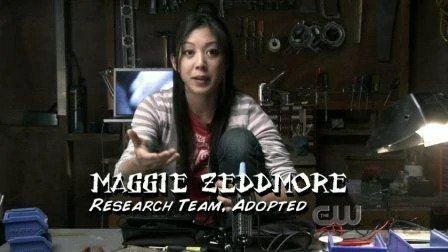
The straight man to the Ghostfacers’ utterly delightful douchefacery. Manages to keep up with Harry and Ed in terms of hilarity because not only is she exactly as out of place as them, she decides to role-play her childhood-friends-to-lovers fanfic in the middle of a haunted house as the best sister that she is.
Status: Alive as of s5
Importance: Minor
On her own: Love at first geek
Next, season 4 and 5 before I try to figure out what this all adds up to.
#spn#spn critical#supernatural#supernatural critical#sexist writing#tessa#jo harvelle#ellen harvelle#madison#ruby#bela talbot#lisa braeden#nancy fitzgerald#lilith
10 notes
·
View notes
Text
an argument for AO3
So I’m in a conversation with someone who is kind of in the “against AO3″ camp, and they asked me a couple of questions. Namely, who wouldn’t be uncomfortable with pedophilia? Isn’t it sketchy that a beta website is asking for so much money despite reaching its goals?
And my answer became so long... I figured it might as well become its own post. Please bear in mind that this is cut from a whole conversation.
But here it is.
------
No. It doesn't seem sketchy to me at all. Why would it? I know we make jokes about how much money tumblr has cost the various sites which purchase it like Yahoo, but there's some truth there: it's really expensive to host a website to thousands and thousands of people. It's why we see so many tumblr owners trying to shoehorn in ads or make people buy services, or why Photobucket tried to pull that truly atrocious bullshit a year or two back. Without image hosting capabilities (tumblr and photobucket's big thing), the strain isn't as huge.... but AO3 is MASSIVE. It is hosting literally thousands of accounts, millions of stories. That's massive on a server scale alone, ignoring all the other work they do. Yeah, it's in beta... but that's because it's trying to reach a goal of being as good a fanfic archive as they can be, and they don't believe they've reached that goal yet. Being in beta means they can better listen to their uses on shit like tagging systems and make those changes. Not to mention, again, they are INCREDIBLY transparent. If you are worried about where the money is going, you can go on the site and they have all their stuff up there.
As for the pedophilia subject matter.... Please give me a moment. because there's honestly a lot to say on that particular issue, if nothing else. This will take a while, so if you see this and there hasn't been a reply yet.... I'm still typing lmao.
To start with, of course people are uncomfortable about pedophilia. However, there are a lot of problems with how pedophilia is viewed or *used* as an accusation in the current fandom climate.
For example, in honestly EXTREMELY recent times, I was told I was "defending" pedophilia because I disagreed that a character (an immortal food gijinka) was "minor-coded" or "designed as an underage teenager". (As a note, an argument for this view was that the character's breasts were too small.) When I pointed out, hey, that's kind of a fucked up accusation to throw at a complete stranger, especially as I am a CSA survivor, I was told "You have to be lying about that, then, because a real CSA survivor would understand."
c o o l
That's just my personal experience that happened within a couple of months. Other people have talked about running into people who think that a character turning 18 means they're a pedophile for still dating a 17 year old. Or running into people who think a 40 year old dating someone in their 30s is pedophilic. Or believe that even SHIPPING characters who were not yet 18 was pedophilic if you yourself were over 18.
(Of course, you also have the kinds of people who try to use Moral Purity as a way to bash ships they don't like. I once saw someone try to claim that a popular mlm ship, A/B, was pedophilic because one half of the equation looked young.... when some other artists drew him... Of course, on the side, this person liked to also get angry that *their* favorite ship, a dude/chick ship composing of A/C, wasn't more popular. So. You know.)
So that's one half of the problem: the word "pedophile" being so warped that a lot of people now have no idea if the person using it has a genuine concern or if the accuser is trying to smear someone who doesn't ship the same thing. FFnet and Tumblr have gone with the "burn it all down" approach, which hasn't actually helped anyone and is, to boot, sloppily moderated. So we know from history, from experience in cases like mine, that it doesn't help in that area.
The other half of the problem is... How far is too far?
This is where "anti" culture begins to find similarities with the whole Warriors for Innocence thing. If you completely and blindly block an entire tag, or anyone associated with it, you have to ask: who are you hurting? Warriors for Innocence hurt actual rape victim, and queer folk, and a whole lot of others. Far as I can tell, anti culture is on the route to the same thing, because I have yet to see appropriate answers to a lot of issues.
If one says "anything with underage sex in it is bad and should be banned", what about fics that tackle it in a serious manner? The young adult novel "Speak" deals with rape of an underage girl and how she works through that mental trauma; are fics with stories equivalent to that allowed? Do fics with underage sex have to focus purely on how it is Horrible And Bad to be allowed? Does only a chapter have to be allowed? A paragraph? An author's note? A tag? Or are we allowed to never explore dark subject matter?
Is fic with underage content in it only horrible if it's someone over the age of eighteen who writes it? Can a teenager write smut (terribly written as it may likely be) between teenage characters? Can a teenager write smut between a teenage character and an adult character? For the record, i did in fact, over the summer, run into someone who said that teens/minors "shouldn't even know about NSFW", which is asinine to me, because Abstinence Only is a terrible thing to put in schools, and somehow worse in a way when you try to put that into effect in fandom. If the answer is 'yes', what are you going to do, demand to see people's birth certificates in fandom?
(As a note, I think this is a terrible message to put into fandom for teenagers because I believe it will inevitably lead to self hatred and a warped view of sex. If you make the extremely simplified black-and-white statement of "teens and sex should never go together ever in any way", that's going to mess up teens who are starting to experience arousal in their bodies. The message, whether intended or not, ends up as "NSFW things are bad, which means my brain which thought NSFW thoughts is bad, and my brain thought those thoughts because my body had these feelings". )
(This is bad for any average teenager. This will be especially worse to CSA and rape victims, along with queer youth who, in a lot of places, are still struggling with their bodies and/or feelings because the world is still pretty damn queerphobic.)
Speaking of CSA and rape victims, what about those of them who write/read underage ships or dark content as a way to cope with what happened or Just Because? That's a thing lots of us do, especially those of us who don't look like the Perfect Victims people can use as an excuse for whatever crusade they're waging. I've heard anti types go "Well, it's an unhealthy way to cope" or claims that CSA/rape victims who write such dark content are "just as bad as their abusers"... But are they psychiatrists/therapists? Are they the psychiatrists/therapists of *those specific people*? Will you moderate this kind of content by forcefully interrogating CSA/rape victims to out their trauma to a complete stranger? Will you demand to speak to their therapists? Over fanfic?
When I was a teenager, I wrote all sorts of stuff. I wrote dark dub-con fic, because I liked to explore those dark feelings in the process and the aftermath separate from myself. I wrote a fic with a fairly young teenage girl (what age was kh2 kairi? who even knows, I sure didn't) falling for a MUCH older man built like a brick shit house so that there was never any doubt to him being an adult, even giving him her first kiss, because they were my favorite characters, I wanted both of them to have a moment of happiness (that i promptly ruined but hey), and, *in this fic*, I knew it would be alright. I knew the girl would always be in control, she'd be the one making moves, that the guy was nonthreatening and kind and protect her and work alongside her.
(and then I began the process of killing him off in the next paragraph through him saving her life, but, like. Drama (tm), baby)
This was all good for me. At an age where I was young, vulnerable, and figuring out weird shit like arousal and romantic feelings, it was *invaluable* to have a space where I could explore all of that while relatively safe from actual danger, even if the stuff I wanted to explore was a little messed up. This whole thing against AO3 wouldn't have helped me, and I'm pretty sure it's not helping a lot of other people too.
There is an issue with underage people and sex stuff- not just in fandom but in culture at large. We have Hollywood dressing up young girl actresses in super slinky or revealing clothes. We have schools saying girls basically should never wear shorts, and capitalism fucking this up further by only selling SUPER SHORT shorters. We have media of all sorts giving us adults, whether in real actors or character design, in the roles of young people. (See: "how do you do, fellow kids") We should probably take more care about fandom spaces, so that people of all ages don't feel pressured to engage in sexual shit they're not 100% game for or into, or just have it shoved into their faces without consent. It's a complex issue... and it's not stuff that can just be 'banned' and have that fix it.
AO3 has on its plate a very complex problem that will, if we're all honest, never have a perfect answer. It has given us the best that can possibly be asked for. It obeys the law by not having actual child pornography on it (aka visual proof of actual real children, defined by us law as such), which is closest to "objective" we can get at the current stage in humanity and state of fandom. It has a very comprehensive and moderated tag system, so that people can post warnings along their fic so that people don't stumble onto shit they don't need to, and so that people can moderate their own reading experience to some degree.
If some people aren't comfortable with AO3, that's fine. However, most of us are getting annoyed not with those people, but with the people who just blindly say "AO3 supports child porn and is probably stealing money" (statement simplified for the purpose of this post). It shows an ignorance of the fandom history that lead us here, no understanding in either AO3's practices or how expensive it is to run a site, and no consideration for how complex this problem can really be. It would be great if this was a black and white issue, if there was an easy answer as just "banning" certain kinds of content... but there isn't. And that's where I am.
#long post#ao3#fandom#here comes the ruckus#csa tw#rape tw#you never realize how long what you've written is#until it's in a whole ass tumblr post#well!
737 notes
·
View notes
Photo

Sendai Holiday 2019, Part 5: An Unexpected Journey
A fan told me about the special edition Yuzuru Hanyu subway card that came with 3 postcards and I quickly went to the Sendai subway station office to buy it. The beautiful subway card was a one-day pass, unlimited rides. Many fans used it to to get to International Centre Station where Yuzu’s Olympic Monuments are, and also to Izumi Chuo Station which is near Ice Rink Sendai, but I had already gone to these places before I knew about this special pass. Well, I could always just keep it without using it but, somehow, I felt I had to make good use of this pass that has Yuzu’s SEIMEI silhouette on it.
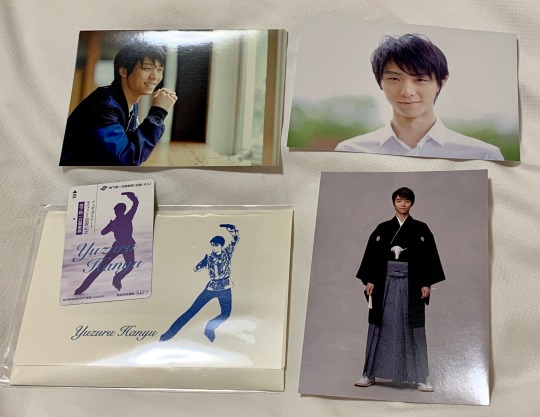
There is a 3.11 Memorial Community Centre located in Arai Station 荒井 at the end of the Tozai subway line 東西線. The name popped up when I was searching online about Sendai travel. I have never heard of this place before but since I could use my Yuzu subway pass and learn more about 3.11, I thought it was perfect. Arai Station is just 6 stops away from Sendai Station. (3.11 refers to the Great East Japan earthquake and tsunami, also known as the Tohoku earthquake, of 11 March 2011.)
I arrived at Arai Station and there was a big sign pointing to the 3.11 centre. It was within the station itself, at one end.

‘This post-earthquake restoration memorial facility opened in February 2016. As a gateway to the eastern coastal area, which suffered tremendous damage from the tsunami, this memorial community center conveys the history of the region, the memory of the disaster, and wisdom and lessons derived from it to the world and to future generations.’ (credit)
On the first floor, there is a big 3D map that shows the extent of the coastal area ravaged by the tsunami.

On the 2nd floor, there are photos of the affected areas, in a timeline from the Showa period til present day, showing the devastation of March 2011 and restoration efforts.


The captions are all in Japanese but there are booklets that give the translation in English, Chinese, Korean and Thai. You can hold the booklet and read the translated caption for each picture as you move along the wall.
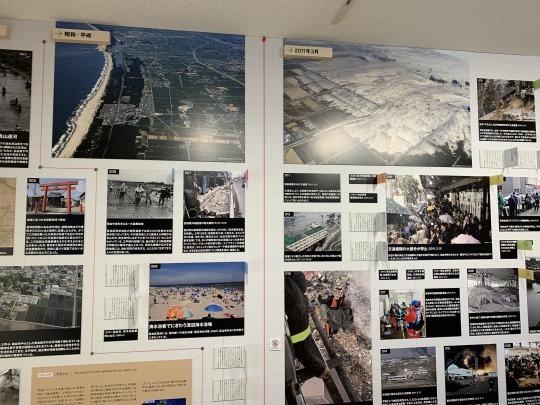

There was one photo that struck me in particular. People on the rooftop of Arahama Elementary School, with the black waters of the tsunami below. They were students, staff and nearby residents who had fled there. All were rescued by helicopter later. Many thoughts ran through my mind. How terrifying it must have been to watch the sea swallow up all that you live on. And what about their family members who were not with them...... how many families could be reunited? The young elementary school students, did they recover from the trauma? How are they doing now.....
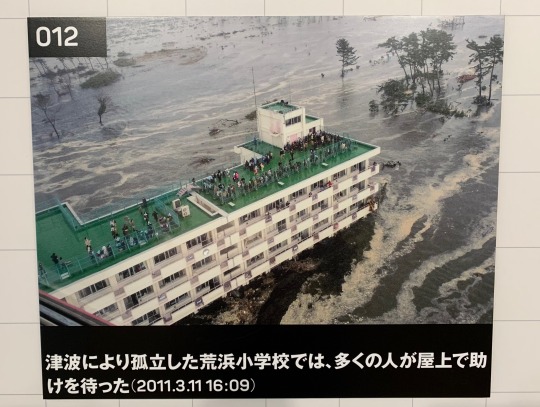
One of the staff told me that this school has been preserved as a museum and memorial of the disaster. It has been open to public since April 2017. He suggested that I take the short bus ride to the school and go into the building to have a look. Oh my...... I was not prepared for that at all. Do I really want to see the actual traces of devastation and tragedy?? It is too sad..... After a bit of hesitation, I went outside the station and boarded the bus that goes to the school near the coast. It was a regular bus that has a few stops along way and the ride cost 240 yen. Part of the route was rather scenic with rice paddy fields.
The last stop was at the school. The building looked like a normal school from afar. A banner along the 3rd floor says ありがとう 荒浜小学校 (Thank you, Arahama Elementary School). It was put up by students in 2016.

There is some information in English on the board at the front.
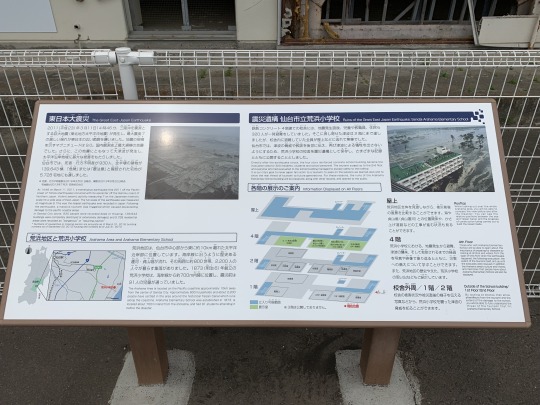
The white sign at the 2nd floor shows the height of the tsunami that day. The first level was totally submerged. (pic below)

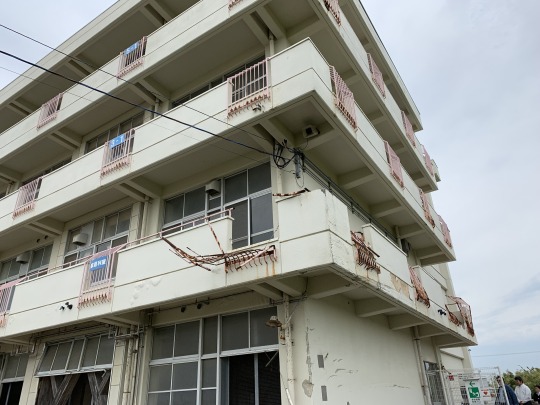
On the 1st and 2nd floors, we can see the damage, and pictures show the aftermath, before the debris was cleared. All sorts of things were pushed into the classrooms by the force of the tsunami. A teacher’s car which was parked outside was found crushed with the debris in one of the rooms.



On the 4th floor is a room with a timeline of events on that day, from the earthquake to the tsunami and after.



The clock that was in the 1st floor gymnasium stopped at the time that the tsunami struck.
There was also a video in the room, with the principal and other staff of the school commenting on that day, with English subtitles.....

“I grabbed the key for the rooftop and told everyone in all of the rooms to leave everything and go up to the rooftop right away.”
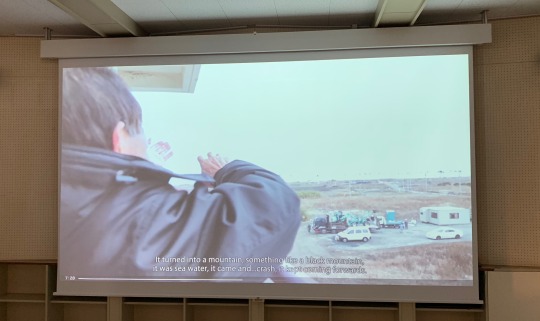
“It turned into a mountain, something like black mountain, it was sea water, it came and..... crash, it kept coming forward.”
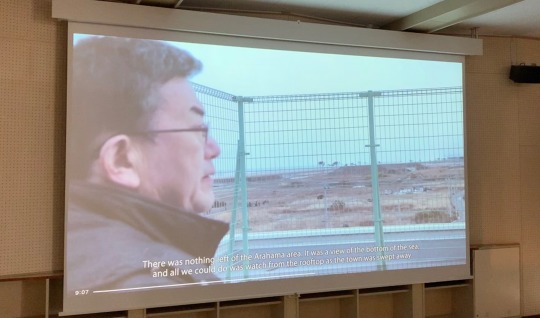
“There was nothing left of the Arahama area. It was a view of the bottom of the sea and all we could do was watch from the rooftop as the town was swept away.”
I cried as I watched the video. My heart that was getting heavier and heavier could not hold it back anymore.
From the 4th floor, I went up to the rooftop. So this was where the survivors were standing. I could see the sea on one side....

and all around, rebuilding is going on. New roads are being made, with bulldozers and excavators here and there. It was too painful to think that this was actually a town filled with people and homes.


I remember the wind was very strong on the rooftop and the sky was overcast, so it was very cold even though it was in the warm month of May. After taking some photos, I made my way back down.
The 3rd floor is closed but there is a very touching piece of writing by a teacher of the school, with English translation included. Please read it from my photo below (4th pic).
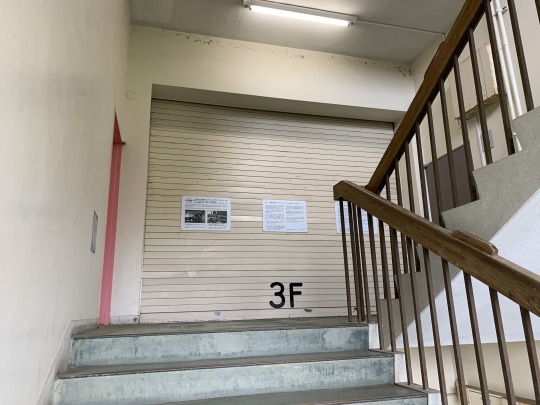

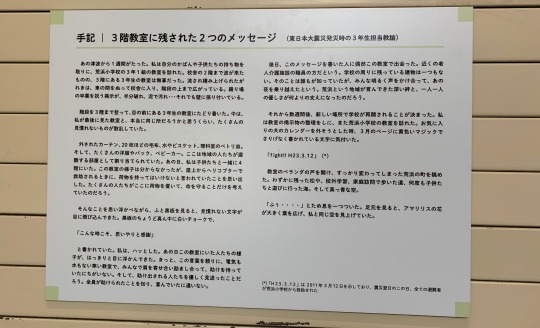

The teacher’s reflections were full of sadness but also very uplifting. “Kindness and gratitude in these hard times.” So touching. I hope to remember these words.
In front of the building is a ‘Closing of School’ monument, with the words of the school song on the transparent blue panel. The school has been here a long time. It was established in 1873 (Meiji year 6) and built on the current site in 1912 (Taisho year 1).
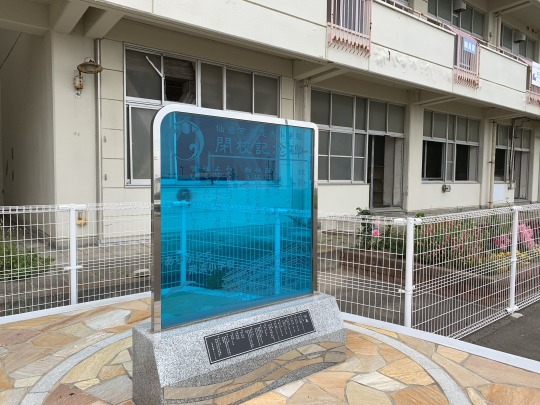
As I was leaving, groups of students came in large buses. Each group had a guide talking to them outside first, then taking them around. The school continues its purpose of educating and building up the nation.



Goodbye and thank you, Arahama Elementary School. I said a silent prayer as I left on the bus. The serenity of the rice fields comforted my heart.
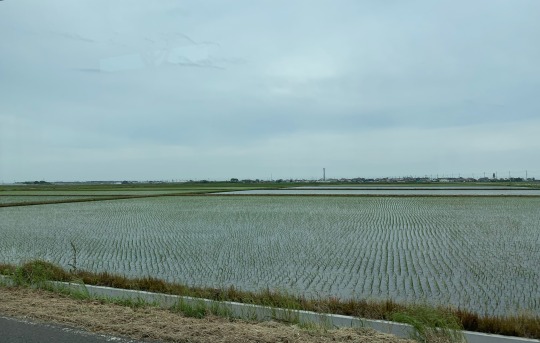
For more info and photos of the school, here is a news article: The school that saved 320 people
Note: I spent about an hour here but one hour is not enough to finish looking at everything in the school. Two hours would be good. There are guide booklets in a few languages near the entrance of the school. Check also the bus schedule. It only runs once an hour.

Much thanks to the staff at 3.11 Memorial Community Centre for their help.
Back home, I searched and read up more....
In addition to physical reconstruction, emotional and social support remain an important focus for rebuilding. “Up in Tohoku, a common term widely used to describe the emotional difficulty in what recovery really means after the disaster is kokoro no byōki (illness of the heart). From continuing financial worries, divorces, depression, disconnected families to elderly survivors losing connection or meaning, there are ongoing situations of survivors falling through the cracks. [....] Volunteers provide an invaluable message of encouragement, crucial to the long-term emotional recovery of survivors. [...] Their return and interest in the community reinforces the message that others believe the rebuilding is worthwhile — and that they are worthwhile.” (credit: Japan Times, link below)
I immediately thought of Yuzu. Besides donating all his Olympic prize money for rebuilding, he goes back again and again to visit communities in the affected areas and to do ice shows for them. His visits tell the survivors that they are worthwhile, that they are not forgotten. How many lives has he saved in this way! God bless all volunteers for their kindness and generosity.
Thanks to Yuzu’s subway pass..... It led me on an unexpected journey to learn more about something very close to his heart and I am inspired again to do more. Below are some useful sites that I found:
https://www.japantimes.co.jp/community/2019/03/10/issues/new-approach-volunteering-tohoku/#.XUVS5lCLmCR
https://www.japansociety.org/page/earthquake
https://www.tohoku.ac.jp/en/news/campus_community/news20181128scrum.html
Even though I only took 2 rides with the subway pass (going to Arai Station and back), I think I have made very good use of it.
(All photos are taken by me; please do not use or re-post my photos without asking me first. Thanks.)
115 notes
·
View notes
Link
A racial realist IS a white supremacist!!!
By Greg Miller
In unguarded moments with senior aides, President Trump has maintained that Black Americans have mainly themselves to blame in their struggle for equality, hindered more by lack of initiative than societal impediments, according to current and former U.S. officials.
After phone calls with Jewish lawmakers, Trump has muttered that Jews “are only in it for themselves” and “stick together” in an ethnic allegiance that exceeds other loyalties, officials said.
Trump’s private musings about Hispanics match the vitriol he has displayed in public, and his antipathy to Africa is so ingrained that when first lady Melania Trump planned a 2018 trip to that continent he railed that he “could never understand why she would want to go there.”
When challenged on these views by subordinates, Trump has invariably responded with indignation. “He would say, ‘No one loves Black people more than me,’ ” a former senior White House official said. The protests rang hollow because if the president were truly guided by such sentiments he “wouldn’t need to say it,” the official said. “You let your actions speak.”
In Trump’s case, there is now a substantial record of his actions as president that have compounded the perceptions of racism created by his words.
Over 3½ years in office, he has presided over a sweeping U.S. government retreat from the front lines of civil rights, endangering decades of progress against voter suppression, housing discrimination and police misconduct.
His immigration policies hark back to quota systems of the 1920s that were influenced by the junk science of eugenics, and have involved enforcement practices — including the separation of small children from their families — that seemed designed to maximize trauma on Hispanic migrants.
With the election looming, the signaling behind even second-tier policy initiatives has been unambiguous.
After rolling back regulations designed to encourage affordable housing for minorities, Trump declared himself the champion of the “Suburban Lifestyle Dream.” He ordered aides to revamp racial sensitivity training at federal agencies so that it no longer refers to “White privilege.” In a speech at the National Archives on Thursday, Trump vowed to overhaul what children are taught in the nation’s schools — something only states have the power to do — while falsely claiming that students are being “fed lies about America being a wicked nation plagued by racism.”
The America envisioned by these policies and pronouncements is one dedicated to preserving a racial hierarchy that can be seen in Trump’s own Cabinet and White House, both overwhelmingly white and among the least diverse in recent U.S. history.
Trump’s push to amplify racism unnerves Republicans who have long enabled him
Scholars describe Trump’s record on race in historically harsh terms. Carol Anderson, a professor of African American Studies at Emory University, compared Trump to Andrew Johnson, who succeeded Abraham Lincoln as president and helped Southern Whites reestablish much of the racial hegemony they had seemingly lost in the Civil War.
“Johnson made it clear that he was really the president of a few people, not the American people,” Anderson said. “And Trump has done the same.”
A second White House official who worked closely with Trump quibbled with the comparison, but only because later Oval Office occupants also had intolerant views.
“Woodrow Wilson was outwardly a white supremacist,” the former official said. “I don’t think Trump is as bad as Wilson. But he might be.”
White House officials vigorously dispute such characterizations.
“Donald Trump’s record as a private citizen and as president has been one of fighting for inclusion and advocating for the equal treatment of all,” said Sarah Matthews, a White House spokeswoman. “Anyone who suggests otherwise is only seeking to sow division.”
No senior U.S. official interviewed could recall Trump uttering a racial or ethnic slur while in office. Nor did any consider him an adherent of white supremacy or white nationalism, extreme ideologies that generally sanction violence to protect White interests or establish a racially pure ethno-state.
White House officials also pointed to achievements that have benefited minorities, including job growth and prison-sentence reform.
But even those points fade under scrutiny. Black unemployment has surged disproportionately during the coronavirus pandemic, and officials said Trump regretted reducing prison sentences when it didn’t produce a spike in Black voter support.
And there are indications that even Trump’s allies are worried about his record on race. The Republican Party devoted much of its convention in August to persuading voters that Trump is not a racist, with far more Black speakers at the four-day event than have held top White House positions over the past four years.
This story is based on interviews with more than two dozen current and former officials, including some who have had daily interactions with the president, as well as experts on race and members of white supremacist groups. Many spoke on the condition of anonymity, citing a desire to provide candid accounts of events and conversations they witnessed without fear of retribution.
Coded racial terms
Most attributed Trump’s views on race and conduct to a combination of the prevailing attitudes of his privileged upbringing in the 1950s in what was then a predominantly White borough of New York, as well as a cynical awareness that coded racial terms and gestures can animate substantial portions of his political base.
The perspectives of those closest to the president are shaped by their own biases and self-interests. They have reason to resist the idea that they served a racist president. And they are, with few exceptions, themselves White males.
Others have offered less charitable assessments.
Omarosa Manigault Newman, one of the few Black women to have worked at the White House, said in her 2018 memoir that she was enlisted by White House aides to track down a rumored recording from “The Apprentice” — the reality show on which she was a contestant — in which Trump allegedly used the n-word. A former official said that others involved in the effort included Trump adviser Hope Hicks and former White House spokeswoman Sarah Sanders.
The tape, if it exists, was never recovered. But Manigault Newman, who was forced out after clashing with other White House staff, portrayed the effort to secure the tape as evidence that aides saw Trump capable of such conduct. In the book, she described Trump as “a racist, misogynist and bigot.”
Mary L. Trump, the president’s niece, has said that casual racism was prevalent in the Trump family. In interviews to promote her recently published book, she has said that she witnessed her uncle using both anti-Semitic slurs as well as the n-word, though she offered few details and no evidence.
Michael Cohen, the president’s former lawyer, has made similar allegations and calls Trump “a racist, a predator, a con man” in a newly published book. Cohen accuses Trump of routinely disparaging people of color, including former president Barack Obama. “Tell me one country run by a Black person that isn’t a s---hole,” Trump said, according to Cohen.
These authors did not provide direct evidence of Trump’s racist outbursts, but the animus they describe aligns with the prejudice Trump so frequently displays in public.
In recent months, Trump has condemned Black Lives Matter as a “symbol of hate” while defending armed White militants who entered the Michigan Capitol, right-wing activists who waved weapons from pickup trucks in Portland and a White teen who shot and killed two protesters in Wisconsin.
Trump has vowed to safeguard the legacies of Confederate generals while skipping the funeral of the late congressman John Lewis (D-Ga.), a civil rights icon, and retweeted — then deleted — video of a supporter shouting “White power” while questioning the electoral eligibility of Sen. Kamala D. Harris (D-Calif.), the nation’s first Black and Asian American candidate for vice president from a major party. In so doing, Trump reanimated a version of the false “birther” claim he had used to suggest that Obama may not have been born in the United States.
These add to an already voluminous record of incendiary statements, including his tweet that minority congresswomen should “go back” to their “crime infested” countries despite being U.S.-born or U.S. citizens, and his claim that there were “very fine people on both sides” after torch-carrying white nationalists staged a violent protest in Charlottesville.
In a measure of Trump’s standing with such organizations, the Stormfront website — the oldest and largest neo-Nazi platform on the Internet — recently issued a call to its followers to mobilize.
“If Trump doesn’t win this election, the police will be abolished and Blacks will come to your house and kill you and your family,” the site warned. “This isn’t about politics anymore, it is about basic survival.”
As the election approaches, Trump has also employed apocalyptic language. He recently claimed that if Democratic nominee Joe Biden is elected, police departments will be dismantled, the American way of life will be “abolished” and “no one will be SAFE.”
Given the country’s anguished history, it is hard to isolate Trump’s impact on the racial climate in the United States. But his first term has coincided with the most intense period of racial upheaval in a generation. And the country is now in the final stretch of a presidential campaign that is more explicitly focused on race — including whether the sitting president is a racist — than any election in modern American history.
Biden has seized on the issue from the outset. In a video declaring his candidacy, he used images from the clashes in Charlottesville, and said he felt compelled to run because of Trump’s response. He has called Trump the nation’s first racist president and pledged to use his presidency to heal divisions that are a legacy of the country’s “original sin” of slavery.
Exploiting societal divisions
Trump has confronted allegations of racism in nearly every decade of his adult life. In the 1970s, the Trump family real estate empire was forced to settle a Justice Department lawsuit alleging systemic discrimination against Black apartment applicants. In the 1980s, he took out full-page ads calling for the death penalty against Black teens wrongly accused of a rape in Central Park. In the 2000s, Trump parlayed his baseless “birther” claim about Obama into a fervent far-right following.
As president, he has cast his record on race in grandiose terms. “I’ve done more for Black Americans than anybody with the possible exception of Abraham Lincoln,” Trump said July 22, a refrain he has repeated at least five times in recent months.
None of the administration officials interviewed for this story agreed with Trump’s self-appraisals. But several sought to rationalize his behavior.
Some argued that Trump only exploits societal divisions when he believes it is to his political advantage. They pointed to his denunciations of kneeling NFL players and paeans to the Confederate flag, claiming these symbols matter little to him beyond their ability to rouse supporters.
“I don’t think Donald Trump is in any way a white supremacist, a neo-Nazi or anything of the sort,” a third former senior administration official said. “But I think he has a general awareness that one component of his base includes factions that trend in that direction.”
Studies of the 2016 election have shown that racial resentment was a far bigger factor in propelling Trump to victory than economic grievance. Political scientists at Tufts University and the University of Massachusetts, for example, examined the election results and found that voters who scored highly on indexes of racism voted overwhelmingly for Trump, a dynamic particularly strong among non-college-educated Whites.
Several current and former administration officials, somewhat paradoxically, cited Trump’s nonracial biases and perceived limitations as exculpatory.
Several officials said that Trump is not a disciplined enough thinker to grasp the full dimensions of the white nationalist agenda, let alone embrace it. Others pointed out that they have observed him making far more offensive comments about women, insisting that his scorn is all-encompassing and therefore shouldn’t be construed as racist.
“This is a guy who abuses people in his cabinet, abuses four-star generals, abuses people who gave their life for this country, abuses civil servants,” the first former senior White House official said. “It’s not like he doesn’t abuse people that are White as well.”
Nearly all said that Trump places far greater value on others’ wealth, fame or loyalty to him than he does on race or ethnicity. In so doing, many raised a version of the “some of my best friends are Black” defense on behalf of the president.
When faced with allegations of racism in the 2016 campaign, Trump touted his friendship with boxing promoter Don King to argue otherwise. Administration officials similarly pointed to the president’s connection to Black people who have praised him, worked for him or benefited from his help.
They cited Trump’s admiration for Tiger Woods and other Black athletes, the political support he has received from Sen. Tim Scott (R-S.C.) and other Black lawmakers, the president’s fondness for Ja’Ron Smith, who as assistant to the president for domestic policy is the highest-ranking Black staffer at the White House, and his pardon of Black criminal-justice-reform advocate Alice Marie Johnson, expunging her 1996 conviction for cocaine trafficking.
In his speech at the Republican National Convention, Scott used his personal story of bootstrap success to emphasize the ways that Republican policies on taxes, school choice and other issues create opportunities for minorities.
Trump “has fought alongside me” on such issues, Scott said, urging voters “not to look simply at what the candidates say, but to look back at what they’ve done.”
For all the prominence that Scott and other Black Trump supporters were given at the convention, there has been no corresponding representation within the Trump administration.
The official photo stream of Trump’s presidency is a slide show of a commander in chief surrounded by White faces, whether meeting with Cabinet members or posing with the latest intern crop.
From the outset, his leadership team has been overwhelmingly White. A Washington Post tally identified 59 people who have held Cabinet positions or served in top White House jobs including chief of staff, press secretary and national security adviser since Trump took office.
Only seven have been people of color, including Defense Secretary Mark T. Esper and Health and Human Services Secretary Alex Azar, who are of Lebanese heritage. Only one — Ben Carson, the Secretary of Housing and Urban Development — is Black.
Under Trump, the nation’s federal courts have also become increasingly White. Of the 248 judges confirmed or nominated since Trump took office, only eight were Black and eight were Hispanic, according to records compiled by NPR News.
Retreating from civil rights
Trump can point to policy initiatives that have benefited Black or other minority groups, including criminal justice reforms that reduced prison sentences for thousands of Black men convicted of nonviolent, drug-related crimes.
About 4,700 inmates have been released or had their sentences reduced under the First Step Act, an attempt to reverse the lopsided legacy of the drug wars of the 1980s and 1990s, which disproportionately targeted African Americans. But this policy was championed primarily by Jared Kushner, Trump’s son-in-law, and former officials said that Trump only agreed to support the measure when told it might boost his low poll numbers with Black voters.
Months later, when that failed to materialize, Trump “went s---house crazy,” one former official said, yelling at aides, “Why the hell did I do that?”
Manigault Newman was similarly excoriated when her efforts to boost funding for historically Black colleges failed to deliver better polling numbers for the president, officials said. “You’ve been at this for four months, Omarosa,” Trump said, according to one adviser, “but the numbers haven’t budged.” Manigault Newman did not respond to a request for comment.
White House officials cited other initiatives aimed at helping people of color, including loan programs targeting minority businesses and the creation of “opportunity zones” in economically distressed communities.
Trump has pointed most emphatically to historically low Black unemployment rates during his first term, arguing that data show they have fared better under his administration than under Obama or any other president.
But unemployment statistics are largely driven by broader economic trends, and the early gains of Black workers have been wiped out by the pandemic. Blacks have lost jobs at higher rates than other groups since the economy began to shut down. The jobless rate for Blacks in August was 13 percent, compared with 7.3 percent for Whites — the highest racial disparity in nearly six years.
Neither prison reform nor minority jobs programs were priorities of Trump’s first term. His administration has devoted far more energy and political capital to erecting barriers to non-White immigrants, dismantling the health-care policies of Obama and pulling federal agencies back from civil rights battlegrounds.
Under Trump, the Justice Department has cut funding in its Civil Rights Division, scaled back prosecutions of hate crimes, all but abandoned efforts to combat systemic discrimination by police departments and backed state measures that deprived minorities of the right to vote.
Weeks after Trump took office, the department announced it was abandoning its six-year involvement in a legal battle with Texas over a 2011 voter ID law that a federal court had ruled unfairly targeted minorities.
Later, the department went from opposing, under Obama, an Ohio law that allowed the state to purge tens of thousands of voters from its rolls to defending the measure before the Supreme Court.
The law was upheld by the court’s conservative majority. In a dissenting opinion, Supreme Court Justice Sonia Sotomayor noted that voter rolls in African American neighborhoods shrank by 10 percent, compared with 4 percent in majority-White suburbs.
The Justice Department’s shift when faced with allegations of systemic racism by police departments has been even more stark.
After the Rodney King beating in Los Angeles in 1991, Congress gave the department new power to investigate law enforcement agencies suspected of engaging in a “pattern or practice” of systemic — including racist — misconduct. The probes frequently led to settlements that required sweeping reforms.
The authority was put to repeated use by three consecutive presidents: 25 times under Bill Clinton, 21 under George W. Bush and 25 under Obama. Under Trump, there has been only one.
The collapse has coincided with a surge in police killings captured on video, the largest civil rights protests in decades and polling data that suggests a profound turn in public opinion in support of the Black Lives Matter cause — though that support has waned in recent weeks as protests became violent in some cities.
A Justice Department spokesman pointed to nearly a dozen cases over the past three years in which the department has prosecuted hate crimes or launched racial discrimination lawsuits. In perhaps the most notable case, James Fields Jr., who was convicted of murder for driving his car into a crowd of protesters in Charlottesville, also pleaded guilty to federal hate crime charges.
“The Civil Rights Division of the United States Department of Justice is vigorously fighting race discrimination throughout the United States. Any assertion to the contrary is completely false,” said Assistant Attorney General Eric Dreiband. “Since 2017, we have prosecuted criminal and civil race discrimination cases in all parts of the United States, and we will continue to do so.”
But the department has not launched a pattern or practice probe into any of the police departments involved in the killings that ignited this summer’s protests, including the May 25 death in Minneapolis of George Floyd, who asphyxiated after a White policeman kept him pinned to the ground for nearly eight minutes with a knee to his neck.
The department has opened a more narrow investigation of the officers directly involved in Floyd’s death. Attorney General William P. Barr called Floyd’s killing “shocking,” but in congressional testimony argued there was no reason to commit to a broader probe of Minneapolis or any other police force.
“I don’t believe there is systemic racism in police departments,” Barr said.
Deport, deny and discourage
Days after the 2016 election, David Duke, a longtime leader of the Ku Klux Klan, tweeted that Trump’s win was “great for our people.” Richard Spencer, another prominent white nationalist figure, was captured on video leading a “Hail Trump” salute at an alt-right conference in Washington.
People with far-right views or white nationalist sympathies gravitated to the administration.
Michael Anton, who published a 2016 essay comparing the country’s course under Obama to that of an aircraft controlled by Islamist terrorists and called for an end to “the ceaseless importation of Third World foreigners,” became deputy national security adviser for strategic communication.
Ian Smith served as an immigration policy analyst at the Department of Homeland Security until email records showed connections with Spencer and other white supremacists. Darren Beattie worked as a White House speechwriter before leaving abruptly when CNN reported his involvement in a conference frequented by white nationalists.
Stephen K. Bannon, who for years used Breitbart News to advance an alt-right, anti-immigrant agenda, was named White House chief strategist, only to be banished eight months later after clashing with other administration officials.
Stephen Miller, by contrast, has survived a series of White House purges and used his position as senior adviser to the president to push hard-line policies that aim to deport, deny and discourage non-European immigrants.
While working for the Trump campaign in 2016, Miller sent a steady stream of story ideas to Breitbart drawn from white nationalist websites, according to email records obtained by the Southern Poverty Law Center. In one exchange, Miller urged a Breitbart reporter to read “Camp of the Saints,” a French novel that depicts the destruction of Western civilization by rampant immigration. The book has become a touchpoint for white supremacist groups.
Miller was the principal architect of, and driving force behind, the so-called Muslim Ban issued in the early days of Trump’s presidency and the separation of migrant children from their parents along the border with Mexico. He has also worked behind the scenes to turn public opinion against immigrants and outmaneuver bureaucratic adversaries, officials said.
To blunt allegations of racism and xenophobia in the administration’s policies, Miller has sought to portray them as advantageous to people of color. In several instances, Miller directed subordinates to “look for Latinos or Blacks who have been victims of a crime by an immigrant,” then pressured officials at the Department of Homeland Security to tout these cases to the press, one official said. Families of some victims appeared as prominent guests of the president at the State of the Union address.
In 2018, as Miller sought to slash the number of refugees admitted to the United States, Pentagon officials argued that the existing policy was crucial to their ability to relocate interpreters and other foreign nationals who risked their lives to work with U.S. forces in Iraq and Afghanistan.
“What do you want? Iraqi communities across the United States?” Miller erupted during one meeting of National Security Council deputies, according to witnesses. The refugee limit has plunged since Trump took office, from 85,000 in 2016 to 18,000 this year.
In response to a request for comment from Miller, Matthews, the White House spokeswoman, said that “this attempt to vilify Stephen Miller with egregious and unfounded allegations from anonymous sources is shameful and completely unethical.”
As a descendant of Jewish immigrants, Miller is regarded warily by white supremacist organizations even as they applaud some of his actions.
“Our side doesn’t consider him one of us — for obvious reasons,” said Don Black, the founder of the Stormfront website, in an interview. “He’s kind of an odd choice to be the white nationalist in the White House.”
Trump’s presidency has corresponded with a surge in activity by white nationalist groups, as well as concern about the growing danger they pose.
Recent assessments by the Department of Homeland Security describe white supremacists as the country’s gravest domestic threat, exceeding that of the Islamic State and other terror groups, according to documents obtained by the Lawfare national security website and reported by Politico.
The FBI has expanded resources to tracking hate groups and crimes. FBI Director Christopher A. Wray testified Thursday that “racially motivated violent extremism” accounts for the bulk of the bureau’s domestic terrorism cases, and that most of those are driven by white supremacist ideology.
Major rallies staged by white nationalist organizations, which were already on the upswing just before the 2016 election, increased in size and frequency after Trump took office, according to Brian Levin, an expert on hate groups at California State University at San Bernardino.
The largest, and most ominous, was the “Unite the Right” rally in Charlottesville.
On Aug. 11, 2017, hundreds of white supremacists, neo-fascists and Confederate sympathizers descended on the city. Purportedly there to protest the planned removal of a Robert E. Lee statue, they carried torches and chanted slogans including “blood and soil” and “you will not replace us” laden with Klan and Nazi symbolism.
The event erupted in violence the next day, Saturday, when Fields, a self-proclaimed white supremacist, drove his car into a crowd of counterprotesters, tossing bodies into the air. Heather Heyer, a 32-year-old Virginia native and peace activist, was killed.
Trump’s vacillating response in the ensuing days came to mark one of the defining sequences of his presidency.
Speaking from his golf resort in Bedminster, N.J., Trump at first stuck to a calibrated script: “We condemn in the strongest possible terms this egregious display of hatred, bigotry and violence.” Then, improvising, he added: “on many sides, on many sides.”
In six words, Trump had drawn a moral equivalency between the racist ideology of those responsible for the Klan-like spectacle and the competing beliefs that compelled Heyer and others to confront hate.
Trump’s comments set off what some in the White House came to regard as a behind-the-scenes struggle for the moral character of his presidency.
John F. Kelly, a retired Marine Corps general who was just weeks into his job as White House chief of staff, confronted Trump in the corridors of the Bedminster club. “You have to fix this,” Kelly said, according to officials familiar with the exchange. “You were supporting white supremacists. You have to go back out and correct this.”
Gary Cohn, the White House economic adviser at the time, threatened to resign and argued that there were no “good people” among the ranks of those wearing swastikas and chanting “Jews will not replace us.” In a heated exchange, Cohn criticized Trump for his “many sides” comment, and was flummoxed when Trump denied that was what he had said.
“Not only did you say it, you continued to double down on it,” Cohn shot back, according to officials familiar with the exchange. “And if you want, I’ll get the transcripts.”
Trump relented that Monday and delivered the ringing condemnation of racism that Kelly, Cohn and others had urged. “Racism is evil,” he said, “and those who cause violence in its name are criminals and thugs, including the KKK, neo-Nazis, white supremacists, and other hate groups”
Aides were briefly elated. But Trump grew agitated by news coverage depicting his speech as an attempt to correct his initial blunder.
The next day, during an event at Trump Tower that was supposed to highlight infrastructure initiatives, Trump launched into a fiery monologue.
“You had a group on one side that was bad,” he said. “You had a group on the other side that was also very violent. Nobody wants to say that. I’ll say it right now.” By the end, the president appeared to be sanctioning racial divisions far beyond Charlottesville, saying “there are two sides to the country.”
For all their consternation, none of Trump’s top aides resigned over Charlottesville. Kelly remained in his job through 2018. Cohn stayed until March 2018 after being asked to lead the administration’s tax-reform initiative and reassured that he could share his own views about Charlottesville in public without retaliation from the president.
Kelly and Cohn declined to comment.
The most senior former administration official to comment publicly on Trump’s conduct on issues of race is former defense secretary Jim Mattis. After Trump responded to Black Lives Matter protests in Washington this summer with paramilitary force, Mattis responded with a blistering statement.
“Donald Trump is the first president in my lifetime who does not try to unite the American people — does not even pretend to try,” Mattis said. “Instead, he tries to divide us.”
In some ways, Charlottesville represented a high-water mark for white nationalism in Trump’s presidency. Civil rights groups were able to use footage of the mayhem in Virginia to identify members of hate groups and expose them to their employers, universities and families.
“Charlottesville backfired,” Levin said. Many of those who took part, especially the alt-right leadership, “were doxed, sued and beaten back,” he said, using a term for using documents available from public records to expose individuals.
“When the door to the big political tent closed on these overtly white nationalist groups, many collapsed, leaving a decentralized constituency of loose radicals now reorganizing under new banners,” Levin said.
Some white nationalist leaders have begun to express disenchantment with Trump because he has failed to deliver on campaign promises they hoped would bring immigration to a standstill or perhaps even ignite a race war.
“A lot of our people were expecting him to actually secure the borders, build the wall and make Mexico pay for it,” Black said.
“Some in my circles want to see him defeated,” Black said, because they believe a Biden presidency would call less attention to the white nationalist movement than Trump has, while fostering discontent among White people.
But Black sees those views as dangerously shortsighted, failing to appreciate the extraordinary advantages of having a president who so regularly aligns himself with aspects of the movement’s agenda.
“Symbolically, he’s still very important,” Black said of Trump. “I don’t think he considers himself a white supremacist or a white nationalist. But I think he may be a racial realist. He knows there are racial differences.”
1 note
·
View note